Editor's note: Gene Seymour is a film critic who has written about music, movies and culture for The New York Times, Newsday, Entertainment Weekly and The Washington Post.
(CNN) -- This year's race for best actor at the Academy Awards was supposed to have been the most wide open in decades, with candidates ranging from two-time winner Tom Hanks for "Captain Phillips" to newcomer Oscar Isaac for "Inside Llewyn Davis."
The 77-year-old veteran Bruce Dern gave a signature performance as an addled senior citizen in "Nebraska," while Leonardo DiCaprio delivered a flamboyant tour de force in "The Wolf of Wall Street." And it was a banner year for black actors, with the Oscar-worthy performances of Forest Whitaker in "Lee Daniels' The Butler," Michael B. Jordan in "Fruitvale Station" and Chiwetel Ejiofor in "12 Years a Slave."
Now, with voting completed and less than a couple days away from Oscar night, the pundits, prognosticators and tea-leaf readers agree that the winner will be ... none of the above. Hanks, Isaac, Whitaker and Jordan weren't even nominated.
 Gene Seymour
Gene Seymour But Matthew McConaughey was. And as the AIDS patient who smuggles unapproved but effective medication to help others with the disease in "Dallas Buyers Club," McConaughey raised his ever-expanding professional profile as a versatile leading man while showing he could physically commit to his work. He shed almost 50 pounds and, going further, secluded himself from social interaction to achieve the gaunt pallor of a dying man.
That level of investment, combined with an intense performance, combined to make McConaughey such a prohibitive favorite for the best actor prize that, even with such sterling competition as Dern, DiCaprio, Ejiofor and Christian Bale, who gained weight and wore a comb-over wig as a con artist in "American Hustle," it would be a stunner if he loses.
If ... OK, fine, when McConaughey steps to the winner's circle Sunday night after his name is announced, it will represent the latest manifestation of the Motion Picture Academy of Arts and Sciences' historic tendency to honor actors who make heads swivel by changing their image, professional or physical; the more dramatic and conspicuous the transformation, the better the chances that actor, or actress, will be rewarded.
For instance, 10 years ago, onetime model Charlize Theron, who at the time had gained traction in her bid for serious consideration as an actress, made herself the all-but-inevitable best actress Oscar winner in "Monster" by becoming unrecognizably fat and grotesque as serial killer Aileen Wuornos.
.cnnArticleGalleryNav{border:1px solid #000;cursor:pointer;float:left;height:25px;text-align:center;width:25px} .cnnArticleGalleryNavOn{background-color:#C03;border:1px solid #000;float:left;height:25px;text-align:center;width:20px} .cnnArticleGalleryNavDisabled{background-color:#222;border:1px solid #000;color:#666;float:left;height:25px;text-align:center;width:25px} .cnnArticleExpandableTarget{background-color:#000;display:none;position:absolute} .cnnArticlePhotoContainer{height:122px;width:214px} .cnnArticleBoxImage{cursor:pointer;height:122px;padding-top:0;width:214px} .cnnArticleGalleryCaptionControl{background-color:#000;color:#FFF} .cnnArticleGalleryCaptionControlText{cursor:pointer;float:right;font-size:10px;padding:3px 10px 3px 3px} .cnnArticleGalleryPhotoContainer cite{background:none repeat scroll 0 0 #000;bottom:48px;color:#FFF;height:auto;left:420px;opacity:.7;position:absolute;width:200px;padding:10px} .cnnArticleGalleryClose{background-color:#fff;display:block;text-align:right} .cnnArticleGalleryCloseButton{cursor:pointer} .cnnArticleGalleryNavPrevNext span{background-color:#444;color:#CCC;cursor:pointer;float:left;height:23px;text-align:center;width:26px;padding:4px 0 0} .cnnArticleGalleryNavPrevNextDisabled span{background-color:#444;color:#666;float:left;height:23px;text-align:center;width:25px;padding:4px 0 0} .cnnVerticalGalleryPhoto{padding-right:68px;width:270px;margin:0 auto} .cnnGalleryContainer{float:left;clear:left;margin:0 0 20px;padding:0 0 0 10px}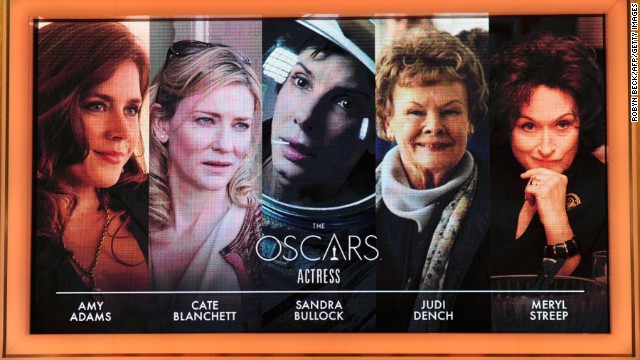 CNN Films' "And the Oscar Goes To ..." airs Thursday, February 27 at 9 p.m. ET The first Academy Awards ceremony was held in Los Angeles in May 1929, honoring films and performances from 1927 and 1928. Here is a look back at all of the best actress winners, listed by the year in which they received their Oscar. Douglas Fairbanks Sr. hands Janet Gaynor her best actress Oscar in 1929 for Gaynor's performance in the 1927 film ''Sunrise." It was the first best actress Oscar ever awarded. In 1930, there were actually two Oscar ceremonies. Actress Mary Pickford, seen here, receives her best actress Oscar in April 1930 for her performance in the 1929 film "Coquette." Norma Shearer receives a best actress Oscar in October 1930 for her role in "The Divorcee." Giving her the award is Conrad Nagel, who starred with her in the film released earlier that year. Marie Dressler and Lionel Barrymore collect their best actress and best actor Oscars in 1931. Dressler won for "Min and Bill" and Barrymore won for "A Free Soul." Film producer Louis B. Mayer presents the best actress Oscar to Helen Hayes for her role in "The Sin of Madelon Claudet." Douglas Fairbanks Jr. and Katharine Hepburn appear in the 1933 film "Morning Glory." Hepburn's performance earned her the best actress Oscar in 1934. There was no Academy Awards ceremony in 1933; films from that year and the last half of 1932 were eligible to win at the 1934 ceremony. Claudette Colbert won the best actress Oscar in 1935 for "It Happened One Night," a film that was the first to win all five of the major Academy Award categories -- best picture, best director, best actor, best actress and best screenplay. Bette Davis and film producer Jack L. Warner hold Davis' best actress Oscar at the ceremony held in 1936. Davis won her first Oscar for her role in the film "Dangerous." Luise Rainer, second from left, is seen at the 1937 ceremony with, from left, Louis B. Mayer, Louise Tracy and Frank Capra. Rainer won for "The Great Ziegfeld." For her performance in "The Good Earth," Luise Rainer won the best actress Oscar for the second consecutive year. Bette Davis won her second Oscar in 1939, this time for "Jezebel." Vivien Leigh accepts her Oscar in 1940 for her performance in "Gone With the Wind." Actors James Stewart and Ginger Rogers smile after winning Oscars in 1941. Stewart won best actor for his performance in "The Philadelphia Story," while Rogers won best actress for her performance in "Kitty Foyle: The Natural History of a Woman." Joan Fontaine looks at the best actress Oscar she won for her role in the film "Suspicion." After winning the best actress Oscar in 1943, Greer Garson gets a congratulatory kiss from her "Mrs. Miniver" co-star Walter Pidgeon. Jennifer Jones holds the best actress Oscar she won in 1944 for her performance in "Song of Bernadette." To her right is actress Ingrid Bergman. Ingrid Bergman didn't have to wait long to hold her own best actress award. Here, she poses with the Oscar she earned for her role in the film "Gaslight." Joan Crawford receives her Academy Award in bed because of an illness. She was recognized for her performance in the 1945 film "Mildred Pierce." Olivia de Havilland receives her best actress Oscar from actor Ray Milland for her performance in "To Each His Own." Loretta Young, second from left, won the best actress Oscar in 1948 for her role in "Farmer's Daughter." Jane Wyman stands by a doorway backstage at the Academy Awards. She won her best actress Oscar for the film "Johnny Belinda." Olivia de Havilland looks at her two best actress Oscars. She won her second in 1950 for her role in "The Heiress." Judy Holliday bursts into tears in 1951 after winning the best actress Oscar for her performance in "Born Yesterday." Vivien Leigh appears with Karl Malden in "A Streetcar Named Desire." Her performance in the film earned her a second Oscar. Shirley Booth wins the best actress Oscar for "Come Back, Little Sheba" in 1953. Audrey Hepburn is surrounded by reporters as she holds her best actress Oscar for "Roman Holiday." Grace Kelly poses with her Oscar after the Academy Awards ceremony in 1955. She won the statuette for her role in "The Country Girl." Anna Magnani enthusiastically holds the Oscar she won for "Rose Tattoo." The award was presented to her by U.S. Ambassador Clare Luce at the Villa Taverna in Rome. Ingrid Bergman, right, appears with Helen Hayes in a scene from the movie "Anastasia." Her performance earned her a second Oscar for best actress. Joanne Woodward smiles while holding her best actress Oscar (and a cigarette). She received the award for her role in the film "Three Faces of Eve." From left, actor Burl Ives, actress Susan Hayward and actor David Niven pose with their Oscars in 1959. Hayward won for her role in "I Want to Live!" Actress Simone Signoret, seen here next to actor Rock Hudson at the Academy Awards ceremony in 1960, won the best actress Oscar for her role in "Room at the Top." Elizabeth Taylor is seen with her Oscar after being named best actress for her part in "Butterfield 8." Sophia Loren reacts after winning best actress for the film "La Ciociara." Anne Bancroft cries in her New York apartment as she accepts a congratulatory phone call following her win for "The Miracle Worker." Patricia Neal and her three children look at her Oscar statuette, which she won in 1964 for her role in "Hud." Julie Andrews looks at the Academy Award she won for "Mary Poppins'" in 1965. The role was her film debut. Julie Christie is seen with her Academy Award, which she won for her role in "Darling." Elizabeth Taylor holds up her second Oscar, this one for the film "Who's Afraid of Virginia Woolf." Katharine Hepburn and Cecil Kellaway appear in a scene from "Guess Who's Coming to Dinner." Hepburn won her second Oscar more than 30 years after her first. Barbra Streisand gazes at the best actress statuette she won for "Funny Girl." There was a tie for the award in 1969, with the other winner being Katharine Hepburn. Katharine Hepburn and Peter O'Toole appear in "The Lion in Winter." The film earned Hepburn her third Oscar for best actress. Maggie Smith, who won for "The Prime of Miss Jean Brodie," celebrates with her husband at the time, Robert Stephens. Glenda Jackson won the best actress Oscar for her part in "Women In Love." Jane Fonda cradles the best actress Oscar she received for "Klute." Liza Minnelli holds the Oscar she won for "Cabaret." George Segal and Glenda Jackson appear in a scene from "A Touch of Class," which snagged Jackson the best actress Oscar in 1974. Ellen Burstyn, left, appears in "Alice Doesn't Live Here Anymore," which won her the best actress Oscar in 1975. From left, producer Saul Zaentz, actor Jack Nicholson, actress Louise Fletcher and producer Michael Douglas pose with their Oscars at the 1976 Academy Awards ceremony. They all won for the film "One Flew Over the Cuckoo's Nest," which swept the major categories that year. Faye Dunaway rests by the Beverly Hills Hotel swimming pool the morning after she received the best actress Oscar for "Network." Diane Keaton places her Oscar on a restaurant table after the Academy Awards ceremony in 1978. She received the award for her role in "Annie Hall." Jane Fonda is ecstatic about winning her second Academy Award, this one for "Coming Home." Sally Field accepts the best actress Oscar for her role in "Norma Rae." Sissy Spacek accepts the best actress Oscar for her role in the film "Coal Miner's Daughter." Henry Fonda and Katharine Hepburn appear in a scene from "On Golden Pond," which won Hepburn her fourth Oscar for best actress. Meryl Streep holds her best actress Oscar for "Sophie's Choice." Shirley MacLaine accepts her Oscar in 1984. She won for her performance in "Terms of Endearment." Sally Field holds the best actress Oscar in the press room at the Academy Awards. She won the award, her second, for her role in "Places in the Heart." Geraldine Page wins best actress for "The Trip to Bountiful." Hearing-impaired actress Marlee Matlin uses sign language while holding the Academy Award she won for "Children of a Lesser God." Cher wears that dress in 1988, when she won the Academy Award for "Moonstruck." Jodie Foster holds her Oscar in the press room after winning for her role in "The Accused." Jessica Tandy acknowledges applause after receiving the Oscar for her role in "Driving Miss Daisy." Kathy Bates, far left, clutches the best actress award for her role in "Misery." To her left are fellow Oscar winners Jeremy Irons, Whoopi Goldberg and Joe Pesci. Jodie Foster holds up her second Oscar, this one for her role in "The Silence of the Lambs." Emma Thompson poses with her Oscar after winning best actress for her role in "Howards End." Holly Hunter poses in the press room after being awarded the best actress Oscar for her performance in "The Piano." Jessica Lange holds the Oscar she won for her role in the film "Blue Sky." Susan Sarandon accepts the Oscar for her role in "Dead Man Walking." Frances McDormand, who won best actress for her role in "Fargo," poses with Geoffrey Rush, who won best actor that year. Helen Hunt holds her Oscar after winning for "As Good As It Gets." Gwyneth Paltrow cries as she receives the best actress Oscar for "Shakespeare in Love." Actor Roberto Benigni presents Hilary Swank, who won the best actress Oscar for the film "Boys Don't Cry." Julia Roberts holds her Oscar for her role in "Erin Brockovich." Halle Berry celebrates as she holds her Oscar for "Monster's Ball." Berry is the only African-American to win the Oscar for best actress. Nicole Kidman accepts her award for her role in "The Hours." Charlize Theron poses with her Oscar after winning for the film "Monster." Hilary Swank grabbed her second Academy Award in 2005 for the film "Million Dollar Baby." Reese Witherspoon kisses then-husband Ryan Phillippe before going on stage to accept the best actress award for "Walk the Line." Director Taylor Hackford kisses his wife, Helen Mirren, after Mirren won the best actress Oscar for her role in "The Queen." Marion Cotillard accepts the Oscar for her role in "La Vie en Rose." Kate Winslet reacts after winning the best actress Oscar for "The Reader." Best actress Sandra Bullock gives her acceptance speech after winning for "The Blind Side." Natalie Portman poses in the press room after winning the best actress Oscar for "Black Swan." Meryl Streep, right, laughs with Sandra Bullock after Streep's win for her role in "The Iron Lady." Jennifer Lawrence charms the audience in 2013 as she accepts the best actress Oscar for her performance in "Silver Linings Playbook." A history of Oscar-winning best actresses Janet Gaynor (1929) Mary Pickford (April 1930) Norma Shearer (October 1930) Marie Dressler (1931) Helen Hayes (1932) Katharine Hepburn (1934) Claudette Colbert (1935) Bette Davis (1936) Luise Rainer (1937) Luise Rainer (1938) Bette Davis (1939) Vivien Leigh (1940) Ginger Rogers (1941) Joan Fontaine (1942) Greer Garson (1943) Jennifer Jones (1944) Ingrid Bergman (1945) Joan Crawford (1946) Olivia de Havilland (1947) Loretta Young (1948) Jane Wyman (1949) Olivia de Havilland (1950) Judy Holliday (1951) Vivien Leigh (1952) Shirley Booth (1953) Audrey Hepburn (1954) Grace Kelly (1955) Anna Magnani (1956) Ingrid Bergman (1957) Joanne Woodward (1958) Susan Hayward (1959) Simone Signoret (1960) Elizabeth Taylor (1961) Sophia Loren (1962) Anne Bancroft (1963) Patricia Neal (1964) Julie Andrews (1965) Julie Christie (1966) Elizabeth Taylor (1967) Katharine Hepburn (1968) Barbra Streisand (1969) Katharine Hepburn (1969) Maggie Smith (1970) Glenda Jackson (1971) Jane Fonda (1972) Liza Minnelli (1973) Glenda Jackson (1974) Ellen Burstyn (1975) Louise Fletcher (1976) Faye Dunaway (1977) Diane Keaton (1978) Jane Fonda (1979) Sally Field (1980) Sissy Spacek (1981) Katharine Hepburn (1982) Meryl Streep (1983) Shirley MacLaine (1984) Sally Field (1985) Geraldine Page (1986) Marlee Matlin (1987) Cher (1988) Jodie Foster (1989) Jessica Tandy (1990) Kathy Bates (1991) Jodie Foster (1992) Emma Thompson (1993) Holly Hunter (1994) Jessica Lange (1995) Susan Sarandon (1996) Frances McDormand (1997) Helen Hunt (1998) Gwyneth Paltrow (1999) Hilary Swank (2000) Julia Roberts (2001) Halle Berry (2002) Nicole Kidman (2003) Charlize Theron (2004) Hilary Swank (2005) Reese Witherspoon (2006) Helen Mirren (2007) Marion Cotillard (2008) Kate Winslet (2009) Sandra Bullock (2010) Natalie Portman (2011) Meryl Streep (2012) Jennifer Lawrence (2013) HIDE CAPTION << <
CNN Films' "And the Oscar Goes To ..." airs Thursday, February 27 at 9 p.m. ET The first Academy Awards ceremony was held in Los Angeles in May 1929, honoring films and performances from 1927 and 1928. Here is a look back at all of the best actress winners, listed by the year in which they received their Oscar. Douglas Fairbanks Sr. hands Janet Gaynor her best actress Oscar in 1929 for Gaynor's performance in the 1927 film ''Sunrise." It was the first best actress Oscar ever awarded. In 1930, there were actually two Oscar ceremonies. Actress Mary Pickford, seen here, receives her best actress Oscar in April 1930 for her performance in the 1929 film "Coquette." Norma Shearer receives a best actress Oscar in October 1930 for her role in "The Divorcee." Giving her the award is Conrad Nagel, who starred with her in the film released earlier that year. Marie Dressler and Lionel Barrymore collect their best actress and best actor Oscars in 1931. Dressler won for "Min and Bill" and Barrymore won for "A Free Soul." Film producer Louis B. Mayer presents the best actress Oscar to Helen Hayes for her role in "The Sin of Madelon Claudet." Douglas Fairbanks Jr. and Katharine Hepburn appear in the 1933 film "Morning Glory." Hepburn's performance earned her the best actress Oscar in 1934. There was no Academy Awards ceremony in 1933; films from that year and the last half of 1932 were eligible to win at the 1934 ceremony. Claudette Colbert won the best actress Oscar in 1935 for "It Happened One Night," a film that was the first to win all five of the major Academy Award categories -- best picture, best director, best actor, best actress and best screenplay. Bette Davis and film producer Jack L. Warner hold Davis' best actress Oscar at the ceremony held in 1936. Davis won her first Oscar for her role in the film "Dangerous." Luise Rainer, second from left, is seen at the 1937 ceremony with, from left, Louis B. Mayer, Louise Tracy and Frank Capra. Rainer won for "The Great Ziegfeld." For her performance in "The Good Earth," Luise Rainer won the best actress Oscar for the second consecutive year. Bette Davis won her second Oscar in 1939, this time for "Jezebel." Vivien Leigh accepts her Oscar in 1940 for her performance in "Gone With the Wind." Actors James Stewart and Ginger Rogers smile after winning Oscars in 1941. Stewart won best actor for his performance in "The Philadelphia Story," while Rogers won best actress for her performance in "Kitty Foyle: The Natural History of a Woman." Joan Fontaine looks at the best actress Oscar she won for her role in the film "Suspicion." After winning the best actress Oscar in 1943, Greer Garson gets a congratulatory kiss from her "Mrs. Miniver" co-star Walter Pidgeon. Jennifer Jones holds the best actress Oscar she won in 1944 for her performance in "Song of Bernadette." To her right is actress Ingrid Bergman. Ingrid Bergman didn't have to wait long to hold her own best actress award. Here, she poses with the Oscar she earned for her role in the film "Gaslight." Joan Crawford receives her Academy Award in bed because of an illness. She was recognized for her performance in the 1945 film "Mildred Pierce." Olivia de Havilland receives her best actress Oscar from actor Ray Milland for her performance in "To Each His Own." Loretta Young, second from left, won the best actress Oscar in 1948 for her role in "Farmer's Daughter." Jane Wyman stands by a doorway backstage at the Academy Awards. She won her best actress Oscar for the film "Johnny Belinda." Olivia de Havilland looks at her two best actress Oscars. She won her second in 1950 for her role in "The Heiress." Judy Holliday bursts into tears in 1951 after winning the best actress Oscar for her performance in "Born Yesterday." Vivien Leigh appears with Karl Malden in "A Streetcar Named Desire." Her performance in the film earned her a second Oscar. Shirley Booth wins the best actress Oscar for "Come Back, Little Sheba" in 1953. Audrey Hepburn is surrounded by reporters as she holds her best actress Oscar for "Roman Holiday." Grace Kelly poses with her Oscar after the Academy Awards ceremony in 1955. She won the statuette for her role in "The Country Girl." Anna Magnani enthusiastically holds the Oscar she won for "Rose Tattoo." The award was presented to her by U.S. Ambassador Clare Luce at the Villa Taverna in Rome. Ingrid Bergman, right, appears with Helen Hayes in a scene from the movie "Anastasia." Her performance earned her a second Oscar for best actress. Joanne Woodward smiles while holding her best actress Oscar (and a cigarette). She received the award for her role in the film "Three Faces of Eve." From left, actor Burl Ives, actress Susan Hayward and actor David Niven pose with their Oscars in 1959. Hayward won for her role in "I Want to Live!" Actress Simone Signoret, seen here next to actor Rock Hudson at the Academy Awards ceremony in 1960, won the best actress Oscar for her role in "Room at the Top." Elizabeth Taylor is seen with her Oscar after being named best actress for her part in "Butterfield 8." Sophia Loren reacts after winning best actress for the film "La Ciociara." Anne Bancroft cries in her New York apartment as she accepts a congratulatory phone call following her win for "The Miracle Worker." Patricia Neal and her three children look at her Oscar statuette, which she won in 1964 for her role in "Hud." Julie Andrews looks at the Academy Award she won for "Mary Poppins'" in 1965. The role was her film debut. Julie Christie is seen with her Academy Award, which she won for her role in "Darling." Elizabeth Taylor holds up her second Oscar, this one for the film "Who's Afraid of Virginia Woolf." Katharine Hepburn and Cecil Kellaway appear in a scene from "Guess Who's Coming to Dinner." Hepburn won her second Oscar more than 30 years after her first. Barbra Streisand gazes at the best actress statuette she won for "Funny Girl." There was a tie for the award in 1969, with the other winner being Katharine Hepburn. Katharine Hepburn and Peter O'Toole appear in "The Lion in Winter." The film earned Hepburn her third Oscar for best actress. Maggie Smith, who won for "The Prime of Miss Jean Brodie," celebrates with her husband at the time, Robert Stephens. Glenda Jackson won the best actress Oscar for her part in "Women In Love." Jane Fonda cradles the best actress Oscar she received for "Klute." Liza Minnelli holds the Oscar she won for "Cabaret." George Segal and Glenda Jackson appear in a scene from "A Touch of Class," which snagged Jackson the best actress Oscar in 1974. Ellen Burstyn, left, appears in "Alice Doesn't Live Here Anymore," which won her the best actress Oscar in 1975. From left, producer Saul Zaentz, actor Jack Nicholson, actress Louise Fletcher and producer Michael Douglas pose with their Oscars at the 1976 Academy Awards ceremony. They all won for the film "One Flew Over the Cuckoo's Nest," which swept the major categories that year. Faye Dunaway rests by the Beverly Hills Hotel swimming pool the morning after she received the best actress Oscar for "Network." Diane Keaton places her Oscar on a restaurant table after the Academy Awards ceremony in 1978. She received the award for her role in "Annie Hall." Jane Fonda is ecstatic about winning her second Academy Award, this one for "Coming Home." Sally Field accepts the best actress Oscar for her role in "Norma Rae." Sissy Spacek accepts the best actress Oscar for her role in the film "Coal Miner's Daughter." Henry Fonda and Katharine Hepburn appear in a scene from "On Golden Pond," which won Hepburn her fourth Oscar for best actress. Meryl Streep holds her best actress Oscar for "Sophie's Choice." Shirley MacLaine accepts her Oscar in 1984. She won for her performance in "Terms of Endearment." Sally Field holds the best actress Oscar in the press room at the Academy Awards. She won the award, her second, for her role in "Places in the Heart." Geraldine Page wins best actress for "The Trip to Bountiful." Hearing-impaired actress Marlee Matlin uses sign language while holding the Academy Award she won for "Children of a Lesser God." Cher wears that dress in 1988, when she won the Academy Award for "Moonstruck." Jodie Foster holds her Oscar in the press room after winning for her role in "The Accused." Jessica Tandy acknowledges applause after receiving the Oscar for her role in "Driving Miss Daisy." Kathy Bates, far left, clutches the best actress award for her role in "Misery." To her left are fellow Oscar winners Jeremy Irons, Whoopi Goldberg and Joe Pesci. Jodie Foster holds up her second Oscar, this one for her role in "The Silence of the Lambs." Emma Thompson poses with her Oscar after winning best actress for her role in "Howards End." Holly Hunter poses in the press room after being awarded the best actress Oscar for her performance in "The Piano." Jessica Lange holds the Oscar she won for her role in the film "Blue Sky." Susan Sarandon accepts the Oscar for her role in "Dead Man Walking." Frances McDormand, who won best actress for her role in "Fargo," poses with Geoffrey Rush, who won best actor that year. Helen Hunt holds her Oscar after winning for "As Good As It Gets." Gwyneth Paltrow cries as she receives the best actress Oscar for "Shakespeare in Love." Actor Roberto Benigni presents Hilary Swank, who won the best actress Oscar for the film "Boys Don't Cry." Julia Roberts holds her Oscar for her role in "Erin Brockovich." Halle Berry celebrates as she holds her Oscar for "Monster's Ball." Berry is the only African-American to win the Oscar for best actress. Nicole Kidman accepts her award for her role in "The Hours." Charlize Theron poses with her Oscar after winning for the film "Monster." Hilary Swank grabbed her second Academy Award in 2005 for the film "Million Dollar Baby." Reese Witherspoon kisses then-husband Ryan Phillippe before going on stage to accept the best actress award for "Walk the Line." Director Taylor Hackford kisses his wife, Helen Mirren, after Mirren won the best actress Oscar for her role in "The Queen." Marion Cotillard accepts the Oscar for her role in "La Vie en Rose." Kate Winslet reacts after winning the best actress Oscar for "The Reader." Best actress Sandra Bullock gives her acceptance speech after winning for "The Blind Side." Natalie Portman poses in the press room after winning the best actress Oscar for "Black Swan." Meryl Streep, right, laughs with Sandra Bullock after Streep's win for her role in "The Iron Lady." Jennifer Lawrence charms the audience in 2013 as she accepts the best actress Oscar for her performance in "Silver Linings Playbook." A history of Oscar-winning best actresses Janet Gaynor (1929) Mary Pickford (April 1930) Norma Shearer (October 1930) Marie Dressler (1931) Helen Hayes (1932) Katharine Hepburn (1934) Claudette Colbert (1935) Bette Davis (1936) Luise Rainer (1937) Luise Rainer (1938) Bette Davis (1939) Vivien Leigh (1940) Ginger Rogers (1941) Joan Fontaine (1942) Greer Garson (1943) Jennifer Jones (1944) Ingrid Bergman (1945) Joan Crawford (1946) Olivia de Havilland (1947) Loretta Young (1948) Jane Wyman (1949) Olivia de Havilland (1950) Judy Holliday (1951) Vivien Leigh (1952) Shirley Booth (1953) Audrey Hepburn (1954) Grace Kelly (1955) Anna Magnani (1956) Ingrid Bergman (1957) Joanne Woodward (1958) Susan Hayward (1959) Simone Signoret (1960) Elizabeth Taylor (1961) Sophia Loren (1962) Anne Bancroft (1963) Patricia Neal (1964) Julie Andrews (1965) Julie Christie (1966) Elizabeth Taylor (1967) Katharine Hepburn (1968) Barbra Streisand (1969) Katharine Hepburn (1969) Maggie Smith (1970) Glenda Jackson (1971) Jane Fonda (1972) Liza Minnelli (1973) Glenda Jackson (1974) Ellen Burstyn (1975) Louise Fletcher (1976) Faye Dunaway (1977) Diane Keaton (1978) Jane Fonda (1979) Sally Field (1980) Sissy Spacek (1981) Katharine Hepburn (1982) Meryl Streep (1983) Shirley MacLaine (1984) Sally Field (1985) Geraldine Page (1986) Marlee Matlin (1987) Cher (1988) Jodie Foster (1989) Jessica Tandy (1990) Kathy Bates (1991) Jodie Foster (1992) Emma Thompson (1993) Holly Hunter (1994) Jessica Lange (1995) Susan Sarandon (1996) Frances McDormand (1997) Helen Hunt (1998) Gwyneth Paltrow (1999) Hilary Swank (2000) Julia Roberts (2001) Halle Berry (2002) Nicole Kidman (2003) Charlize Theron (2004) Hilary Swank (2005) Reese Witherspoon (2006) Helen Mirren (2007) Marion Cotillard (2008) Kate Winslet (2009) Sandra Bullock (2010) Natalie Portman (2011) Meryl Streep (2012) Jennifer Lawrence (2013) HIDE CAPTION << <  1
1  2
2  3
3  4
4  5
5  6
6  7
7  8
8  9
9  10
10  11
11  12
12  13
13  14
14  15
15  16
16  17
17  18
18  19
19  20
20  21
21  22
22  23
23  24
24  25
25  26
26  27
27  28
28  29
29  30
30  31
31  32
32  33
33  34
34  35
35  36
36  37
37  38
38  39
39  40
40  41
41  42
42  43
43  44
44  45
45  46
46  47
47  48
48  49
49  50
50  51
51  52
52  53
53  54
54  55
55  56
56  57
57  58
58  59
59  60
60  61
61  62
62  63
63  64
64  65
65  66
66  67
67  68
68  69
69  70
70  71
71  72
72  73
73  74
74  75
75  76
76  77
77  78
78  79
79  80
80  81
81  82
82  83
83  84
84  85
85  86
86  87 > >>
87 > >>  A history of Oscar-winning best actresses .cnnArticleGalleryNav{border:1px solid #000;cursor:pointer;float:left;height:25px;text-align:center;width:25px} .cnnArticleGalleryNavOn{background-color:#C03;border:1px solid #000;float:left;height:25px;text-align:center;width:20px} .cnnArticleGalleryNavDisabled{background-color:#222;border:1px solid #000;color:#666;float:left;height:25px;text-align:center;width:25px} .cnnArticleExpandableTarget{background-color:#000;display:none;position:absolute} .cnnArticlePhotoContainer{height:122px;width:214px} .cnnArticleBoxImage{cursor:pointer;height:122px;padding-top:0;width:214px} .cnnArticleGalleryCaptionControl{background-color:#000;color:#FFF} .cnnArticleGalleryCaptionControlText{cursor:pointer;float:right;font-size:10px;padding:3px 10px 3px 3px} .cnnArticleGalleryPhotoContainer cite{background:none repeat scroll 0 0 #000;bottom:48px;color:#FFF;height:auto;left:420px;opacity:.7;position:absolute;width:200px;padding:10px} .cnnArticleGalleryClose{background-color:#fff;display:block;text-align:right} .cnnArticleGalleryCloseButton{cursor:pointer} .cnnArticleGalleryNavPrevNext span{background-color:#444;color:#CCC;cursor:pointer;float:left;height:23px;text-align:center;width:26px;padding:4px 0 0} .cnnArticleGalleryNavPrevNextDisabled span{background-color:#444;color:#666;float:left;height:23px;text-align:center;width:25px;padding:4px 0 0} .cnnVerticalGalleryPhoto{padding-right:68px;width:270px;margin:0 auto} .cnnGalleryContainer{float:left;clear:left;margin:0 0 20px;padding:0 0 0 10px}
A history of Oscar-winning best actresses .cnnArticleGalleryNav{border:1px solid #000;cursor:pointer;float:left;height:25px;text-align:center;width:25px} .cnnArticleGalleryNavOn{background-color:#C03;border:1px solid #000;float:left;height:25px;text-align:center;width:20px} .cnnArticleGalleryNavDisabled{background-color:#222;border:1px solid #000;color:#666;float:left;height:25px;text-align:center;width:25px} .cnnArticleExpandableTarget{background-color:#000;display:none;position:absolute} .cnnArticlePhotoContainer{height:122px;width:214px} .cnnArticleBoxImage{cursor:pointer;height:122px;padding-top:0;width:214px} .cnnArticleGalleryCaptionControl{background-color:#000;color:#FFF} .cnnArticleGalleryCaptionControlText{cursor:pointer;float:right;font-size:10px;padding:3px 10px 3px 3px} .cnnArticleGalleryPhotoContainer cite{background:none repeat scroll 0 0 #000;bottom:48px;color:#FFF;height:auto;left:420px;opacity:.7;position:absolute;width:200px;padding:10px} .cnnArticleGalleryClose{background-color:#fff;display:block;text-align:right} .cnnArticleGalleryCloseButton{cursor:pointer} .cnnArticleGalleryNavPrevNext span{background-color:#444;color:#CCC;cursor:pointer;float:left;height:23px;text-align:center;width:26px;padding:4px 0 0} .cnnArticleGalleryNavPrevNextDisabled span{background-color:#444;color:#666;float:left;height:23px;text-align:center;width:25px;padding:4px 0 0} .cnnVerticalGalleryPhoto{padding-right:68px;width:270px;margin:0 auto} .cnnGalleryContainer{float:left;clear:left;margin:0 0 20px;padding:0 0 0 10px} 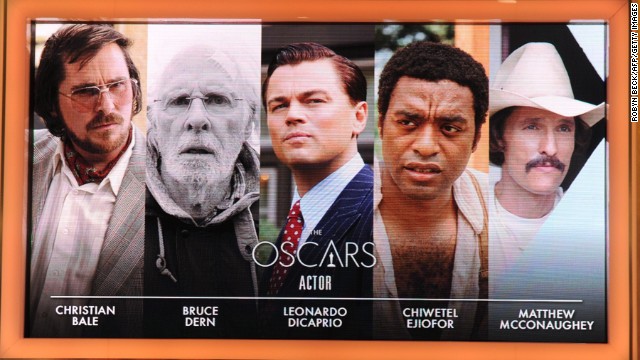 CNN Films' "And the Oscar Goes To ..." airs Thursday, February 27 at 9 p.m. ET Superstars, a newcomer and a Hollywood veteran are competing for best actor honors at the 86th annual Academy Awards in March. Find out which legends took home Oscars in the past -- from German actor Emil Jannings at the first awards ceremony in 1929 to three-time winner Daniel Day-Lewis at the 2013 event: The first best actor Oscar went to Emil Jannings at the academy's inaugural ceremony held in 1929. Jannings received the honors for two films: 1927's "The Way of All Flesh" and 1928's "The Last Command." Warner Baxter, right, earned the best actor Oscar for his role as the Cisco Kid in "In Old Arizona" (1929). Baxter appears here with best actress winner Mary Pickford at the April 1930 awards ceremony, which recognized films made between August 1, 1928, and July 31, 1929. Baxter loved the role so much he reprised it twice more, in "The Cisco Kid" (1931) and again in "The Return of the Cisco Kid" (1939). George Arliss won the best actor Oscar for "Disraeli," apparently also beating himself since he was nominated for that film and "The Green Goddess." In the early years of the Oscar, a single nomination could recognize more than one role. However, for reasons not entirely clear, the actor won solely for "Disraeli." Perhaps it was a glitch on behalf of the academy, or perhaps voters truly preferred his portrayal as the famed British prime minister. The November 1930 awards ceremony recognized work from 1929 and 1930. Lionel Barrymore, here with "Min and Bill" best actress winner Marie Dressler, won the best actor Oscar for his work in "A Free Soul." Barrymore played an alcoholic lawyer whose daughter gets involved with a mobster he helped go free. The previous year's Oscar winner Lionel Barrymore, left, presents Wallace Beery, right, with the best actor Oscar for "The Champ." Beery tied that year with Fredric March in "Dr. Jekyll and Mr. Hyde." Fredric March, right, was honored the same year as Wallace Beery for "Dr. Jekyll and Mr. Hyde." Beery actually received one less vote than March, which it resulted in a tie winner according to academy rules of the day. British actor Charles Laughton won the best actor Oscar for the title role "The Private Life of Henry VIII" (1933), beating out Leslie Howard in "Berkeley Square" (1933) and Paul Muni in "I Am a Fugitive From a Chain Gang" (1932). The sixth awards ceremony was held in March 1934 and recognized movies released from August 1, 1932, to December 31, 1933. Clark Gable's status as a Hollywood icon was cemented when the box-office star won the best actor Oscar for Frank Capra's "It Happened One Night" (1934). The screwball comedy was a massive hit with academy voters at the February 1935 ceremony, sweeping the five big categories -- best picture, best director (Capra), best adapted screenplay and best actress (Claudette Colbert). Victor McLaglen, left, beat out two earlier Oscar winners to claim the best actor prize for "The Informer." He was up against Charles Laughton and Clark Gable, both nominated for their roles in best picture winner "Mutiny on the Bounty." McLaglen appears with best actress winner Bette Davis and filmmaker D.W. Griffith of "The Birth of a Nation" fame at the March 1936 ceremony. After two earlier best actor nominations, Paul Muni finally won for the title role in "The Story of Louis Pasteur," the first of several biographical films he made at Warner Bros. Spencer Tracy, left, with co-star Freddie Bartholomew, won his first best actor Oscar as a Portuguese fisherman in "Captains Courageous." He beat out Oscar-winning actors Fredric March in "A Star Is Born" and Paul Muni in "The Life of Emile Zola." It was Tracy's second nomination. Spencer Tracy takes home his second best actor Oscar for "Boys Town." He appears here with Bette Davis, best actress for "Jezebel," at the ceremony held in 1939. Robert Donat's Oscar win for "Goodbye, Mr. Chips" was definitely a surprise. Donat earned the honors for his title role as a schoolteacher, beating out some strong performances, including Clark Gable in "Gone With the Wind," James Stewart in "Mr. Smith Goes to Washington" and Laurence Olivier in "Wuthering Heights." After losing the Oscar a year earlier for his iconic role in "Mr. Smith Goes to Washington," James Stewart received the award playing a reporter who falls for Katharine Hepburn in "The Philadelphia Story." Stewart and best actress winner Ginger Rogers celebrate their wins at the ceremony held in 1941. James Stewart, right, bestows pal Gary Cooper with the statuette for "Sergeant York." Cooper nabbed the win over Orson Welles, whose "Citizen Kane" also lost out on the best picture award but has become the epitome of a Hollywood classic. Gary Cooper, right, congratulates James Cagney for his best actor win in "Yankee Doodle Dandy" at the Oscar ceremony held in 1943. Cooper, also a nominee for "The Pride of the Yankees," didn't seem to hold a grudge against Cagney. Character actor Paul Lukas faced stiff competition from stars Humphrey Bogart ("Casablanca") and Gary Cooper ("For Whom the Bell Tolls"), but he was able to take home the Oscar for "Watch on the Rhine." Lukas and best actress winner Jennifer Jones celebrate at the ceremony held in 1944. Bing Crosby, right, and co-star Barry Fitzgerald find a reason to celebrate after the 1945 awards ceremony. They won the best actor and best supporting actor awards, respectively, for "Going My Way." Ray Milland had a prolific career for decades -- including a standout role in Alfred Hitchcock's "Dial M for Murder" -- but he received only one Oscar nomination. Luckily, he made it count, winning the best actor prize for his role as an alcoholic writer in "The Lost Weekend." Ingrid Bergman presents Milland with the prize at the 1946 ceremony. Fredric March, right, Dana Andrews, center, and Harold Russell struck a chord with postwar audiences as servicemen returning home in "The Best Years of Our Lives." March picked up his second Oscar for the role. Ronald Colman, far right, a star since the silent days, picked up the best actor Oscar as a jealous actor in "A Double Life." Coleman appears with the year's other winners at the 1948 ceremony -- from left, Darryl Zanuck, producer of best picture "Gentleman's Agreement," best actress Loretta Young, best supporting actor Edmund Gwenn and best supporting actress Celeste Holm. Laurence Olivier's commitment to bringing Shakespeare's "Hamlet" to the screen paid off handsomely at the Oscars. Olivier walked away with the best actor Oscar in the title role, and "Hamlet" also won for best picture. Here Olivier appears with best actress winner Jane Wyman in 1949. Broderick Crawford, second from left, pushed past Kirk Douglas, Gregory Peck, Richard Todd and John Wayne to win the best actor Oscar with "All the King's Men." Crawford appears with best supporting actress winner Mercedes McCambridge, far left, best actress winner Olivia de Havilland and best supporting actor winner Dean Jagger at the 1950 ceremony. Puerto Rican-born José Ferrer became the first Hispanic to win an Oscar when he was named best actor for "Cyrano de Bergerac." Here he appears with Gloria Swanson, left, and Judy Holliday (best actress for "Born Yesterday") in 1951. Claire Trevor can't resist giving Humphrey Bogart a kiss backstage at the 1952 Oscars ceremony after he won the best actor award for "The African Queen." Bogart beat out Marlon Brando in "A Streetcar Named Desire," Fredric March in "Death of a Salesman" and Montgomery Clift in "A Place in the Sun." Gary Cooper won his second best actor award for the classic Western "High Noon" with Grace Kelly. Among Cooper's competitors were Kirk Douglas in "The Bad and the Beautiful," José Ferrer in "Moulin Rouge," Alec Guinness in "The Lavender Hill Mob" and Marlon Brando in "Viva Zapata!" William Holden celebrates his best actor win for "Stalag 17" with best supporting actress winner Donna Reed at the Oscar ceremony in 1954. It was the actor's second nomination; his first was for Billy Wilder's 1950 classic "Sunset Boulevard." Oscars host Bob Hope, right, might have tried, but there was no way Marlon Brando was parting with his best actor award at the 1955 ceremony. Brando had lost three years in a row before then, but the actor's luck finally changed with "On the Waterfront." Ernest Borgnine faced heavy competition for best actor, beating out James Dean ("East of Eden"), Frank Sinatra ("The Man With the Golden Arm"), James Cagney ("Love Me or Leave Me") and Spencer Tracy ("Bad Day at Black Rock"). Backstage at the 1956 ceremony, Borgnine holds the Oscar for his portrayal of a lonely butcher in "Marty." Yul Brynner repeated his stage success as the King of Siam, winning the best actor Oscar for "The King and I." He's pictured at the 1957 ceremony. British actor Alec Guinness will always be known to "Star Wars" fans as Obi-Wan Kenobi, but he had an illustrious career on stage and screen long before the George Lucas blockbuster. After losing an earlier Oscar nomination, he finally won the best actor award as a World War II British officer in "The Bridge on the River Kwai." David Niven, right, joins fellow Oscar winners Burl Ives and Susan Hayward at the 1959 ceremony after winning the best actor award for "Separate Tables." The actor fought off competition from Tony Curtis and Sidney Poitier, both up for "The Defiant Ones"; Paul Newman in "Cat on a Hot Tin Roof"; and Spencer Tracy in "The Old Man and the Sea." Charlton Heston helped "Ben-Hur" to win a record 11 Academy Awards, shutting out Jack Lemmon, James Stewart, Paul Muni and Laurence Harvey as best actor. Heston appears with French actress Simone Signoret (best actress for "Room at the Top") at the 1960 ceremony. Burt Lancaster was a winner two times over at the 1961 Oscar ceremony. He won the best actor prize for the title role in "Elmer Gantry," and he had glamorous Elizabeth Taylor, best actress winner for "Butterfield 8," by his side backstage. Maximilian Schell won the best actor Oscar over his "Judgment at Nuremberg" co-star Spencer Tracy. Schell had previously portrayed the character of German lawyer Hans Rolfe in a television version of "Judgment." Gregory Peck's performance as lawyer Atticus Finch in the film of Harper Lee's novel, "To Kill a Mockingbird," was a standout to academy voters. He beat out some stiff competition for best actor: Peter O'Toole for "Lawrence of Arabia" and Burt Lancaster for "Birdman of Alcatraz." Here Peck and his wife, Veronique, attend an Oscar after-party in 1963. Sidney Poitier became the first African-American to win the best actor Oscar -- for his work in "Lilies of the Field." Poitier had been nominated once before for "The Defiant Ones." Interestingly, Poitier was the only one of the four acting category winners present at the 1964 ceremony. Who didn't fall in love with "My Fair Lady"? The academy sure did. Rex Harrison took the best actor prize for his role as Henry Higgins at the 1965 ceremony, and the musical won best picture honors, among others. But Audrey Hepburn's performance has Eliza Doolittle wasn't even nominated -- the Oscar went to Julie Andrews for "Mary Poppins." Lee Marvin won the Oscar for his comic role in "Cat Ballou" over dramatic heavyweights such as Laurence Olivier in "Othello," Richard Burton in "The Spy Who Came in From the Cold," Rod Steiger in "The Pawnbroker" and Oskar Werner in "Ship of Fools." Here, Marvin appears with then-girlfriend Michelle Triola in 1966. Paul Scofield also was up against some heavyweight actors, particularly Richard Burton in "Who's Afraid of Virginia Woolf?" But Scofield, here with Susannah York, won for his work as Thomas More in the period drama "A Man for All Seasons." Sidney Poitier may have been the star of the detective drama "In the Heat of the Night," but he was snubbed in the Oscars race. It wasn't that academy voters didn't love the movie though: "In the Heat of the Night" won best picture as well as best actor for Poitier's co-star, Rod Steiger, here holding his Oscar at the 1968 ceremony. Cliff Robertson's portrayal of a mentally challenged man in the drama "Charly" was enough to bowl over competition such as Peter O'Toole and Alan Arkin. The best actor category was fierce the year John Wayne won the gold for "True Grit." In only his second nomination, the Hollywood legend beat out newcomers Dustin Hoffman and Jon Voight in "Midnight Cowboy" as well as Richard Burton in "Anne of the Thousand Days" and Peter O'Toole in "Goodbye, Mr. Chips." Barbra Streisand congratulates Wayne at the 1970 ceremony. "Patton" features one of the most readily recognizable images in films -- that of George C. Scott's general standing in front of the American flag -- and it was as critically acclaimed as it was popular. But while "Patton" nabbed the best picture title and a best actor Oscar for Scott, the actor was having none of it. He refused to accept the prize, calling the politics surrounding the ceremony "demeaning" and likening the Oscars to a "two-hour meat parade." Everyone wanted in on "The French Connection," and star Gene Hackman was rewarded handsomely with the best actor award at the 1972 ceremony. An Oscar is an honor most stars would never refuse, but Marlon Brando did when the academy bestowed him with the best actor prize for "The Godfather" at the 1973 ceremony. Brando, who had won the award once before, said he was protesting the portrayal of Native Americans on TV and in film. The academy loved to nominate Jack Lemmon, but it wasn't always so quick to give him the prize. The star's luck changed when "Save the Tiger" earned him a best actor Oscar. For Art Carney, there were two phrases that helped him secure the best actor Oscar for "Harry and Tonto." "Do it! You are old," words of wisdom that came from his agent. After losing out four times as an Oscar nominee, Jack Nicholson triumphantly claimed his prize for "One Flew Over the Cuckoo's Nest." "Network's" Peter Finch faced some tough competition for the best actor award. He was up against Robert De Niro in "Taxi Driver" and Sylvester Stallone in best picture winner "Rocky" as well as his "Network" co-star, William Holden. Finch died two months before the March 1977 ceremony and became the first actor to win an Oscar posthumously. John Travolta in "Saturday Night Fever" and Woody Allen in "Annie Hall" have become prime examples of characters in '70s films, but Richard Dreyfuss' performance as a struggling actor in "The Goodbye Girl" stood out the most to academy voters at the time. Here the actor accepts his prize at the 1978 ceremony. Jon Voight had been nominated for a best actor Oscar once before for 1969's "Midnight Cowboy," but it was the Vietnam War drama "Coming Home" that finally earned him the honors. Like Jack Nicholson before him, Dustin Hoffman was forever the bridesmaid and never the bride. But after losing for "Midnight Cowboy," "The Graduate" and "Lenny," Hoffman got to accept the award at the 1980 ceremony, thanks to his work in best picture winner "Kramer vs. Kramer." Robert De Niro faced movie greats such as Peter O'Toole and Jack Lemmon in the best actor category. De Niro had already won the best supporting actor Oscar for "The Godfather: Part II," and academy voters couldn't help but hand him the best actor prize for "Raging Bull" -- especially since he gained nearly 60 pounds to play Jake LaMotta as an aging boxer. After being a movie legend for more than 40 years, Henry Fonda won his first competitive Oscar for "On Golden Pond." His co-star, Katharine Hepburn, also shined in the movie as his wife, picking up her fourth best actress prize. Ben Kingsley's portrayal in "Gandhi" was the performance to beat in that year's best actor Oscar race, and neither Dustin Hoffman in "Tootsie" nor Paul Newman in "The Verdict" could compete. Robert Duvall won the best actor prize for his performance as a country singer in "Tender Mercies." F. Murray Abraham's performance as Salieri in "Amadeus" rocked academy voters, who named him best actor. "Out of Africa" dominated the Oscars at the 1986 ceremony, but William Hurt picked up the best actor award for his portrayal of a gay imprisoned man in "Kiss of the Spider Woman." Paul Newman's performance in "The Color of Money" struck Oscar gold. It was the actor's first competitive Oscar win, but he wasn't there to accept it -- he'd joked that, after showing up and losing six other times, he might finally nab the prize if he stayed away. Gordon Gekko's creed of greed was very, very good to Michael Douglas. The star -- and son of another frequent Oscar nominee, Kirk Douglas -- earned his first Oscar nomination and first win for best actor for his role as the ruthless corporate raider in "Wall Street." Here Douglas appears with Marlee Matlin at the 1988 ceremony. Awards came pouring in for "Rain Man" with Dustin Hoffman, left, as an autistic savant and Tom Cruise as his younger brother. Hoffman picked up his second best actor Oscar and received congratulations from Cruise at the 1989 ceremony. Cruise wasn't even nominated, but he was probably just fine with starring in the best picture winner. Before Daniel Day-Lewis became so revered he could strike fear in the hearts of Oscar competitors, the British performer proved his mettle with the biopic "My Left Foot," earning his first best actor Oscar. It was no easy task: Day-Lewis was up against Morgan Freeman in "Driving Miss Daisy," Kenneth Branagh in "Henry V," Tom Cruise in "Born on the Fourth of July" and Robin Williams in "Dead Poets Society." We suppose the academy couldn't justify giving Kevin Costner the best director, best picture and the best actor prize for "Dances With Wolves," so Jeremy Irons took home the statuette for best actor for his role as Claus von Bülow in "Reversal of Fortune." Anthony Hopkins absolutely killed as Hannibal Lecter in "The Silence of the Lambs," so it wasn't surprising that he secured the best actor Oscar for the role. Before "Scent of a Woman," Al Pacino had been nominated for best actor four times and best supporting actor twice without winning. But the star's moment to accept the best actor Oscar finally came at the 1993 ceremony. Pacino may have won for "Scent of a Woman," but he also lost that year in the best supporting actor category for "Glengarry Glen Ross." Little did anyone know that when Tom Hanks won the best actor Oscar for the legal drama "Philadelphia" he'd be back at the Oscars very soon, and in a very different role. Tom Hanks proved his versatility when he won the best actor Oscar for the second year in a row. His prize this time was for his performance as the mentally challenged but indefatigable "Forrest Gump." Nicolas Cage may now be the butt of Internet jokes -- surely you've seen him swing from a "Wrecking Ball"? -- but he was the man to beat at the 1996 Oscar ceremony. Cage won the best actor prize for "Leaving Las Vegas," his first nomination and first win. Some actors languish as nominees for years before winning an Oscar, but Geoffrey Rush won the best actor prize on his first try with "Shine." By now, everyone knew what a powerhouse Jack Nicholson was, but he reminded moviegoers again with "As Good as It Gets," picking up yet another best actor Oscar. Italian actor Roberto Benigni was unknown to American audiences before "Life Is Beautiful," but he stole the show at the 1999 Oscars ceremony. The academy gave him the best actor Oscar for "Life Is Beautiful," which also won the prize for best foreign-language film. "American Beauty" was a cynical look at American middle class life with a new century arriving. Star Kevin Spacey received the best actor award for his portrayal of a middle-aged man who lusts after his teenage daughter's friend. The film also won best picture, director (Sam Mendes) and original screenplay (Alan Ball). The academy fawned over Russell Crowe's "Gladiator," a sword and sandals epic that picked up honors for best picture, best costume design, best sound, best visual effects and best actor -- the first win for the Australian Crowe. Denzel Washington has a reputation as a nice guy in Hollywood, so his transformation into the monstrous detective Alonzo in "Training Day" was incredible to watch. After already winning a best supporting actor statuette for "Glory," Washington took home the best actor award for "Training Day," making him the first African-American to win both. Adrien Brody appeared so thrilled when he won best actor award for "The Pianist" he even got Oscar presenter Halle Berry caught up in the moment with a passionate kiss at the 2003 ceremony. "I bet they didn't tell you that was in the gift bag," he joked when he finished. It was his first nomination and win. The Oscar race for best actor was a tough one when Sean Penn faced off with Jude Law for "Cold Mountain" and Bill Murray for "Lost in Translation," among others. In the end, it was Penn's work in "Mystic River" that earned him his first Academy Award. Before "Ray," Jamie Foxx was known primarily as a comedian -- the kind who would star in a popcorn flick like "Booty Call." But after his portrayal of singer Ray Charles in a musical biography, people realized he had been underestimated as an actor. The academy started paying attention, too, and gave Foxx two nominations for the 2005 ceremony: one for best actor for "Ray" and another for best supporting actor for "Collateral." He didn't win in the best supporting category, but we bet he's been able to live with that loss. Philip Seymour Hoffman's portrayal of writer Truman Capote in "Capote" was the kind of rock-solid immersion audiences had come to expect from the actor. He got his due with the best actor award -- his only Oscar. Until "The Last King of Scotland," Forest Whitaker had been completely overlooked by the academy. But after he turned in a masterful portrayal of Ugandan dictator Idi Amin, academy voters handed him the Oscar. If Daniel Day-Lewis is in the running, chances are there will be an award for him. The actor won his second best actor Oscar for "There Will Be Blood." He receives the award from Helen Mirren at the 2008 ceremony. Sean Penn, here with best actress Kate Winslet, left, and best supporting actress Penelope Cruz, gave the performance of a lifetime as openly gay politician and activist Harvey Milk in "Milk." The academy rewarded Penn with his second best actor Oscar at the 2009 ceremony. Jeff Bridges was understandably ecstatic when he won the best actor Oscar for "Crazy Heart." Bridges had been nominated four times before, and, with competition from George Clooney in "Up in the Air" and Jeremy Renner in "The Hurt Locker," his wasn't an obvious win. So when his name was called at the 2010 ceremony, Bridges relished the moment in his acceptance speech: "Thank you, mom and dad, for turning me on to such a groovy profession," he said. Colin Firth's portrayal of King George VI's fight to overcome a speech impediment beat out Jesse Eisenberg ("The Social Network") and James Franco ("127 Hours"), among others, to win the best actor Oscar. "The Artist," a silent, black-and-white movie, was a celebration of old-school film. Its star, French actor Jean Dujardin, seemed to have a virtual lock on the best actor Oscar, even though he was competing against the likes of George Clooney and Brad Pitt. When awards night arrived in 2012, Dujardin walked away with the prize. Once again, the Oscar race for best actor was jam-packed with amazing performances, from Bradley Cooper in "Silver Linings Playbook" to Denzel Washington in "Flight." But Daniel Day-Lewis completely transformed himself into the 16th U.S. president for Steven Spielberg's "Lincoln," and he walked away with the honors at the 2013 ceremony, becoming the first three-time best actor winner. A history of Oscar-winning best actors Emil Jannings (1929) Warner Baxter (1930) George Arliss (1930) Lionel Barrymore (1931) Wallace Beery (1932) Fredric March (1932) Charles Laughton (1934) Clark Gable (1935) Victor McLaglen (1936) Paul Muni (1937) Spencer Tracy (1938) Spencer Tracy (1939) Robert Donat (1940) James Stewart (1941) Gary Cooper (1942) James Cagney (1943) Paul Lukas (1944) Bing Crosby (1945) Ray Milland (1946) Fredric March (1947) Ronald Colman (1948) Laurence Olivier (1949) Broderick Crawford (1950) José Ferrer (1951) Humphrey Bogart (1952) Gary Cooper (1953) William Holden (1954) Marlon Brando (1955) Ernest Borgnine (1956) Yul Brynner (1957) Alec Guinness (1958) David Niven (1959) Charlton Heston (1960) Burt Lancaster (1961) Maximilian Schell (1962) Gregory Peck (1963) Sidney Poitier (1964) Rex Harrison (1965) Lee Marvin (1966) Paul Scofield (1967) Rod Steiger (1968) Cliff Robertson (1969) John Wayne (1970) George C. Scott (1971) Gene Hackman (1972) Marlon Brando (1973) Jack Lemmon (1974) Art Carney (1975) Jack Nicholson (1976) Peter Finch (1977) Richard Dreyfuss (1978) Jon Voight (1979) Dustin Hoffman (1980) Robert De Niro (1981) Henry Fonda (1982) Ben Kingsley (1983) Robert Duvall (1984) F. Murray Abraham (1985) William Hurt (1986) Paul Newman (1987) Michael Douglas (1988) Dustin Hoffman (1989) Daniel Day-Lewis (1990) Jeremy Irons (1991) Anthony Hopkins (1992) Al Pacino (1993) Tom Hanks (1994) Tom Hanks (1995) Nicolas Cage (1996) Geoffrey Rush (1997) Jack Nicholson (1998) Roberto Benigni (1999) Kevin Spacey (2000) Russell Crowe (2001) Denzel Washington (2002) Adrien Brody (2003) Sean Penn (2004) Jamie Foxx (2005) Philip Seymour Hoffman (2006) Forest Whitaker (2007) Daniel Day-Lewis (2008) Sean Penn (2009) Jeff Bridges (2010) Colin Firth (2011) Jean Dujardin (2012) Daniel Day-Lewis (2013) HIDE CAPTION << <
CNN Films' "And the Oscar Goes To ..." airs Thursday, February 27 at 9 p.m. ET Superstars, a newcomer and a Hollywood veteran are competing for best actor honors at the 86th annual Academy Awards in March. Find out which legends took home Oscars in the past -- from German actor Emil Jannings at the first awards ceremony in 1929 to three-time winner Daniel Day-Lewis at the 2013 event: The first best actor Oscar went to Emil Jannings at the academy's inaugural ceremony held in 1929. Jannings received the honors for two films: 1927's "The Way of All Flesh" and 1928's "The Last Command." Warner Baxter, right, earned the best actor Oscar for his role as the Cisco Kid in "In Old Arizona" (1929). Baxter appears here with best actress winner Mary Pickford at the April 1930 awards ceremony, which recognized films made between August 1, 1928, and July 31, 1929. Baxter loved the role so much he reprised it twice more, in "The Cisco Kid" (1931) and again in "The Return of the Cisco Kid" (1939). George Arliss won the best actor Oscar for "Disraeli," apparently also beating himself since he was nominated for that film and "The Green Goddess." In the early years of the Oscar, a single nomination could recognize more than one role. However, for reasons not entirely clear, the actor won solely for "Disraeli." Perhaps it was a glitch on behalf of the academy, or perhaps voters truly preferred his portrayal as the famed British prime minister. The November 1930 awards ceremony recognized work from 1929 and 1930. Lionel Barrymore, here with "Min and Bill" best actress winner Marie Dressler, won the best actor Oscar for his work in "A Free Soul." Barrymore played an alcoholic lawyer whose daughter gets involved with a mobster he helped go free. The previous year's Oscar winner Lionel Barrymore, left, presents Wallace Beery, right, with the best actor Oscar for "The Champ." Beery tied that year with Fredric March in "Dr. Jekyll and Mr. Hyde." Fredric March, right, was honored the same year as Wallace Beery for "Dr. Jekyll and Mr. Hyde." Beery actually received one less vote than March, which it resulted in a tie winner according to academy rules of the day. British actor Charles Laughton won the best actor Oscar for the title role "The Private Life of Henry VIII" (1933), beating out Leslie Howard in "Berkeley Square" (1933) and Paul Muni in "I Am a Fugitive From a Chain Gang" (1932). The sixth awards ceremony was held in March 1934 and recognized movies released from August 1, 1932, to December 31, 1933. Clark Gable's status as a Hollywood icon was cemented when the box-office star won the best actor Oscar for Frank Capra's "It Happened One Night" (1934). The screwball comedy was a massive hit with academy voters at the February 1935 ceremony, sweeping the five big categories -- best picture, best director (Capra), best adapted screenplay and best actress (Claudette Colbert). Victor McLaglen, left, beat out two earlier Oscar winners to claim the best actor prize for "The Informer." He was up against Charles Laughton and Clark Gable, both nominated for their roles in best picture winner "Mutiny on the Bounty." McLaglen appears with best actress winner Bette Davis and filmmaker D.W. Griffith of "The Birth of a Nation" fame at the March 1936 ceremony. After two earlier best actor nominations, Paul Muni finally won for the title role in "The Story of Louis Pasteur," the first of several biographical films he made at Warner Bros. Spencer Tracy, left, with co-star Freddie Bartholomew, won his first best actor Oscar as a Portuguese fisherman in "Captains Courageous." He beat out Oscar-winning actors Fredric March in "A Star Is Born" and Paul Muni in "The Life of Emile Zola." It was Tracy's second nomination. Spencer Tracy takes home his second best actor Oscar for "Boys Town." He appears here with Bette Davis, best actress for "Jezebel," at the ceremony held in 1939. Robert Donat's Oscar win for "Goodbye, Mr. Chips" was definitely a surprise. Donat earned the honors for his title role as a schoolteacher, beating out some strong performances, including Clark Gable in "Gone With the Wind," James Stewart in "Mr. Smith Goes to Washington" and Laurence Olivier in "Wuthering Heights." After losing the Oscar a year earlier for his iconic role in "Mr. Smith Goes to Washington," James Stewart received the award playing a reporter who falls for Katharine Hepburn in "The Philadelphia Story." Stewart and best actress winner Ginger Rogers celebrate their wins at the ceremony held in 1941. James Stewart, right, bestows pal Gary Cooper with the statuette for "Sergeant York." Cooper nabbed the win over Orson Welles, whose "Citizen Kane" also lost out on the best picture award but has become the epitome of a Hollywood classic. Gary Cooper, right, congratulates James Cagney for his best actor win in "Yankee Doodle Dandy" at the Oscar ceremony held in 1943. Cooper, also a nominee for "The Pride of the Yankees," didn't seem to hold a grudge against Cagney. Character actor Paul Lukas faced stiff competition from stars Humphrey Bogart ("Casablanca") and Gary Cooper ("For Whom the Bell Tolls"), but he was able to take home the Oscar for "Watch on the Rhine." Lukas and best actress winner Jennifer Jones celebrate at the ceremony held in 1944. Bing Crosby, right, and co-star Barry Fitzgerald find a reason to celebrate after the 1945 awards ceremony. They won the best actor and best supporting actor awards, respectively, for "Going My Way." Ray Milland had a prolific career for decades -- including a standout role in Alfred Hitchcock's "Dial M for Murder" -- but he received only one Oscar nomination. Luckily, he made it count, winning the best actor prize for his role as an alcoholic writer in "The Lost Weekend." Ingrid Bergman presents Milland with the prize at the 1946 ceremony. Fredric March, right, Dana Andrews, center, and Harold Russell struck a chord with postwar audiences as servicemen returning home in "The Best Years of Our Lives." March picked up his second Oscar for the role. Ronald Colman, far right, a star since the silent days, picked up the best actor Oscar as a jealous actor in "A Double Life." Coleman appears with the year's other winners at the 1948 ceremony -- from left, Darryl Zanuck, producer of best picture "Gentleman's Agreement," best actress Loretta Young, best supporting actor Edmund Gwenn and best supporting actress Celeste Holm. Laurence Olivier's commitment to bringing Shakespeare's "Hamlet" to the screen paid off handsomely at the Oscars. Olivier walked away with the best actor Oscar in the title role, and "Hamlet" also won for best picture. Here Olivier appears with best actress winner Jane Wyman in 1949. Broderick Crawford, second from left, pushed past Kirk Douglas, Gregory Peck, Richard Todd and John Wayne to win the best actor Oscar with "All the King's Men." Crawford appears with best supporting actress winner Mercedes McCambridge, far left, best actress winner Olivia de Havilland and best supporting actor winner Dean Jagger at the 1950 ceremony. Puerto Rican-born José Ferrer became the first Hispanic to win an Oscar when he was named best actor for "Cyrano de Bergerac." Here he appears with Gloria Swanson, left, and Judy Holliday (best actress for "Born Yesterday") in 1951. Claire Trevor can't resist giving Humphrey Bogart a kiss backstage at the 1952 Oscars ceremony after he won the best actor award for "The African Queen." Bogart beat out Marlon Brando in "A Streetcar Named Desire," Fredric March in "Death of a Salesman" and Montgomery Clift in "A Place in the Sun." Gary Cooper won his second best actor award for the classic Western "High Noon" with Grace Kelly. Among Cooper's competitors were Kirk Douglas in "The Bad and the Beautiful," José Ferrer in "Moulin Rouge," Alec Guinness in "The Lavender Hill Mob" and Marlon Brando in "Viva Zapata!" William Holden celebrates his best actor win for "Stalag 17" with best supporting actress winner Donna Reed at the Oscar ceremony in 1954. It was the actor's second nomination; his first was for Billy Wilder's 1950 classic "Sunset Boulevard." Oscars host Bob Hope, right, might have tried, but there was no way Marlon Brando was parting with his best actor award at the 1955 ceremony. Brando had lost three years in a row before then, but the actor's luck finally changed with "On the Waterfront." Ernest Borgnine faced heavy competition for best actor, beating out James Dean ("East of Eden"), Frank Sinatra ("The Man With the Golden Arm"), James Cagney ("Love Me or Leave Me") and Spencer Tracy ("Bad Day at Black Rock"). Backstage at the 1956 ceremony, Borgnine holds the Oscar for his portrayal of a lonely butcher in "Marty." Yul Brynner repeated his stage success as the King of Siam, winning the best actor Oscar for "The King and I." He's pictured at the 1957 ceremony. British actor Alec Guinness will always be known to "Star Wars" fans as Obi-Wan Kenobi, but he had an illustrious career on stage and screen long before the George Lucas blockbuster. After losing an earlier Oscar nomination, he finally won the best actor award as a World War II British officer in "The Bridge on the River Kwai." David Niven, right, joins fellow Oscar winners Burl Ives and Susan Hayward at the 1959 ceremony after winning the best actor award for "Separate Tables." The actor fought off competition from Tony Curtis and Sidney Poitier, both up for "The Defiant Ones"; Paul Newman in "Cat on a Hot Tin Roof"; and Spencer Tracy in "The Old Man and the Sea." Charlton Heston helped "Ben-Hur" to win a record 11 Academy Awards, shutting out Jack Lemmon, James Stewart, Paul Muni and Laurence Harvey as best actor. Heston appears with French actress Simone Signoret (best actress for "Room at the Top") at the 1960 ceremony. Burt Lancaster was a winner two times over at the 1961 Oscar ceremony. He won the best actor prize for the title role in "Elmer Gantry," and he had glamorous Elizabeth Taylor, best actress winner for "Butterfield 8," by his side backstage. Maximilian Schell won the best actor Oscar over his "Judgment at Nuremberg" co-star Spencer Tracy. Schell had previously portrayed the character of German lawyer Hans Rolfe in a television version of "Judgment." Gregory Peck's performance as lawyer Atticus Finch in the film of Harper Lee's novel, "To Kill a Mockingbird," was a standout to academy voters. He beat out some stiff competition for best actor: Peter O'Toole for "Lawrence of Arabia" and Burt Lancaster for "Birdman of Alcatraz." Here Peck and his wife, Veronique, attend an Oscar after-party in 1963. Sidney Poitier became the first African-American to win the best actor Oscar -- for his work in "Lilies of the Field." Poitier had been nominated once before for "The Defiant Ones." Interestingly, Poitier was the only one of the four acting category winners present at the 1964 ceremony. Who didn't fall in love with "My Fair Lady"? The academy sure did. Rex Harrison took the best actor prize for his role as Henry Higgins at the 1965 ceremony, and the musical won best picture honors, among others. But Audrey Hepburn's performance has Eliza Doolittle wasn't even nominated -- the Oscar went to Julie Andrews for "Mary Poppins." Lee Marvin won the Oscar for his comic role in "Cat Ballou" over dramatic heavyweights such as Laurence Olivier in "Othello," Richard Burton in "The Spy Who Came in From the Cold," Rod Steiger in "The Pawnbroker" and Oskar Werner in "Ship of Fools." Here, Marvin appears with then-girlfriend Michelle Triola in 1966. Paul Scofield also was up against some heavyweight actors, particularly Richard Burton in "Who's Afraid of Virginia Woolf?" But Scofield, here with Susannah York, won for his work as Thomas More in the period drama "A Man for All Seasons." Sidney Poitier may have been the star of the detective drama "In the Heat of the Night," but he was snubbed in the Oscars race. It wasn't that academy voters didn't love the movie though: "In the Heat of the Night" won best picture as well as best actor for Poitier's co-star, Rod Steiger, here holding his Oscar at the 1968 ceremony. Cliff Robertson's portrayal of a mentally challenged man in the drama "Charly" was enough to bowl over competition such as Peter O'Toole and Alan Arkin. The best actor category was fierce the year John Wayne won the gold for "True Grit." In only his second nomination, the Hollywood legend beat out newcomers Dustin Hoffman and Jon Voight in "Midnight Cowboy" as well as Richard Burton in "Anne of the Thousand Days" and Peter O'Toole in "Goodbye, Mr. Chips." Barbra Streisand congratulates Wayne at the 1970 ceremony. "Patton" features one of the most readily recognizable images in films -- that of George C. Scott's general standing in front of the American flag -- and it was as critically acclaimed as it was popular. But while "Patton" nabbed the best picture title and a best actor Oscar for Scott, the actor was having none of it. He refused to accept the prize, calling the politics surrounding the ceremony "demeaning" and likening the Oscars to a "two-hour meat parade." Everyone wanted in on "The French Connection," and star Gene Hackman was rewarded handsomely with the best actor award at the 1972 ceremony. An Oscar is an honor most stars would never refuse, but Marlon Brando did when the academy bestowed him with the best actor prize for "The Godfather" at the 1973 ceremony. Brando, who had won the award once before, said he was protesting the portrayal of Native Americans on TV and in film. The academy loved to nominate Jack Lemmon, but it wasn't always so quick to give him the prize. The star's luck changed when "Save the Tiger" earned him a best actor Oscar. For Art Carney, there were two phrases that helped him secure the best actor Oscar for "Harry and Tonto." "Do it! You are old," words of wisdom that came from his agent. After losing out four times as an Oscar nominee, Jack Nicholson triumphantly claimed his prize for "One Flew Over the Cuckoo's Nest." "Network's" Peter Finch faced some tough competition for the best actor award. He was up against Robert De Niro in "Taxi Driver" and Sylvester Stallone in best picture winner "Rocky" as well as his "Network" co-star, William Holden. Finch died two months before the March 1977 ceremony and became the first actor to win an Oscar posthumously. John Travolta in "Saturday Night Fever" and Woody Allen in "Annie Hall" have become prime examples of characters in '70s films, but Richard Dreyfuss' performance as a struggling actor in "The Goodbye Girl" stood out the most to academy voters at the time. Here the actor accepts his prize at the 1978 ceremony. Jon Voight had been nominated for a best actor Oscar once before for 1969's "Midnight Cowboy," but it was the Vietnam War drama "Coming Home" that finally earned him the honors. Like Jack Nicholson before him, Dustin Hoffman was forever the bridesmaid and never the bride. But after losing for "Midnight Cowboy," "The Graduate" and "Lenny," Hoffman got to accept the award at the 1980 ceremony, thanks to his work in best picture winner "Kramer vs. Kramer." Robert De Niro faced movie greats such as Peter O'Toole and Jack Lemmon in the best actor category. De Niro had already won the best supporting actor Oscar for "The Godfather: Part II," and academy voters couldn't help but hand him the best actor prize for "Raging Bull" -- especially since he gained nearly 60 pounds to play Jake LaMotta as an aging boxer. After being a movie legend for more than 40 years, Henry Fonda won his first competitive Oscar for "On Golden Pond." His co-star, Katharine Hepburn, also shined in the movie as his wife, picking up her fourth best actress prize. Ben Kingsley's portrayal in "Gandhi" was the performance to beat in that year's best actor Oscar race, and neither Dustin Hoffman in "Tootsie" nor Paul Newman in "The Verdict" could compete. Robert Duvall won the best actor prize for his performance as a country singer in "Tender Mercies." F. Murray Abraham's performance as Salieri in "Amadeus" rocked academy voters, who named him best actor. "Out of Africa" dominated the Oscars at the 1986 ceremony, but William Hurt picked up the best actor award for his portrayal of a gay imprisoned man in "Kiss of the Spider Woman." Paul Newman's performance in "The Color of Money" struck Oscar gold. It was the actor's first competitive Oscar win, but he wasn't there to accept it -- he'd joked that, after showing up and losing six other times, he might finally nab the prize if he stayed away. Gordon Gekko's creed of greed was very, very good to Michael Douglas. The star -- and son of another frequent Oscar nominee, Kirk Douglas -- earned his first Oscar nomination and first win for best actor for his role as the ruthless corporate raider in "Wall Street." Here Douglas appears with Marlee Matlin at the 1988 ceremony. Awards came pouring in for "Rain Man" with Dustin Hoffman, left, as an autistic savant and Tom Cruise as his younger brother. Hoffman picked up his second best actor Oscar and received congratulations from Cruise at the 1989 ceremony. Cruise wasn't even nominated, but he was probably just fine with starring in the best picture winner. Before Daniel Day-Lewis became so revered he could strike fear in the hearts of Oscar competitors, the British performer proved his mettle with the biopic "My Left Foot," earning his first best actor Oscar. It was no easy task: Day-Lewis was up against Morgan Freeman in "Driving Miss Daisy," Kenneth Branagh in "Henry V," Tom Cruise in "Born on the Fourth of July" and Robin Williams in "Dead Poets Society." We suppose the academy couldn't justify giving Kevin Costner the best director, best picture and the best actor prize for "Dances With Wolves," so Jeremy Irons took home the statuette for best actor for his role as Claus von Bülow in "Reversal of Fortune." Anthony Hopkins absolutely killed as Hannibal Lecter in "The Silence of the Lambs," so it wasn't surprising that he secured the best actor Oscar for the role. Before "Scent of a Woman," Al Pacino had been nominated for best actor four times and best supporting actor twice without winning. But the star's moment to accept the best actor Oscar finally came at the 1993 ceremony. Pacino may have won for "Scent of a Woman," but he also lost that year in the best supporting actor category for "Glengarry Glen Ross." Little did anyone know that when Tom Hanks won the best actor Oscar for the legal drama "Philadelphia" he'd be back at the Oscars very soon, and in a very different role. Tom Hanks proved his versatility when he won the best actor Oscar for the second year in a row. His prize this time was for his performance as the mentally challenged but indefatigable "Forrest Gump." Nicolas Cage may now be the butt of Internet jokes -- surely you've seen him swing from a "Wrecking Ball"? -- but he was the man to beat at the 1996 Oscar ceremony. Cage won the best actor prize for "Leaving Las Vegas," his first nomination and first win. Some actors languish as nominees for years before winning an Oscar, but Geoffrey Rush won the best actor prize on his first try with "Shine." By now, everyone knew what a powerhouse Jack Nicholson was, but he reminded moviegoers again with "As Good as It Gets," picking up yet another best actor Oscar. Italian actor Roberto Benigni was unknown to American audiences before "Life Is Beautiful," but he stole the show at the 1999 Oscars ceremony. The academy gave him the best actor Oscar for "Life Is Beautiful," which also won the prize for best foreign-language film. "American Beauty" was a cynical look at American middle class life with a new century arriving. Star Kevin Spacey received the best actor award for his portrayal of a middle-aged man who lusts after his teenage daughter's friend. The film also won best picture, director (Sam Mendes) and original screenplay (Alan Ball). The academy fawned over Russell Crowe's "Gladiator," a sword and sandals epic that picked up honors for best picture, best costume design, best sound, best visual effects and best actor -- the first win for the Australian Crowe. Denzel Washington has a reputation as a nice guy in Hollywood, so his transformation into the monstrous detective Alonzo in "Training Day" was incredible to watch. After already winning a best supporting actor statuette for "Glory," Washington took home the best actor award for "Training Day," making him the first African-American to win both. Adrien Brody appeared so thrilled when he won best actor award for "The Pianist" he even got Oscar presenter Halle Berry caught up in the moment with a passionate kiss at the 2003 ceremony. "I bet they didn't tell you that was in the gift bag," he joked when he finished. It was his first nomination and win. The Oscar race for best actor was a tough one when Sean Penn faced off with Jude Law for "Cold Mountain" and Bill Murray for "Lost in Translation," among others. In the end, it was Penn's work in "Mystic River" that earned him his first Academy Award. Before "Ray," Jamie Foxx was known primarily as a comedian -- the kind who would star in a popcorn flick like "Booty Call." But after his portrayal of singer Ray Charles in a musical biography, people realized he had been underestimated as an actor. The academy started paying attention, too, and gave Foxx two nominations for the 2005 ceremony: one for best actor for "Ray" and another for best supporting actor for "Collateral." He didn't win in the best supporting category, but we bet he's been able to live with that loss. Philip Seymour Hoffman's portrayal of writer Truman Capote in "Capote" was the kind of rock-solid immersion audiences had come to expect from the actor. He got his due with the best actor award -- his only Oscar. Until "The Last King of Scotland," Forest Whitaker had been completely overlooked by the academy. But after he turned in a masterful portrayal of Ugandan dictator Idi Amin, academy voters handed him the Oscar. If Daniel Day-Lewis is in the running, chances are there will be an award for him. The actor won his second best actor Oscar for "There Will Be Blood." He receives the award from Helen Mirren at the 2008 ceremony. Sean Penn, here with best actress Kate Winslet, left, and best supporting actress Penelope Cruz, gave the performance of a lifetime as openly gay politician and activist Harvey Milk in "Milk." The academy rewarded Penn with his second best actor Oscar at the 2009 ceremony. Jeff Bridges was understandably ecstatic when he won the best actor Oscar for "Crazy Heart." Bridges had been nominated four times before, and, with competition from George Clooney in "Up in the Air" and Jeremy Renner in "The Hurt Locker," his wasn't an obvious win. So when his name was called at the 2010 ceremony, Bridges relished the moment in his acceptance speech: "Thank you, mom and dad, for turning me on to such a groovy profession," he said. Colin Firth's portrayal of King George VI's fight to overcome a speech impediment beat out Jesse Eisenberg ("The Social Network") and James Franco ("127 Hours"), among others, to win the best actor Oscar. "The Artist," a silent, black-and-white movie, was a celebration of old-school film. Its star, French actor Jean Dujardin, seemed to have a virtual lock on the best actor Oscar, even though he was competing against the likes of George Clooney and Brad Pitt. When awards night arrived in 2012, Dujardin walked away with the prize. Once again, the Oscar race for best actor was jam-packed with amazing performances, from Bradley Cooper in "Silver Linings Playbook" to Denzel Washington in "Flight." But Daniel Day-Lewis completely transformed himself into the 16th U.S. president for Steven Spielberg's "Lincoln," and he walked away with the honors at the 2013 ceremony, becoming the first three-time best actor winner. A history of Oscar-winning best actors Emil Jannings (1929) Warner Baxter (1930) George Arliss (1930) Lionel Barrymore (1931) Wallace Beery (1932) Fredric March (1932) Charles Laughton (1934) Clark Gable (1935) Victor McLaglen (1936) Paul Muni (1937) Spencer Tracy (1938) Spencer Tracy (1939) Robert Donat (1940) James Stewart (1941) Gary Cooper (1942) James Cagney (1943) Paul Lukas (1944) Bing Crosby (1945) Ray Milland (1946) Fredric March (1947) Ronald Colman (1948) Laurence Olivier (1949) Broderick Crawford (1950) José Ferrer (1951) Humphrey Bogart (1952) Gary Cooper (1953) William Holden (1954) Marlon Brando (1955) Ernest Borgnine (1956) Yul Brynner (1957) Alec Guinness (1958) David Niven (1959) Charlton Heston (1960) Burt Lancaster (1961) Maximilian Schell (1962) Gregory Peck (1963) Sidney Poitier (1964) Rex Harrison (1965) Lee Marvin (1966) Paul Scofield (1967) Rod Steiger (1968) Cliff Robertson (1969) John Wayne (1970) George C. Scott (1971) Gene Hackman (1972) Marlon Brando (1973) Jack Lemmon (1974) Art Carney (1975) Jack Nicholson (1976) Peter Finch (1977) Richard Dreyfuss (1978) Jon Voight (1979) Dustin Hoffman (1980) Robert De Niro (1981) Henry Fonda (1982) Ben Kingsley (1983) Robert Duvall (1984) F. Murray Abraham (1985) William Hurt (1986) Paul Newman (1987) Michael Douglas (1988) Dustin Hoffman (1989) Daniel Day-Lewis (1990) Jeremy Irons (1991) Anthony Hopkins (1992) Al Pacino (1993) Tom Hanks (1994) Tom Hanks (1995) Nicolas Cage (1996) Geoffrey Rush (1997) Jack Nicholson (1998) Roberto Benigni (1999) Kevin Spacey (2000) Russell Crowe (2001) Denzel Washington (2002) Adrien Brody (2003) Sean Penn (2004) Jamie Foxx (2005) Philip Seymour Hoffman (2006) Forest Whitaker (2007) Daniel Day-Lewis (2008) Sean Penn (2009) Jeff Bridges (2010) Colin Firth (2011) Jean Dujardin (2012) Daniel Day-Lewis (2013) HIDE CAPTION << <  1
1  2
2  3
3  4
4  5
5  6
6  7
7  8
8  9
9  10
10  11
11  12
12  13
13  14
14  15
15  16
16  17
17  18
18  19
19  20
20  21
21  22
22  23
23  24
24  25
25  26
26  27
27  28
28  29
29  30
30  31
31  32
32  33
33  34
34  35
35  36
36  37
37  38
38  39
39  40
40  41
41  42
42  43
43  44
44  45
45  46
46  47
47  48
48  49
49  50
50  51
51  52
52  53
53  54
54  55
55  56
56  57
57  58
58  59
59  60
60  61
61  62
62  63
63  64
64  65
65  66
66  67
67  68
68  69
69  70
70  71
71  72
72  73
73  74
74  75
75  76
76  77
77  78
78  79
79  80
80  81
81  82
82  83
83  84
84  85
85  86
86  87 > >>
87 > >>  Photos: A history of Oscar-winning best actors .cnnArticleGalleryNav{border:1px solid #000;cursor:pointer;float:left;height:25px;text-align:center;width:25px} .cnnArticleGalleryNavOn{background-color:#C03;border:1px solid #000;float:left;height:25px;text-align:center;width:20px} .cnnArticleGalleryNavDisabled{background-color:#222;border:1px solid #000;color:#666;float:left;height:25px;text-align:center;width:25px} .cnnArticleExpandableTarget{background-color:#000;display:none;position:absolute} .cnnArticlePhotoContainer{height:122px;width:214px} .cnnArticleBoxImage{cursor:pointer;height:122px;padding-top:0;width:214px} .cnnArticleGalleryCaptionControl{background-color:#000;color:#FFF} .cnnArticleGalleryCaptionControlText{cursor:pointer;float:right;font-size:10px;padding:3px 10px 3px 3px} .cnnArticleGalleryPhotoContainer cite{background:none repeat scroll 0 0 #000;bottom:48px;color:#FFF;height:auto;left:420px;opacity:.7;position:absolute;width:200px;padding:10px} .cnnArticleGalleryClose{background-color:#fff;display:block;text-align:right} .cnnArticleGalleryCloseButton{cursor:pointer} .cnnArticleGalleryNavPrevNext span{background-color:#444;color:#CCC;cursor:pointer;float:left;height:23px;text-align:center;width:26px;padding:4px 0 0} .cnnArticleGalleryNavPrevNextDisabled span{background-color:#444;color:#666;float:left;height:23px;text-align:center;width:25px;padding:4px 0 0} .cnnVerticalGalleryPhoto{padding-right:68px;width:270px;margin:0 auto} .cnnGalleryContainer{float:left;clear:left;margin:0 0 20px;padding:0 0 0 10px}
Photos: A history of Oscar-winning best actors .cnnArticleGalleryNav{border:1px solid #000;cursor:pointer;float:left;height:25px;text-align:center;width:25px} .cnnArticleGalleryNavOn{background-color:#C03;border:1px solid #000;float:left;height:25px;text-align:center;width:20px} .cnnArticleGalleryNavDisabled{background-color:#222;border:1px solid #000;color:#666;float:left;height:25px;text-align:center;width:25px} .cnnArticleExpandableTarget{background-color:#000;display:none;position:absolute} .cnnArticlePhotoContainer{height:122px;width:214px} .cnnArticleBoxImage{cursor:pointer;height:122px;padding-top:0;width:214px} .cnnArticleGalleryCaptionControl{background-color:#000;color:#FFF} .cnnArticleGalleryCaptionControlText{cursor:pointer;float:right;font-size:10px;padding:3px 10px 3px 3px} .cnnArticleGalleryPhotoContainer cite{background:none repeat scroll 0 0 #000;bottom:48px;color:#FFF;height:auto;left:420px;opacity:.7;position:absolute;width:200px;padding:10px} .cnnArticleGalleryClose{background-color:#fff;display:block;text-align:right} .cnnArticleGalleryCloseButton{cursor:pointer} .cnnArticleGalleryNavPrevNext span{background-color:#444;color:#CCC;cursor:pointer;float:left;height:23px;text-align:center;width:26px;padding:4px 0 0} .cnnArticleGalleryNavPrevNextDisabled span{background-color:#444;color:#666;float:left;height:23px;text-align:center;width:25px;padding:4px 0 0} .cnnVerticalGalleryPhoto{padding-right:68px;width:270px;margin:0 auto} .cnnGalleryContainer{float:left;clear:left;margin:0 0 20px;padding:0 0 0 10px} 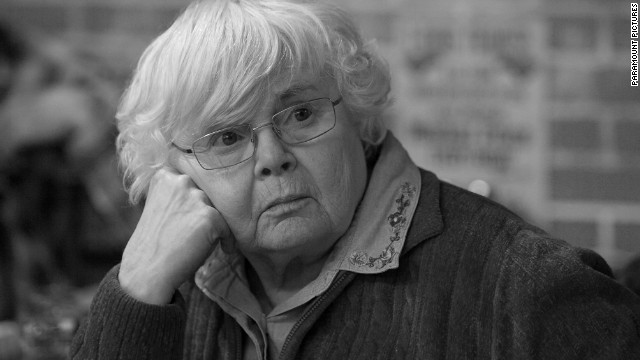 At age 84, June Squibb is up for an Academy Award for best supporting actress for her role in "Nebraska." She's one of just a handful of performers over 80 who have been nominated for the movies' highest honor -- a tribute at any age. At 87, Gloria Stuart was nominated for best supporting actress for her performance in 1997's "Titanic" -- 65 years after she made her first movie. She remains the oldest person ever nominated for a competitive Oscar. Ruby Dee, who earned a supporting actress nomination for 2007's "American Gangster," was 85 at the time of her nomination. She's still going strong at 91. Emmanuelle Riva received a best actress nomination for 2012's "Amour" at 85. Riva's long career in the movies includes "Hiroshima Mon Amour" (1959) and "Blue" (1993) Despite a long career in film -- including the key role as Deep Throat in 1976's "All the President's Men" -- Hal Holbrook didn't get an Oscar nomination until he was 82. He was nominated for best supporting actor for 2007's "Into the Wild." The great Swedish actor Max von Sydow has been nominated for two Oscars. His first nomination came in 1989 for "Pelle the Conquerer," and the second came when he was 82, for 2011's "Extremely Loud & Incredibly Close." At age 82, Christopher Plummer received his second Oscar nomination -- and first Oscar win. He earned a best supporting actor award for "Beginners" in 2011. His other nomination came for 2009's "The Last Station." Plummer is the oldest person to win an acting Oscar. The great Jessica Tandy received her first Oscar nomination, a best actress nod for 1989's "Driving Miss Daisy," when she was 80. She won for that film, and followed up with a nomination for "Fried Green Tomatoes" two years later. George Burns, left, had been in show business for decades, but hadn't appeared in movies for more than 30 years when he took the role opposite Walter Matthau in 1975's "The Sunshine Boys" because his friend, Jack Benny, had died. After winning a supporting actor Oscar at 80, he appeared in several more films, including "Oh, God!" (1977) and "Going in Style" (1979). Eva Le Gallienne, right, was 80 when nominated for best supporting actress for 1980's "Resurrection." The film co-stars Ellen Burstyn, left, and Roberts Blossom. But you don't need to be an adult to be nominated for an Oscar. Several nominees weren't even old enough to drink when they were picked. The youngest nominee of all time is Justin Henry from 1979's "Kramer vs. Kramer" (right, with Meryl Streep). He was 8 when he was nominated for best supporting actor. Jackie Cooper, who grew up to have a long acting and directing career, was 9 when he was nominated for best actor for 1931's "Skippy." Just last year, Quvenzhane Wallis was nominated for best actress for "Beasts of the Southern Wild." She was 9 at the time. She had a small role in one of this year's Oscar front-runners, "12 Years a Slave." Tatum O'Neal, being held by father Ryan, is the youngest winner of an acting category. She was 10 when she won best supporting actress for "Paper Moon" (1973). Today, Anna Paquin is one of the stars of the HBO series "True Blood." Two decades ago, she won best supporting actress for her performance in "The Piano" (1993). She was 11 at the time. Haley Joel Osment was 11 when he was nominated for best supporting actor. He earned the nod for his performance as a child who sees dead people in 1999's "The Sixth Sense." Brandon De Wilde, here with Alan Ladd, got one of the best lines in film history: "Shane, come back!" At 11, he earned a best supporting actor nomination for his performance in "Shane" (1953). New Zealander Keisha Castle-Hughes, then 13, earned a best actress nomination for her performance in 2003's "Whale Rider." She later appeared in "Star Wars Episode III: Revenge of the Sith." Jack Wild, right (with Mark Lester), played the Artful Dodger in the 1968 best picture winner, "Oliver!" He was 16 when he earned a best supporting actor nomination. Patty Duke, whose career has stretched over more than five decades, was 16 when she won best supporting actress for her performance as Helen Keller in "The Miracle Worker" (1962). Anne Bancroft, right, won best actress for her portrayal of Annie Sullivan. Oscar nominees over 80 -- and under 18 Oscar nominees over 80 -- and under 18 Oscar nominees over 80 -- and under 18 Oscar nominees over 80 -- and under 18 Oscar nominees over 80 -- and under 18 Oscar nominees over 80 -- and under 18 Oscar nominees over 80 -- and under 18 Oscar nominees over 80 -- and under 18 Oscar nominees over 80 -- and under 18 Oscar nominees over 80 -- and under 18 Oscar nominees over 80 -- and under 18 Oscar nominees over 80 -- and under 18 Oscar nominees over 80 -- and under 18 Oscar nominees over 80 -- and under 18 Oscar nominees over 80 -- and under 18 Oscar nominees over 80 -- and under 18 Oscar nominees over 80 -- and under 18 Oscar nominees over 80 -- and under 18 Oscar nominees over 80 -- and under 18 Oscar nominees over 80 -- and under 18 HIDE CAPTION << <
At age 84, June Squibb is up for an Academy Award for best supporting actress for her role in "Nebraska." She's one of just a handful of performers over 80 who have been nominated for the movies' highest honor -- a tribute at any age. At 87, Gloria Stuart was nominated for best supporting actress for her performance in 1997's "Titanic" -- 65 years after she made her first movie. She remains the oldest person ever nominated for a competitive Oscar. Ruby Dee, who earned a supporting actress nomination for 2007's "American Gangster," was 85 at the time of her nomination. She's still going strong at 91. Emmanuelle Riva received a best actress nomination for 2012's "Amour" at 85. Riva's long career in the movies includes "Hiroshima Mon Amour" (1959) and "Blue" (1993) Despite a long career in film -- including the key role as Deep Throat in 1976's "All the President's Men" -- Hal Holbrook didn't get an Oscar nomination until he was 82. He was nominated for best supporting actor for 2007's "Into the Wild." The great Swedish actor Max von Sydow has been nominated for two Oscars. His first nomination came in 1989 for "Pelle the Conquerer," and the second came when he was 82, for 2011's "Extremely Loud & Incredibly Close." At age 82, Christopher Plummer received his second Oscar nomination -- and first Oscar win. He earned a best supporting actor award for "Beginners" in 2011. His other nomination came for 2009's "The Last Station." Plummer is the oldest person to win an acting Oscar. The great Jessica Tandy received her first Oscar nomination, a best actress nod for 1989's "Driving Miss Daisy," when she was 80. She won for that film, and followed up with a nomination for "Fried Green Tomatoes" two years later. George Burns, left, had been in show business for decades, but hadn't appeared in movies for more than 30 years when he took the role opposite Walter Matthau in 1975's "The Sunshine Boys" because his friend, Jack Benny, had died. After winning a supporting actor Oscar at 80, he appeared in several more films, including "Oh, God!" (1977) and "Going in Style" (1979). Eva Le Gallienne, right, was 80 when nominated for best supporting actress for 1980's "Resurrection." The film co-stars Ellen Burstyn, left, and Roberts Blossom. But you don't need to be an adult to be nominated for an Oscar. Several nominees weren't even old enough to drink when they were picked. The youngest nominee of all time is Justin Henry from 1979's "Kramer vs. Kramer" (right, with Meryl Streep). He was 8 when he was nominated for best supporting actor. Jackie Cooper, who grew up to have a long acting and directing career, was 9 when he was nominated for best actor for 1931's "Skippy." Just last year, Quvenzhane Wallis was nominated for best actress for "Beasts of the Southern Wild." She was 9 at the time. She had a small role in one of this year's Oscar front-runners, "12 Years a Slave." Tatum O'Neal, being held by father Ryan, is the youngest winner of an acting category. She was 10 when she won best supporting actress for "Paper Moon" (1973). Today, Anna Paquin is one of the stars of the HBO series "True Blood." Two decades ago, she won best supporting actress for her performance in "The Piano" (1993). She was 11 at the time. Haley Joel Osment was 11 when he was nominated for best supporting actor. He earned the nod for his performance as a child who sees dead people in 1999's "The Sixth Sense." Brandon De Wilde, here with Alan Ladd, got one of the best lines in film history: "Shane, come back!" At 11, he earned a best supporting actor nomination for his performance in "Shane" (1953). New Zealander Keisha Castle-Hughes, then 13, earned a best actress nomination for her performance in 2003's "Whale Rider." She later appeared in "Star Wars Episode III: Revenge of the Sith." Jack Wild, right (with Mark Lester), played the Artful Dodger in the 1968 best picture winner, "Oliver!" He was 16 when he earned a best supporting actor nomination. Patty Duke, whose career has stretched over more than five decades, was 16 when she won best supporting actress for her performance as Helen Keller in "The Miracle Worker" (1962). Anne Bancroft, right, won best actress for her portrayal of Annie Sullivan. Oscar nominees over 80 -- and under 18 Oscar nominees over 80 -- and under 18 Oscar nominees over 80 -- and under 18 Oscar nominees over 80 -- and under 18 Oscar nominees over 80 -- and under 18 Oscar nominees over 80 -- and under 18 Oscar nominees over 80 -- and under 18 Oscar nominees over 80 -- and under 18 Oscar nominees over 80 -- and under 18 Oscar nominees over 80 -- and under 18 Oscar nominees over 80 -- and under 18 Oscar nominees over 80 -- and under 18 Oscar nominees over 80 -- and under 18 Oscar nominees over 80 -- and under 18 Oscar nominees over 80 -- and under 18 Oscar nominees over 80 -- and under 18 Oscar nominees over 80 -- and under 18 Oscar nominees over 80 -- and under 18 Oscar nominees over 80 -- and under 18 Oscar nominees over 80 -- and under 18 HIDE CAPTION << <  1
1  2
2  3
3  4
4  5
5  6
6  7
7  8
8  9
9  10
10  11
11  12
12  13
13  14
14  15
15  16
16  17
17  18
18  19
19  20 > >>
20 > >>  Oscar nominees over 80 and under 18 .cnnArticleGalleryNav{border:1px solid #000;cursor:pointer;float:left;height:25px;text-align:center;width:25px} .cnnArticleGalleryNavOn{background-color:#C03;border:1px solid #000;float:left;height:25px;text-align:center;width:20px} .cnnArticleGalleryNavDisabled{background-color:#222;border:1px solid #000;color:#666;float:left;height:25px;text-align:center;width:25px} .cnnArticleExpandableTarget{background-color:#000;display:none;position:absolute} .cnnArticlePhotoContainer{height:122px;width:214px} .cnnArticleBoxImage{cursor:pointer;height:122px;padding-top:0;width:214px} .cnnArticleGalleryCaptionControl{background-color:#000;color:#FFF} .cnnArticleGalleryCaptionControlText{cursor:pointer;float:right;font-size:10px;padding:3px 10px 3px 3px} .cnnArticleGalleryPhotoContainer cite{background:none repeat scroll 0 0 #000;bottom:48px;color:#FFF;height:auto;left:420px;opacity:.7;position:absolute;width:200px;padding:10px} .cnnArticleGalleryClose{background-color:#fff;display:block;text-align:right} .cnnArticleGalleryCloseButton{cursor:pointer} .cnnArticleGalleryNavPrevNext span{background-color:#444;color:#CCC;cursor:pointer;float:left;height:23px;text-align:center;width:26px;padding:4px 0 0} .cnnArticleGalleryNavPrevNextDisabled span{background-color:#444;color:#666;float:left;height:23px;text-align:center;width:25px;padding:4px 0 0} .cnnVerticalGalleryPhoto{padding-right:68px;width:270px;margin:0 auto} .cnnGalleryContainer{float:left;clear:left;margin:0 0 20px;padding:0 0 0 10px}
Oscar nominees over 80 and under 18 .cnnArticleGalleryNav{border:1px solid #000;cursor:pointer;float:left;height:25px;text-align:center;width:25px} .cnnArticleGalleryNavOn{background-color:#C03;border:1px solid #000;float:left;height:25px;text-align:center;width:20px} .cnnArticleGalleryNavDisabled{background-color:#222;border:1px solid #000;color:#666;float:left;height:25px;text-align:center;width:25px} .cnnArticleExpandableTarget{background-color:#000;display:none;position:absolute} .cnnArticlePhotoContainer{height:122px;width:214px} .cnnArticleBoxImage{cursor:pointer;height:122px;padding-top:0;width:214px} .cnnArticleGalleryCaptionControl{background-color:#000;color:#FFF} .cnnArticleGalleryCaptionControlText{cursor:pointer;float:right;font-size:10px;padding:3px 10px 3px 3px} .cnnArticleGalleryPhotoContainer cite{background:none repeat scroll 0 0 #000;bottom:48px;color:#FFF;height:auto;left:420px;opacity:.7;position:absolute;width:200px;padding:10px} .cnnArticleGalleryClose{background-color:#fff;display:block;text-align:right} .cnnArticleGalleryCloseButton{cursor:pointer} .cnnArticleGalleryNavPrevNext span{background-color:#444;color:#CCC;cursor:pointer;float:left;height:23px;text-align:center;width:26px;padding:4px 0 0} .cnnArticleGalleryNavPrevNextDisabled span{background-color:#444;color:#666;float:left;height:23px;text-align:center;width:25px;padding:4px 0 0} .cnnVerticalGalleryPhoto{padding-right:68px;width:270px;margin:0 auto} .cnnGalleryContainer{float:left;clear:left;margin:0 0 20px;padding:0 0 0 10px} 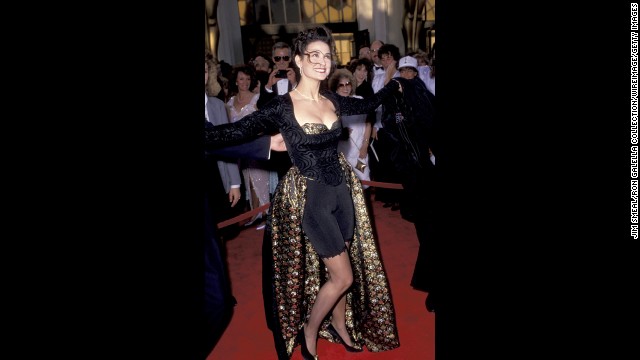 Part of the fun of the Academy Awards is watching the red carpet. Nearly every year, you have a star who stands out in an amazing dress ... and then you have those who either forgot they were attending Hollywood's biggest night or just didn't care. This is a list dedicated to those fashion foibles. Example No. 1 is Demi Moore at the 1989 Oscars. She arrived looking like she couldn't decide between being in a ball gown or a Milli Vanilli music video so she just split the difference. We'll cut 1988 Jodie Foster some slack because she did win a best actress Oscar that year for "The Accused." Instead, we'll blame this sky-blue mullet of a prom dress on it being the '80s -- and on the person who told her it was a good idea to shop off the rack. Kim Basinger in "Nine ½ Weeks"? Sign us up. Kim Basinger, fashion designer? Not the best idea. You see what happened when she tried that in 1990. When we saw Geena Davis arrive at the Oscars in 1992 -- she was nominated for "Thelma & Louise" at the time -- we were left with several questions. Where did she leave the front of her dress? Why was there a black-bow motif on her shoes and on the train? Would this unraveling ruffle of confusion have been any better if she just didn't wear the black tights? Sometimes we think Whoopi Goldberg intentionally trolls fashion lovers with her red-carpet outfits. In 1993, the Oscar winner -- she'd previously picked up the best supporting actress award for "Ghost" in 1991 -- arrived in a get-up that appeared to take Demi Moore's 1989 look and kick it up a notch with full-length pants, a full skirt and as much neon as possible. On one hand, Lizzy Gardiner's dress of American Express Gold Cards is certainly ... inspired. The costume designer crafted her own gown in 1995, when she won the best costume design Oscar for "Priscilla, Queen of the Desert." But c'mon, Lizzy -- if you could afford that gold wrap, you could afford enough fabric for an actual dress. As though satin formalwear isn't already difficult enough to pull off, Susan Sarandon went and had her Dolce & Gabbana dress made in an awkward copper shade to match her hair in 1996. Not that our opinion matters for much: Sarandon won the best actress Oscar that year for "Dead Man Walking," and the dress was donated to the Metropolitan Museum of Art's Costume Institute. Some fabrics just aren't Oscar-friendly, and velvet is one of them, as Anna Nicole Smith learned after she arrived in this aquamarine number in 1996. We're positive The Count from "Sesame Street" saw Oscar winner Juliette Binoche at the 1997 awards, did a double-take, and then immediately called Us Weekly for a "who wore it best?" comparison. Madonna changes styles -- and accents -- so regularly that it feels like we're being introduced to a new person each time. In 1999, it was Zen Madonna who showed up to a Vanity Fair Oscars party. We've waited years to find out which prom-bound teen Tyra Banks stole this frock from before going to the 2000 Academy Awards. We get it: Angelina Jolie has a personal style. It often involves a lot of black -- and sometimes clingy -- fabrics. But even Morticia Addams would dress it up a bit when going to the Oscars. Especially if she was going to walk away with the best supporting actress award, as Jolie did in 2000. To begin with, we're not fans of knockoffs, so that was strike one against "South Park" creators Trey Parker, left, and Matt Stone, who went to the 2000 Oscars dressed as Jennifer Lopez and Gwyneth Paltrow. And strike two is that we actually liked Paltrow's bubble-gum-pink princess dress from the 1999 Oscars -- even if her own mother hated it. Thanks to this now-iconic swan dress she wore to the 2001 Oscars, Bjork will never get off the worst-dressed list. But is that really a bad thing? Several of you probably have no idea who won what at that year's ceremony, but you do know that there was a lady on the red carpet wearing a bird. In the industry, we call that a publicity win. Kate Hudson's 2001 Oscars dress was so bad, it still haunted her a decade later. "It was my first and only nomination," Hudson told Vogue UK in 2011. "I was 21 years old, and to have Stella McCartney dressing me, well, I felt like the hippest, coolest girl in the world." Hudson woke up the next day, turned on the TV and learned she "was on every worst-dressed list possible. So I called Stella and we just laughed ... and she said to me, 'Look babe, it was the hair wasn't it?' " At the time, Cameron Diaz's Asian-inspired floral gown may have seemed unique and progressively on-trend. And perhaps it would have been, had she worn it anywhere other than the Oscars in 2002. Whenever we stumble across this photo of a frumpy, braless Gwyneth Paltrow at the 2002 Oscars, we want to pat her arm and tell her: "It gets better. You find Goop." We've looked at Faith Hill in this multicolored frock multiple times, and the urge for a bowl of rainbow sherbet never goes away. Jennifer Connelly, who won the 2002 Oscar for best supporting actress, arrived at the ceremony that year fully prepared in case the theater was chilly. That turned out to be a very, very bad idea. Before Hilary Swank set a new standard for Oscar dresses in 2005, she wore this gauzy pink gown to the 2003 awards. We can see its appeal -- it's breezy! it's bright! -- but it left many critics turned off. Diane Keaton clearly wanted to channel "Annie Hall" for the 2004 Oscars, but she went too far back in time. Instead of a '70s, feminine menswear vibe, she looked like a Charlie Chaplin impersonator. We love Sandra Bullock to bits, but we don't love all the extraneous parts on her 2004 Oscars dress. Did it really need to be tiered and feathered and have bows? When Uma Thurman attended the Oscars in 2004, she was smack in the middle of promoting Quentin Tarantino's "Kill Bill Vol. 2." Critics probably would've gone easier on her had she worn her character's famous yellow bodysuit instead of this "Heidi"-esque costume of a dress. We're pretty sure Charlize Theron attended the 2006 Oscars, but it was hard to tell thanks to this forest-green gown nearly swallowing her whole. Faye Dunaway's 2007 Oscars dress was so out there -- crazy tailoring, oddly placed ruffles reminiscent of a clown's collar -- that we're going to applaud her for even having the guts to wear it. Jennifer Hudson's 2007 Oscars outfit is one that you simply love -- or love to hate. The "Dreamgirls" actress picked up the Oscar for best supporting actress that year, but some people couldn't see past the metallic, structured bolero jacket she wore on the red carpet. Tilda Swinton has a notably unique sense of style, and we're used to not always fully understanding some of her sartorial choices. But, you know, it's Tilda Swinton, so you go with it. And yet we're not sure even she could explain her 2008 Oscars dress. In 2010, Charlize Theron's daring sense of fashion struck again when she thought having rosettes placed directly over her breasts would be a good idea. Do you think Jennifer Lopez noticed that there was an unnecessary monster ruffle attacking her otherwise acceptable dress at the 2010 Oscars? Or was she just choosing to ignore it? The pleated skirt of Cate Blanchett's pale purple 2011 Oscars dress was beautifully delicate, but we hated the bodice. Something about the beading of the gown's top half reminded of us of the kind of outbreak you'd see in a sci-fi movie, and it still makes our skin crawl. Angelina Jolie's right leg at the 2012 Oscars: Never. Forget. Meryl Streep's awesomeness can't be tarnished by one bad dress, but the gold wrap she wore to the 2012 Oscars -- you remember, the one that looked strangely like spray-painted aluminum foil -- tried mightily to sully the Oscar winner's rep. We love Melissa McCarthy so much that we've pre-emptively pledged to see each and every one of her movies, including the poorly reviewed ones. That is why it pained us to see her wear this awkward dress to the 2012 Oscars. We didn't mind Jennifer Lopez's sleek, form-fitting gown at the 2012 Oscars all that much ... until we realized that it was cut so low it was a wardrobe malfunction waiting to happen. Anne Hathaway was obviously going for elegance at the 2013 Oscars, but due to some unfortunate tailoring -- or the weather, we're still not entirely sure -- she spent the evening looking like she needed a pair of pasties. Oscars: Best of the worst dresses Oscars: Best of the worst dresses Oscars: Best of the worst dresses Oscars: Best of the worst dresses Oscars: Best of the worst dresses Oscars: Best of the worst dresses Oscars: Best of the worst dresses Oscars: Best of the worst dresses Oscars: Best of the worst dresses Oscars: Best of the worst dresses Oscars: Best of the worst dresses Oscars: The worst dresses ever Oscars: The worst dresses ever Oscars: The worst dresses ever Oscars: Best of the worst dresses Oscars: Best of the worst dresses Oscars: The worst dresses ever Oscars: Best of the worst dresses Oscars: Best of the worst dresses Oscars: Best of the worst dresses Oscars: The worst dresses ever Oscars: Best of the worst dresses Oscars: Best of the worst dresses Oscars: Best of the worst dresses Oscars: Best of the worst dresses Oscars: Best of the worst dresses Oscars: Best of the worst dresses Oscars: Best of the worst dresses Oscars: Best of the worst dresses Oscars: The worst dresses ever Oscars: Best of the worst dresses Oscars: Best of the worst dresses Oscars: Best of the worst dresses Oscars: Best of the worst dresses Oscars: Best of the worst dresses HIDE CAPTION << <
Part of the fun of the Academy Awards is watching the red carpet. Nearly every year, you have a star who stands out in an amazing dress ... and then you have those who either forgot they were attending Hollywood's biggest night or just didn't care. This is a list dedicated to those fashion foibles. Example No. 1 is Demi Moore at the 1989 Oscars. She arrived looking like she couldn't decide between being in a ball gown or a Milli Vanilli music video so she just split the difference. We'll cut 1988 Jodie Foster some slack because she did win a best actress Oscar that year for "The Accused." Instead, we'll blame this sky-blue mullet of a prom dress on it being the '80s -- and on the person who told her it was a good idea to shop off the rack. Kim Basinger in "Nine ½ Weeks"? Sign us up. Kim Basinger, fashion designer? Not the best idea. You see what happened when she tried that in 1990. When we saw Geena Davis arrive at the Oscars in 1992 -- she was nominated for "Thelma & Louise" at the time -- we were left with several questions. Where did she leave the front of her dress? Why was there a black-bow motif on her shoes and on the train? Would this unraveling ruffle of confusion have been any better if she just didn't wear the black tights? Sometimes we think Whoopi Goldberg intentionally trolls fashion lovers with her red-carpet outfits. In 1993, the Oscar winner -- she'd previously picked up the best supporting actress award for "Ghost" in 1991 -- arrived in a get-up that appeared to take Demi Moore's 1989 look and kick it up a notch with full-length pants, a full skirt and as much neon as possible. On one hand, Lizzy Gardiner's dress of American Express Gold Cards is certainly ... inspired. The costume designer crafted her own gown in 1995, when she won the best costume design Oscar for "Priscilla, Queen of the Desert." But c'mon, Lizzy -- if you could afford that gold wrap, you could afford enough fabric for an actual dress. As though satin formalwear isn't already difficult enough to pull off, Susan Sarandon went and had her Dolce & Gabbana dress made in an awkward copper shade to match her hair in 1996. Not that our opinion matters for much: Sarandon won the best actress Oscar that year for "Dead Man Walking," and the dress was donated to the Metropolitan Museum of Art's Costume Institute. Some fabrics just aren't Oscar-friendly, and velvet is one of them, as Anna Nicole Smith learned after she arrived in this aquamarine number in 1996. We're positive The Count from "Sesame Street" saw Oscar winner Juliette Binoche at the 1997 awards, did a double-take, and then immediately called Us Weekly for a "who wore it best?" comparison. Madonna changes styles -- and accents -- so regularly that it feels like we're being introduced to a new person each time. In 1999, it was Zen Madonna who showed up to a Vanity Fair Oscars party. We've waited years to find out which prom-bound teen Tyra Banks stole this frock from before going to the 2000 Academy Awards. We get it: Angelina Jolie has a personal style. It often involves a lot of black -- and sometimes clingy -- fabrics. But even Morticia Addams would dress it up a bit when going to the Oscars. Especially if she was going to walk away with the best supporting actress award, as Jolie did in 2000. To begin with, we're not fans of knockoffs, so that was strike one against "South Park" creators Trey Parker, left, and Matt Stone, who went to the 2000 Oscars dressed as Jennifer Lopez and Gwyneth Paltrow. And strike two is that we actually liked Paltrow's bubble-gum-pink princess dress from the 1999 Oscars -- even if her own mother hated it. Thanks to this now-iconic swan dress she wore to the 2001 Oscars, Bjork will never get off the worst-dressed list. But is that really a bad thing? Several of you probably have no idea who won what at that year's ceremony, but you do know that there was a lady on the red carpet wearing a bird. In the industry, we call that a publicity win. Kate Hudson's 2001 Oscars dress was so bad, it still haunted her a decade later. "It was my first and only nomination," Hudson told Vogue UK in 2011. "I was 21 years old, and to have Stella McCartney dressing me, well, I felt like the hippest, coolest girl in the world." Hudson woke up the next day, turned on the TV and learned she "was on every worst-dressed list possible. So I called Stella and we just laughed ... and she said to me, 'Look babe, it was the hair wasn't it?' " At the time, Cameron Diaz's Asian-inspired floral gown may have seemed unique and progressively on-trend. And perhaps it would have been, had she worn it anywhere other than the Oscars in 2002. Whenever we stumble across this photo of a frumpy, braless Gwyneth Paltrow at the 2002 Oscars, we want to pat her arm and tell her: "It gets better. You find Goop." We've looked at Faith Hill in this multicolored frock multiple times, and the urge for a bowl of rainbow sherbet never goes away. Jennifer Connelly, who won the 2002 Oscar for best supporting actress, arrived at the ceremony that year fully prepared in case the theater was chilly. That turned out to be a very, very bad idea. Before Hilary Swank set a new standard for Oscar dresses in 2005, she wore this gauzy pink gown to the 2003 awards. We can see its appeal -- it's breezy! it's bright! -- but it left many critics turned off. Diane Keaton clearly wanted to channel "Annie Hall" for the 2004 Oscars, but she went too far back in time. Instead of a '70s, feminine menswear vibe, she looked like a Charlie Chaplin impersonator. We love Sandra Bullock to bits, but we don't love all the extraneous parts on her 2004 Oscars dress. Did it really need to be tiered and feathered and have bows? When Uma Thurman attended the Oscars in 2004, she was smack in the middle of promoting Quentin Tarantino's "Kill Bill Vol. 2." Critics probably would've gone easier on her had she worn her character's famous yellow bodysuit instead of this "Heidi"-esque costume of a dress. We're pretty sure Charlize Theron attended the 2006 Oscars, but it was hard to tell thanks to this forest-green gown nearly swallowing her whole. Faye Dunaway's 2007 Oscars dress was so out there -- crazy tailoring, oddly placed ruffles reminiscent of a clown's collar -- that we're going to applaud her for even having the guts to wear it. Jennifer Hudson's 2007 Oscars outfit is one that you simply love -- or love to hate. The "Dreamgirls" actress picked up the Oscar for best supporting actress that year, but some people couldn't see past the metallic, structured bolero jacket she wore on the red carpet. Tilda Swinton has a notably unique sense of style, and we're used to not always fully understanding some of her sartorial choices. But, you know, it's Tilda Swinton, so you go with it. And yet we're not sure even she could explain her 2008 Oscars dress. In 2010, Charlize Theron's daring sense of fashion struck again when she thought having rosettes placed directly over her breasts would be a good idea. Do you think Jennifer Lopez noticed that there was an unnecessary monster ruffle attacking her otherwise acceptable dress at the 2010 Oscars? Or was she just choosing to ignore it? The pleated skirt of Cate Blanchett's pale purple 2011 Oscars dress was beautifully delicate, but we hated the bodice. Something about the beading of the gown's top half reminded of us of the kind of outbreak you'd see in a sci-fi movie, and it still makes our skin crawl. Angelina Jolie's right leg at the 2012 Oscars: Never. Forget. Meryl Streep's awesomeness can't be tarnished by one bad dress, but the gold wrap she wore to the 2012 Oscars -- you remember, the one that looked strangely like spray-painted aluminum foil -- tried mightily to sully the Oscar winner's rep. We love Melissa McCarthy so much that we've pre-emptively pledged to see each and every one of her movies, including the poorly reviewed ones. That is why it pained us to see her wear this awkward dress to the 2012 Oscars. We didn't mind Jennifer Lopez's sleek, form-fitting gown at the 2012 Oscars all that much ... until we realized that it was cut so low it was a wardrobe malfunction waiting to happen. Anne Hathaway was obviously going for elegance at the 2013 Oscars, but due to some unfortunate tailoring -- or the weather, we're still not entirely sure -- she spent the evening looking like she needed a pair of pasties. Oscars: Best of the worst dresses Oscars: Best of the worst dresses Oscars: Best of the worst dresses Oscars: Best of the worst dresses Oscars: Best of the worst dresses Oscars: Best of the worst dresses Oscars: Best of the worst dresses Oscars: Best of the worst dresses Oscars: Best of the worst dresses Oscars: Best of the worst dresses Oscars: Best of the worst dresses Oscars: The worst dresses ever Oscars: The worst dresses ever Oscars: The worst dresses ever Oscars: Best of the worst dresses Oscars: Best of the worst dresses Oscars: The worst dresses ever Oscars: Best of the worst dresses Oscars: Best of the worst dresses Oscars: Best of the worst dresses Oscars: The worst dresses ever Oscars: Best of the worst dresses Oscars: Best of the worst dresses Oscars: Best of the worst dresses Oscars: Best of the worst dresses Oscars: Best of the worst dresses Oscars: Best of the worst dresses Oscars: Best of the worst dresses Oscars: Best of the worst dresses Oscars: The worst dresses ever Oscars: Best of the worst dresses Oscars: Best of the worst dresses Oscars: Best of the worst dresses Oscars: Best of the worst dresses Oscars: Best of the worst dresses HIDE CAPTION << <  1
1  2
2  3
3  4
4  5
5  6
6  7
7  8
8  9
9  10
10  11
11  12
12  13
13  14
14  15
15  16
16  17
17  18
18  19
19  20
20  21
21  22
22  23
23  24
24  25
25  26
26  27
27  28
28  29
29  30
30  31
31  32
32  33
33  34
34  35 > >>
35 > >>  Oscars: Best of the worst dresses
Oscars: Best of the worst dresses Besides shaving her eyebrows and wearing prosthetic teeth, Theron had swollen her sylphlike frame by 30 pounds through heavy intakes of Stuff That Is Bad For You, mostly doughnuts and potato chips. This helped make her the -- sorry about this -- heavy favorite in a field that included then-newcomer Keisha Castle-Hughes for "Whale Rider," Diane Keaton for "Something's Gotta Give," Naomi Watts for "21 Grams" and Samantha Morton for "In America."
Bear in mind, of course, that Theron, before and since, showed keen acting chops even when assuming her regular, blade-like countenance.
Doesn't matter. Pretty people rarely get Oscars looking like themselves. Cary Grant, who some believe to have been the best actor of the early sound era and beyond, only got an Oscar years after his retirement. His still-indelible turns in "His Girl Friday" (1940) "Notorious" (1946) and "Charade" (1963) went unacknowledged. He never let you see him act. He just did. Maybe that was the problem.
Meanwhile, the template for physical-self-abasing-to-success was established back in 1980 when Robert De Niro portrayed boxer Jake La Motta. In "Raging Bull," he played both the taut middleweight champ in his prime and the bloated nightclub entertainer he became.
De Niro packed on 60 pounds in one of the more jarring nonmechanical special effects in movie history. Maybe he would have still won the Oscar without going to such extremes. But De Niro's efforts put him far ahead in a strong field that included career-enhancing performances by Robert Duvall in "The Great Santini" and Peter O'Toole in "The Stunt Man."
Meryl Streep transformed herself into Margaret Thatcher and won the 2012 best actress Oscar for "Iron Lady." She thanked her makeup artists.
Another example of an actor tamping down glamor for gold came when George Clooney won best supporting actor in 2006's "Syriana."
Clooney, the exemplar of movie-star sleekness, took on facial hair and 30 pounds to play the luckless CIA agent Robert Bair. Some observers believed the Oscar was as much for Clooney's good works, including his direction of that year's critically acclaimed "Good Night and Good Luck," as for his performance. But the rewards for sacrificing physical beauty were acknowledged nonetheless.
The daring doesn't always work and De Niro, again, offers an example, having shed 35 pounds and worked himself into a solitary grind as a cabbie to prepare for the role of lone gunman Travis Bickle in 1976's "Taxi Driver."
He was nominated, but lost to the late Peter Finch as the comparably unhinged Howard Beale in "Network." Among the many possible reasons for De Niro's deferred lead-actor Academy honor is that, at the time, he hadn't yet established an image that could be dramatically overturned or re-set in voters' minds.
Because, more than anything else, even a better performance, Hollywood loves to see a performer overturn pre-existing expectations.
Was Dustin Hoffman's gnarled, doomed Ratzo Rizzo in 1969's "Midnight Cowboy" better than John Wayne's dyspeptic, one-eyed Rooster Cogburn in "True Grit" that same year? Maybe, but it was an all-but-foregone conclusion going into the Oscar ceremony that Wayne would get the gold statuette for mucking around with his persona.
Jeff Bridges would, 30 years later, also be nominated for assuming Rooster's eye-patch and ill temper in a "True Grit" remake. But Bridges' sixth Oscar nomination was overshadowed by finally winning best actor the year before for portraying a seedy, recidivist country-western singer in "Crazy Heart."
Although it was nice to see Bridges win the prize, it seemed to many critics that Bridges had by then submitted more than a dozen performances that were smarter, subtler and more flattering than that of a mendacious substance abuser so in need of cash that he needs to pee in a bottle while driving between gigs. His most iconic role, The Dude in 1998's "The Big Lebowski," wasn't even nominated that year.
But when an actor's time has come as it did for Bridges, Wayne, De Niro, Theron and others, precedents flutter noiselessly into the California ozone. Matthew McConaughey's time, it is widely believed, has come this year through a combination of circumstance, timing, fortune -- and crash dieting.
Follow us on Twitter @CNNOpinion.
Join us on Facebook/CNNOpinion.
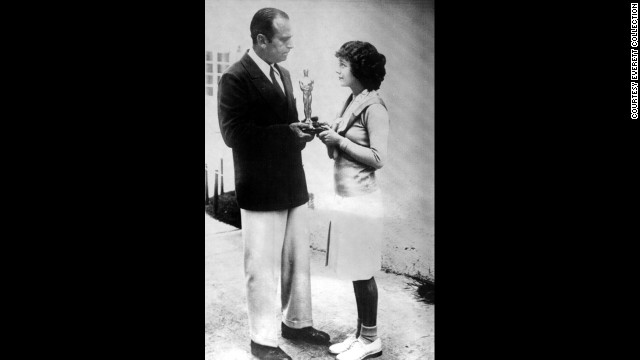 Douglas Fairbanks Sr. hands Janet Gaynor her best actress Oscar in 1929 for Gaynor's performance in the 1927 film ''Sunrise." It was the first best actress Oscar ever awarded.
Douglas Fairbanks Sr. hands Janet Gaynor her best actress Oscar in 1929 for Gaynor's performance in the 1927 film ''Sunrise." It was the first best actress Oscar ever awarded. 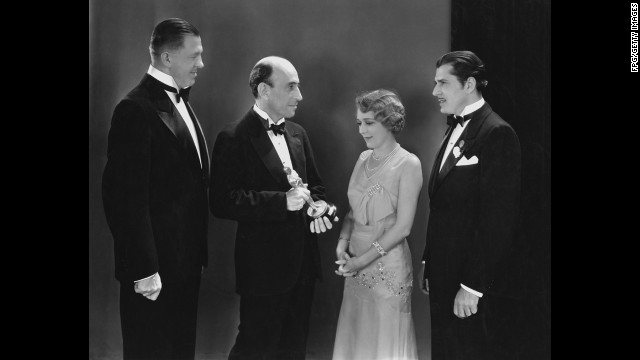 In 1930, there were actually two Oscar ceremonies. Actress Mary Pickford, seen here, receives her best actress Oscar in April 1930 for her performance in the 1929 film "Coquette."
In 1930, there were actually two Oscar ceremonies. Actress Mary Pickford, seen here, receives her best actress Oscar in April 1930 for her performance in the 1929 film "Coquette." 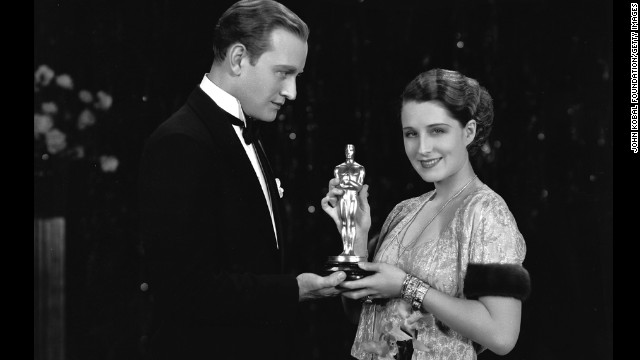 Norma Shearer receives a best actress Oscar in October 1930 for her role in "The Divorcee." Giving her the award is Conrad Nagel, who starred with her in the film released earlier that year.
Norma Shearer receives a best actress Oscar in October 1930 for her role in "The Divorcee." Giving her the award is Conrad Nagel, who starred with her in the film released earlier that year. 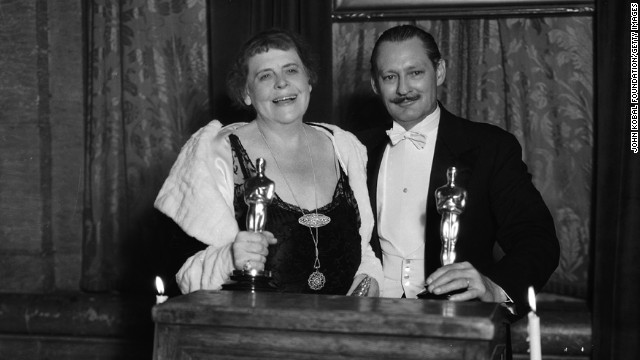 Marie Dressler and Lionel Barrymore collect their best actress and best actor Oscars in 1931. Dressler won for "Min and Bill" and Barrymore won for "A Free Soul."
Marie Dressler and Lionel Barrymore collect their best actress and best actor Oscars in 1931. Dressler won for "Min and Bill" and Barrymore won for "A Free Soul." 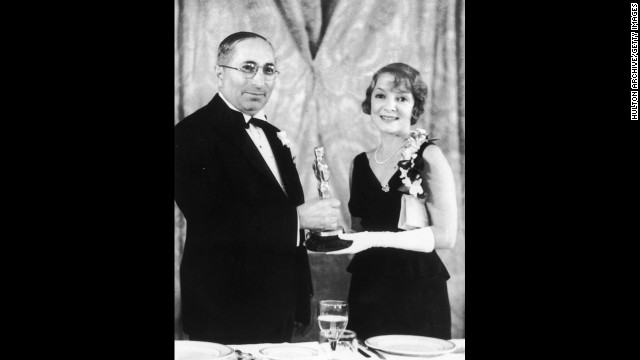 Film producer Louis B. Mayer presents the best actress Oscar to Helen Hayes for her role in "The Sin of Madelon Claudet."
Film producer Louis B. Mayer presents the best actress Oscar to Helen Hayes for her role in "The Sin of Madelon Claudet." 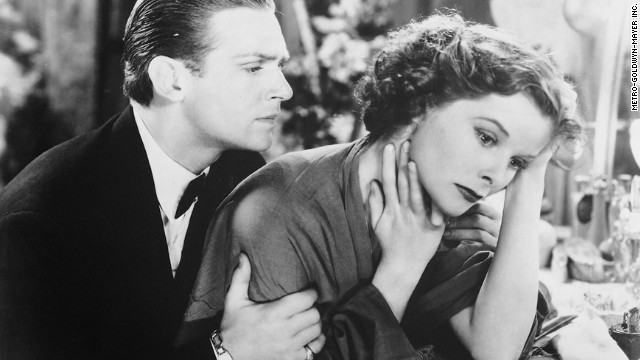 Douglas Fairbanks Jr. and Katharine Hepburn appear in the 1933 film "Morning Glory." Hepburn's performance earned her the best actress Oscar in 1934. There was no Academy Awards ceremony in 1933; films from that year and the last half of 1932 were eligible to win at the 1934 ceremony.
Douglas Fairbanks Jr. and Katharine Hepburn appear in the 1933 film "Morning Glory." Hepburn's performance earned her the best actress Oscar in 1934. There was no Academy Awards ceremony in 1933; films from that year and the last half of 1932 were eligible to win at the 1934 ceremony. 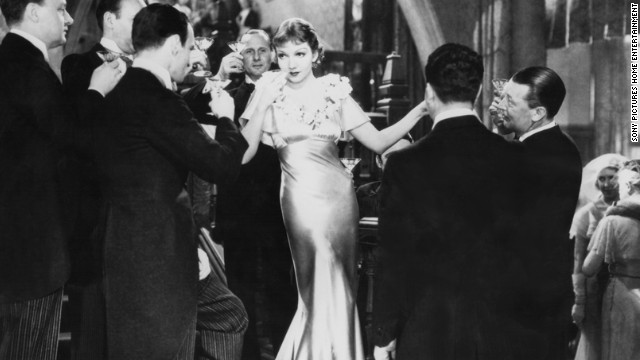 Claudette Colbert won the best actress Oscar in 1935 for "It Happened One Night," a film that was the first to win all five of the major Academy Award categories -- best picture, best director, best actor, best actress and best screenplay.
Claudette Colbert won the best actress Oscar in 1935 for "It Happened One Night," a film that was the first to win all five of the major Academy Award categories -- best picture, best director, best actor, best actress and best screenplay. 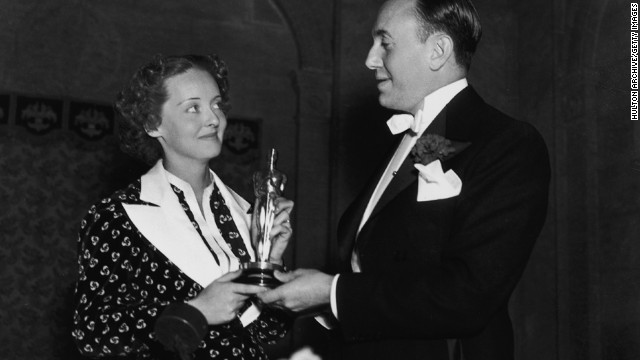 Bette Davis and film producer Jack L. Warner hold Davis' best actress Oscar at the ceremony held in 1936. Davis won her first Oscar for her role in the film "Dangerous."
Bette Davis and film producer Jack L. Warner hold Davis' best actress Oscar at the ceremony held in 1936. Davis won her first Oscar for her role in the film "Dangerous." 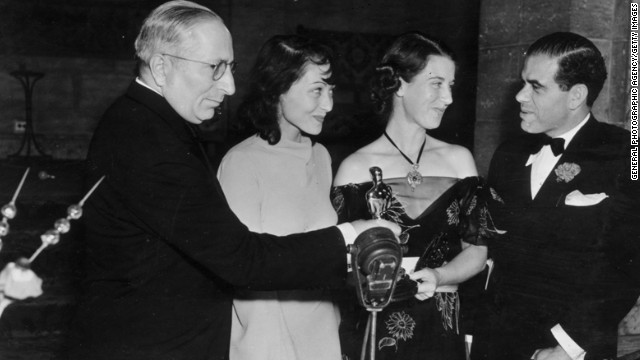 Luise Rainer, second from left, is seen at the 1937 ceremony with, from left, Louis B. Mayer, Louise Tracy and Frank Capra. Rainer won for "The Great Ziegfeld."
Luise Rainer, second from left, is seen at the 1937 ceremony with, from left, Louis B. Mayer, Louise Tracy and Frank Capra. Rainer won for "The Great Ziegfeld." 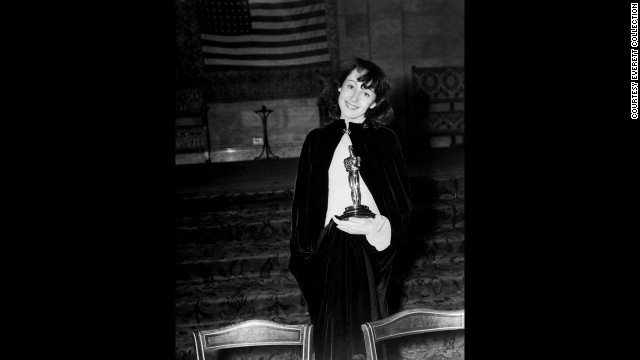 For her performance in "The Good Earth," Luise Rainer won the best actress Oscar for the second consecutive year.
For her performance in "The Good Earth," Luise Rainer won the best actress Oscar for the second consecutive year. 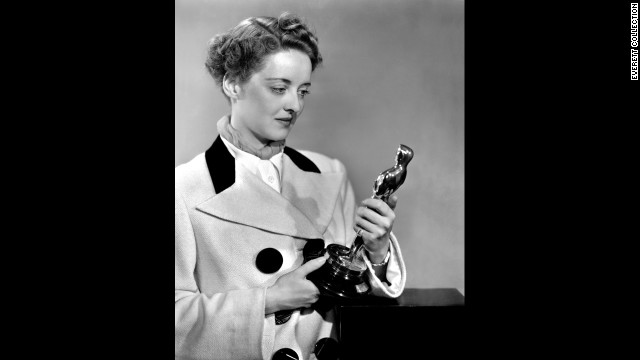 Bette Davis won her second Oscar in 1939, this time for "Jezebel."
Bette Davis won her second Oscar in 1939, this time for "Jezebel." 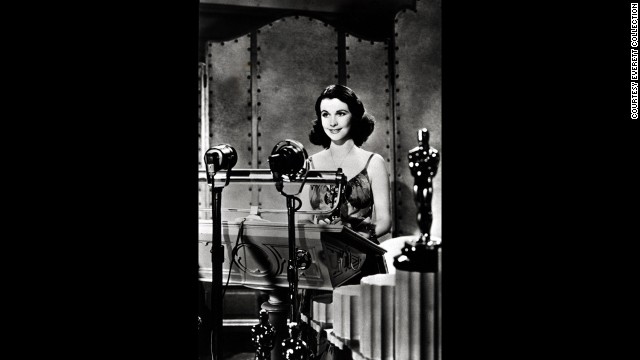 Vivien Leigh accepts her Oscar in 1940 for her performance in "Gone With the Wind."
Vivien Leigh accepts her Oscar in 1940 for her performance in "Gone With the Wind." 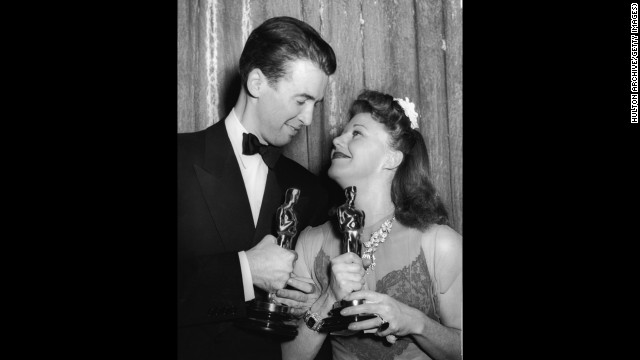 Actors James Stewart and Ginger Rogers smile after winning Oscars in 1941. Stewart won best actor for his performance in "The Philadelphia Story," while Rogers won best actress for her performance in "Kitty Foyle: The Natural History of a Woman."
Actors James Stewart and Ginger Rogers smile after winning Oscars in 1941. Stewart won best actor for his performance in "The Philadelphia Story," while Rogers won best actress for her performance in "Kitty Foyle: The Natural History of a Woman." 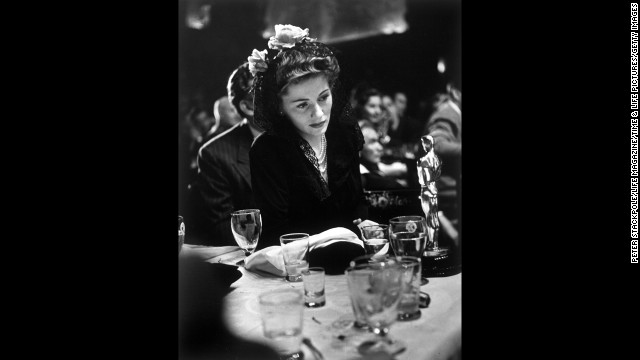 Joan Fontaine looks at the best actress Oscar she won for her role in the film "Suspicion."
Joan Fontaine looks at the best actress Oscar she won for her role in the film "Suspicion." 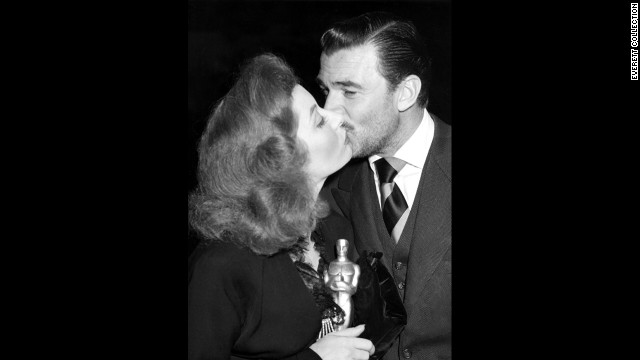 After winning the best actress Oscar in 1943, Greer Garson gets a congratulatory kiss from her "Mrs. Miniver" co-star Walter Pidgeon.
After winning the best actress Oscar in 1943, Greer Garson gets a congratulatory kiss from her "Mrs. Miniver" co-star Walter Pidgeon. 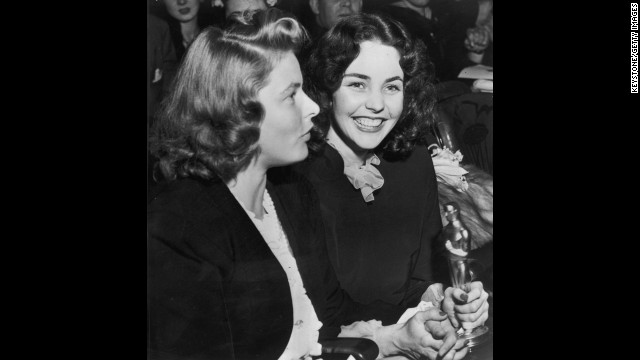 Jennifer Jones holds the best actress Oscar she won in 1944 for her performance in "Song of Bernadette." To her right is actress Ingrid Bergman.
Jennifer Jones holds the best actress Oscar she won in 1944 for her performance in "Song of Bernadette." To her right is actress Ingrid Bergman. 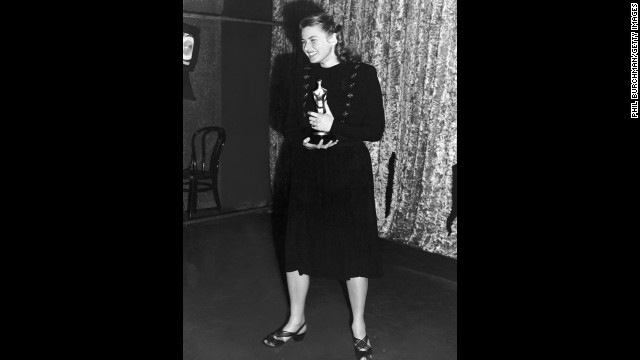 Ingrid Bergman didn't have to wait long to hold her own best actress award. Here, she poses with the Oscar she earned for her role in the film "Gaslight."
Ingrid Bergman didn't have to wait long to hold her own best actress award. Here, she poses with the Oscar she earned for her role in the film "Gaslight." 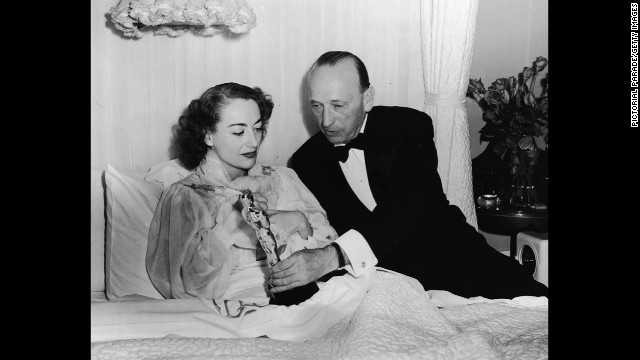 Joan Crawford receives her Academy Award in bed because of an illness. She was recognized for her performance in the 1945 film "Mildred Pierce."
Joan Crawford receives her Academy Award in bed because of an illness. She was recognized for her performance in the 1945 film "Mildred Pierce." 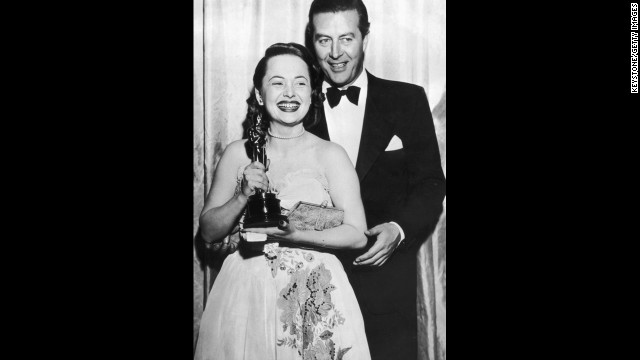 Olivia de Havilland receives her best actress Oscar from actor Ray Milland for her performance in "To Each His Own."
Olivia de Havilland receives her best actress Oscar from actor Ray Milland for her performance in "To Each His Own." 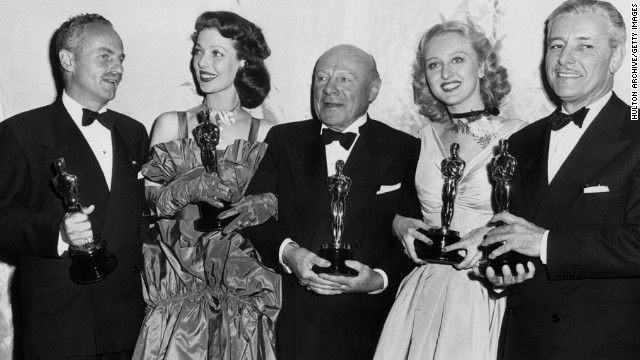 Loretta Young, second from left, won the best actress Oscar in 1948 for her role in "Farmer's Daughter."
Loretta Young, second from left, won the best actress Oscar in 1948 for her role in "Farmer's Daughter." 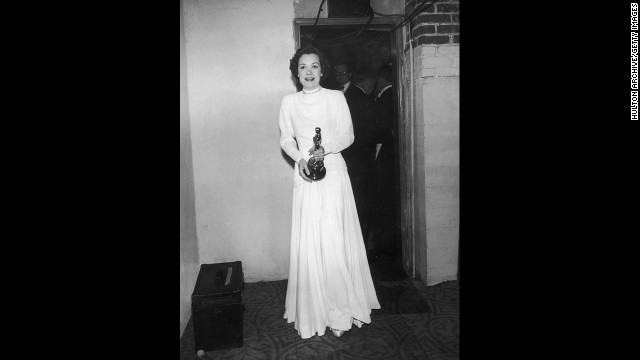 Jane Wyman stands by a doorway backstage at the Academy Awards. She won her best actress Oscar for the film "Johnny Belinda."
Jane Wyman stands by a doorway backstage at the Academy Awards. She won her best actress Oscar for the film "Johnny Belinda." 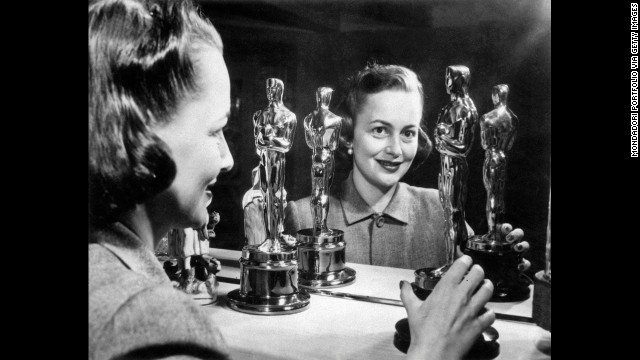 Olivia de Havilland looks at her two best actress Oscars. She won her second in 1950 for her role in "The Heiress."
Olivia de Havilland looks at her two best actress Oscars. She won her second in 1950 for her role in "The Heiress." 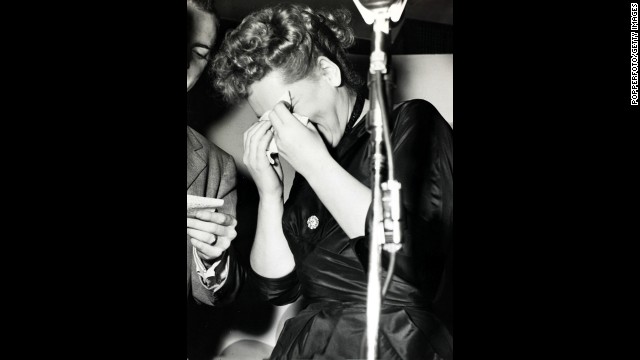 Judy Holliday bursts into tears in 1951 after winning the best actress Oscar for her performance in "Born Yesterday."
Judy Holliday bursts into tears in 1951 after winning the best actress Oscar for her performance in "Born Yesterday." 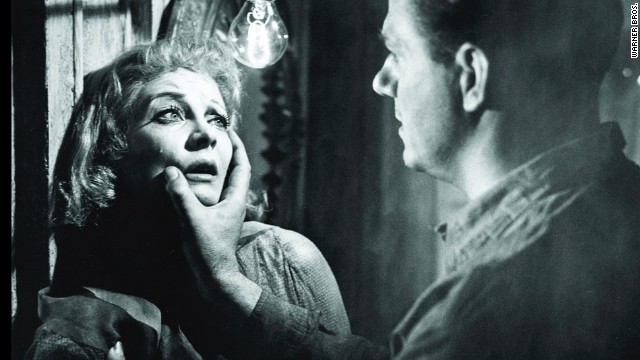 Vivien Leigh appears with Karl Malden in "A Streetcar Named Desire." Her performance in the film earned her a second Oscar.
Vivien Leigh appears with Karl Malden in "A Streetcar Named Desire." Her performance in the film earned her a second Oscar. 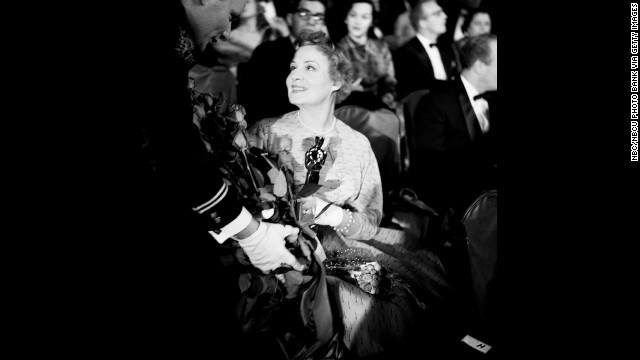 Shirley Booth wins the best actress Oscar for "Come Back, Little Sheba" in 1953.
Shirley Booth wins the best actress Oscar for "Come Back, Little Sheba" in 1953. 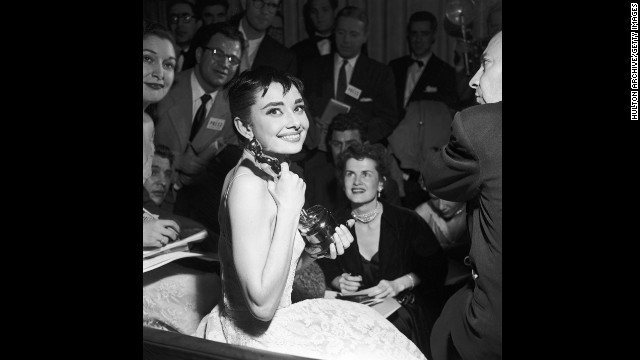 Audrey Hepburn is surrounded by reporters as she holds her best actress Oscar for "Roman Holiday."
Audrey Hepburn is surrounded by reporters as she holds her best actress Oscar for "Roman Holiday." 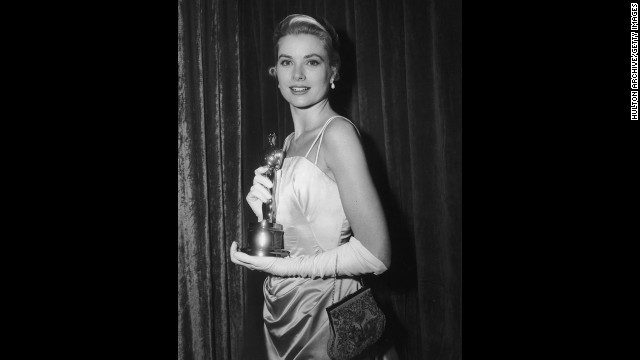 Grace Kelly poses with her Oscar after the Academy Awards ceremony in 1955. She won the statuette for her role in "The Country Girl."
Grace Kelly poses with her Oscar after the Academy Awards ceremony in 1955. She won the statuette for her role in "The Country Girl." 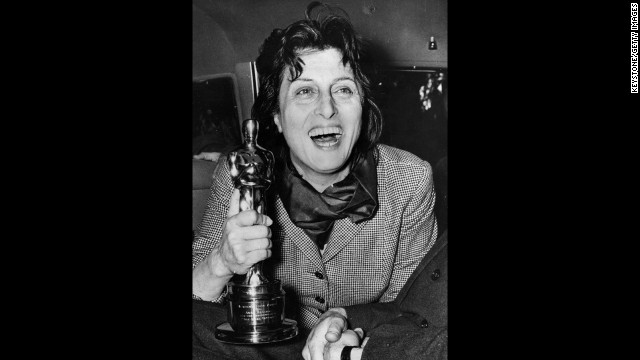 Anna Magnani enthusiastically holds the Oscar she won for "Rose Tattoo." The award was presented to her by U.S. Ambassador Clare Luce at the Villa Taverna in Rome.
Anna Magnani enthusiastically holds the Oscar she won for "Rose Tattoo." The award was presented to her by U.S. Ambassador Clare Luce at the Villa Taverna in Rome. 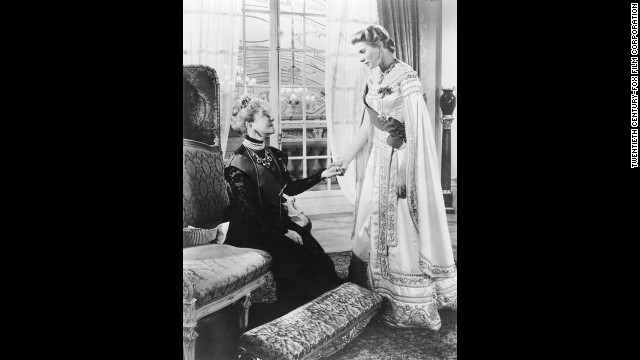 Ingrid Bergman, right, appears with Helen Hayes in a scene from the movie "Anastasia." Her performance earned her a second Oscar for best actress.
Ingrid Bergman, right, appears with Helen Hayes in a scene from the movie "Anastasia." Her performance earned her a second Oscar for best actress. 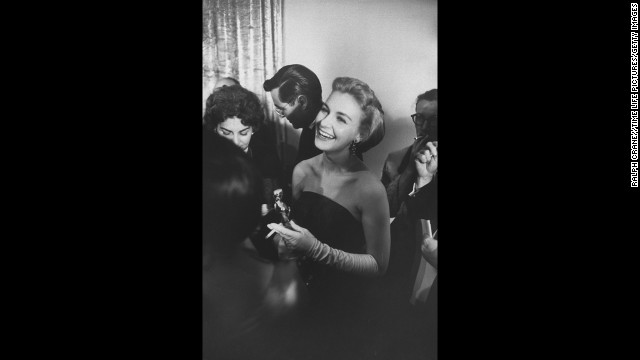 Joanne Woodward smiles while holding her best actress Oscar (and a cigarette). She received the award for her role in the film "Three Faces of Eve."
Joanne Woodward smiles while holding her best actress Oscar (and a cigarette). She received the award for her role in the film "Three Faces of Eve." 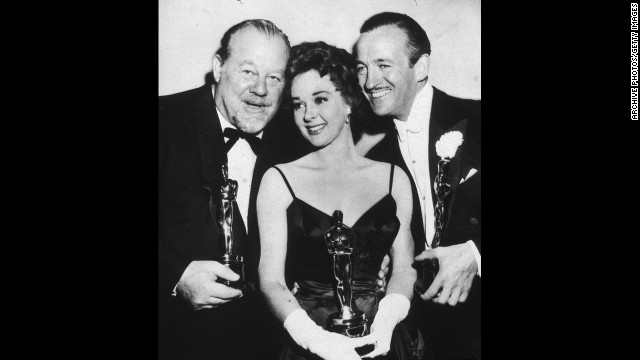 From left, actor Burl Ives, actress Susan Hayward and actor David Niven pose with their Oscars in 1959. Hayward won for her role in "I Want to Live!"
From left, actor Burl Ives, actress Susan Hayward and actor David Niven pose with their Oscars in 1959. Hayward won for her role in "I Want to Live!" 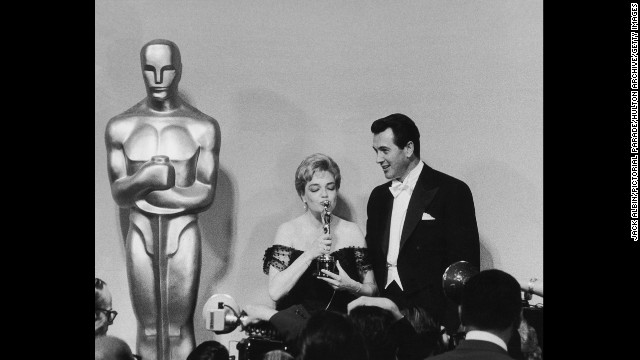 Actress Simone Signoret, seen here next to actor Rock Hudson at the Academy Awards ceremony in 1960, won the best actress Oscar for her role in "Room at the Top."
Actress Simone Signoret, seen here next to actor Rock Hudson at the Academy Awards ceremony in 1960, won the best actress Oscar for her role in "Room at the Top." 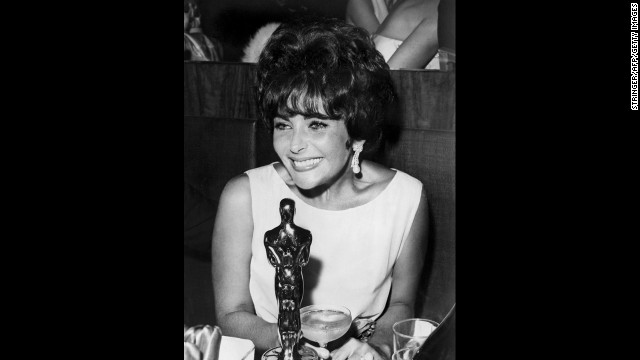 Elizabeth Taylor is seen with her Oscar after being named best actress for her part in "Butterfield 8."
Elizabeth Taylor is seen with her Oscar after being named best actress for her part in "Butterfield 8." 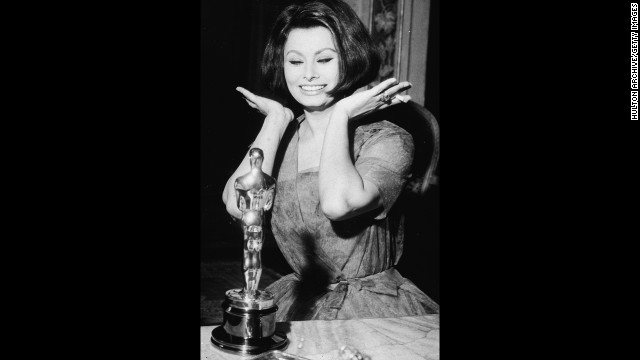 Sophia Loren reacts after winning best actress for the film "La Ciociara."
Sophia Loren reacts after winning best actress for the film "La Ciociara." 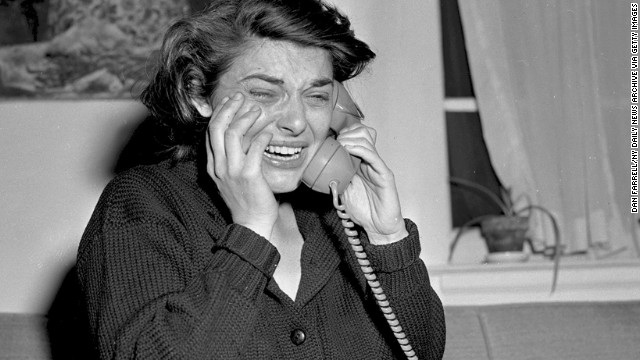 Anne Bancroft cries in her New York apartment as she accepts a congratulatory phone call following her win for "The Miracle Worker."
Anne Bancroft cries in her New York apartment as she accepts a congratulatory phone call following her win for "The Miracle Worker." 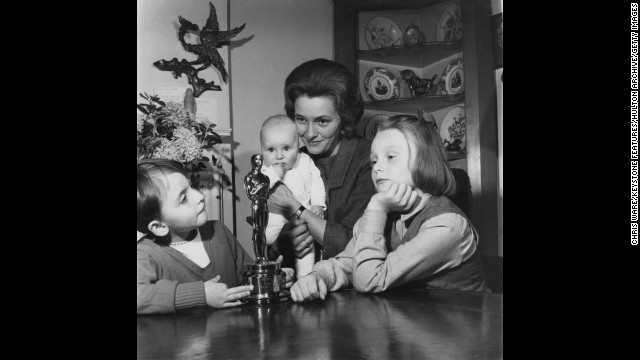 Patricia Neal and her three children look at her Oscar statuette, which she won in 1964 for her role in "Hud."
Patricia Neal and her three children look at her Oscar statuette, which she won in 1964 for her role in "Hud." 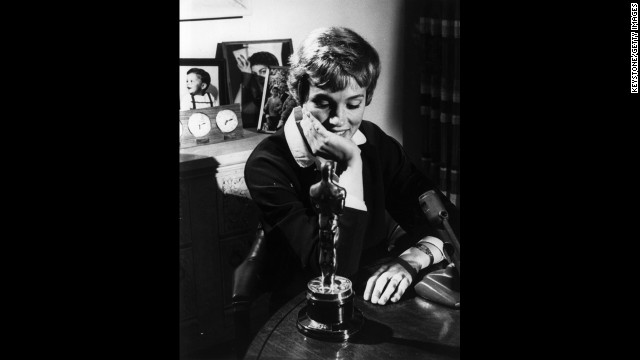 Julie Andrews looks at the Academy Award she won for "Mary Poppins'" in 1965. The role was her film debut.
Julie Andrews looks at the Academy Award she won for "Mary Poppins'" in 1965. The role was her film debut. 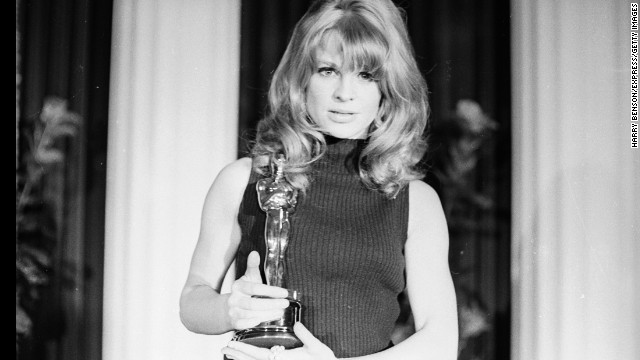 Julie Christie is seen with her Academy Award, which she won for her role in "Darling."
Julie Christie is seen with her Academy Award, which she won for her role in "Darling." 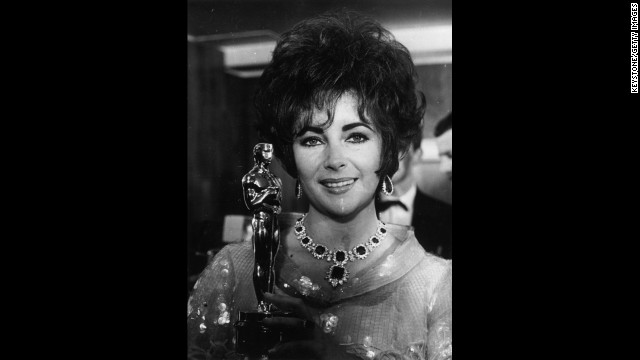 Elizabeth Taylor holds up her second Oscar, this one for the film "Who's Afraid of Virginia Woolf."
Elizabeth Taylor holds up her second Oscar, this one for the film "Who's Afraid of Virginia Woolf." 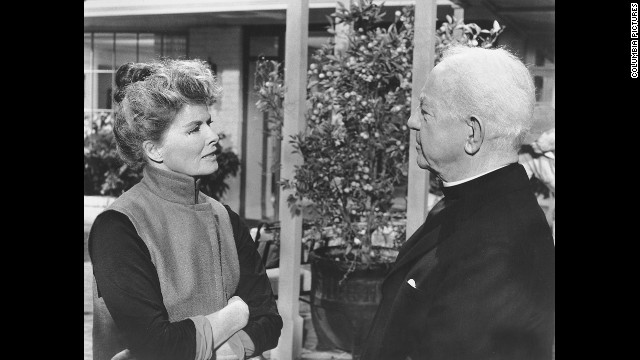 Katharine Hepburn and Cecil Kellaway appear in a scene from "Guess Who's Coming to Dinner." Hepburn won her second Oscar more than 30 years after her first.
Katharine Hepburn and Cecil Kellaway appear in a scene from "Guess Who's Coming to Dinner." Hepburn won her second Oscar more than 30 years after her first. 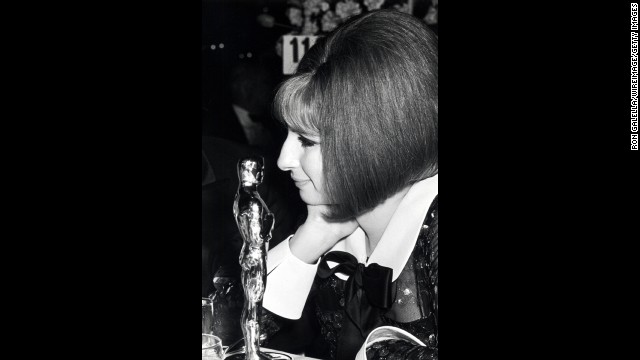 Barbra Streisand gazes at the best actress statuette she won for "Funny Girl." There was a tie for the award in 1969, with the other winner being Katharine Hepburn.
Barbra Streisand gazes at the best actress statuette she won for "Funny Girl." There was a tie for the award in 1969, with the other winner being Katharine Hepburn. 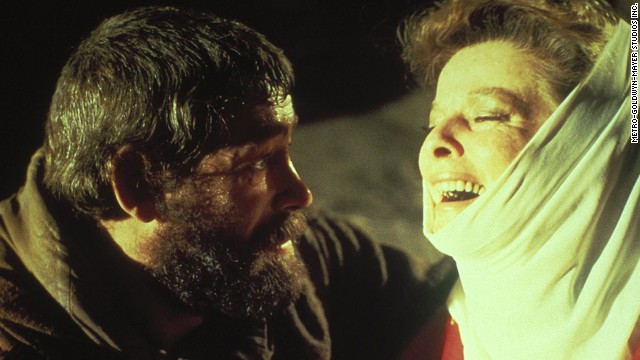 Katharine Hepburn and Peter O'Toole appear in "The Lion in Winter." The film earned Hepburn her third Oscar for best actress.
Katharine Hepburn and Peter O'Toole appear in "The Lion in Winter." The film earned Hepburn her third Oscar for best actress. 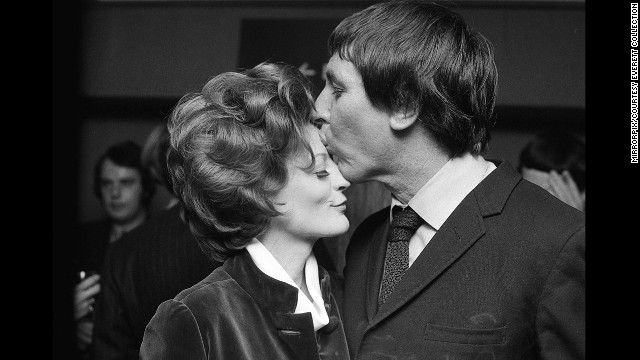 Maggie Smith, who won for "The Prime of Miss Jean Brodie," celebrates with her husband at the time, Robert Stephens.
Maggie Smith, who won for "The Prime of Miss Jean Brodie," celebrates with her husband at the time, Robert Stephens. 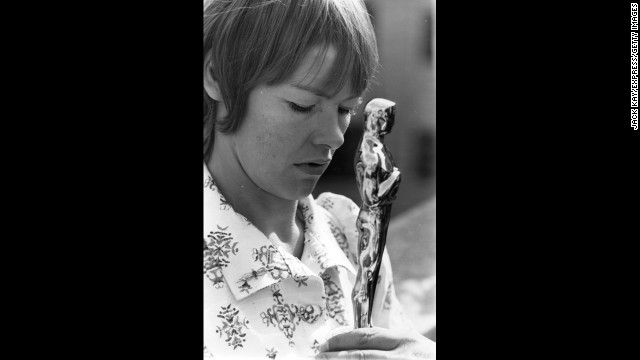 Glenda Jackson won the best actress Oscar for her part in "Women In Love."
Glenda Jackson won the best actress Oscar for her part in "Women In Love." 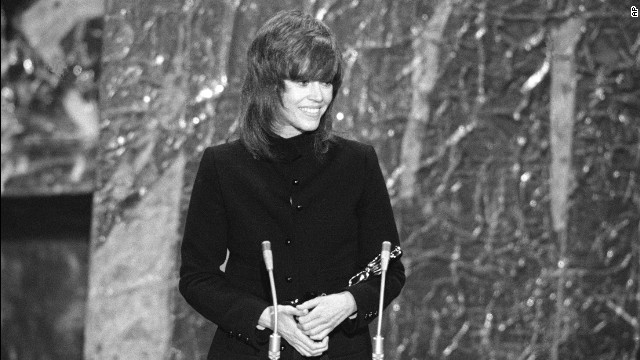 Jane Fonda cradles the best actress Oscar she received for "Klute."
Jane Fonda cradles the best actress Oscar she received for "Klute." 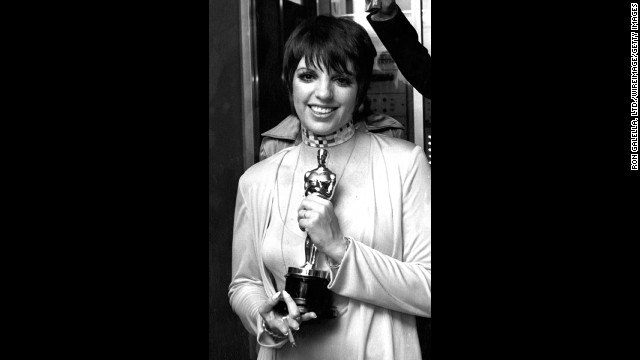 Liza Minnelli holds the Oscar she won for "Cabaret."
Liza Minnelli holds the Oscar she won for "Cabaret." 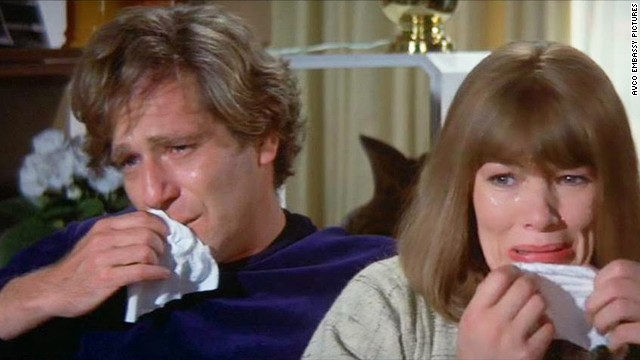 George Segal and Glenda Jackson appear in a scene from "A Touch of Class," which snagged Jackson the best actress Oscar in 1974.
George Segal and Glenda Jackson appear in a scene from "A Touch of Class," which snagged Jackson the best actress Oscar in 1974. 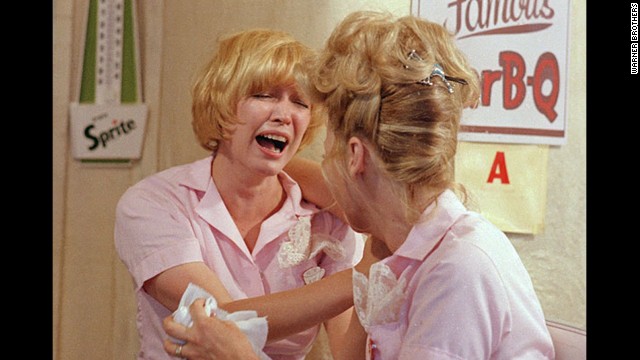 Ellen Burstyn, left, appears in "Alice Doesn't Live Here Anymore," which won her the best actress Oscar in 1975.
Ellen Burstyn, left, appears in "Alice Doesn't Live Here Anymore," which won her the best actress Oscar in 1975. 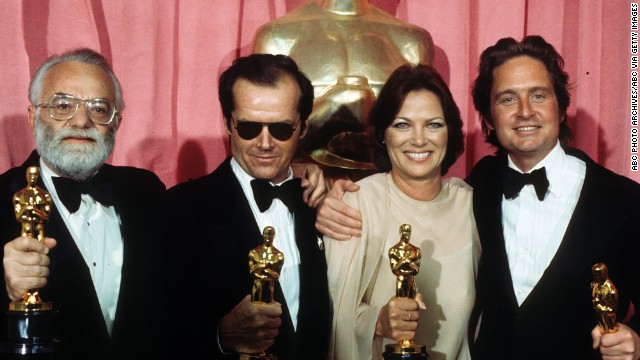 From left, producer Saul Zaentz, actor Jack Nicholson, actress Louise Fletcher and producer Michael Douglas pose with their Oscars at the 1976 Academy Awards ceremony. They all won for the film "One Flew Over the Cuckoo's Nest," which swept the major categories that year.
From left, producer Saul Zaentz, actor Jack Nicholson, actress Louise Fletcher and producer Michael Douglas pose with their Oscars at the 1976 Academy Awards ceremony. They all won for the film "One Flew Over the Cuckoo's Nest," which swept the major categories that year. 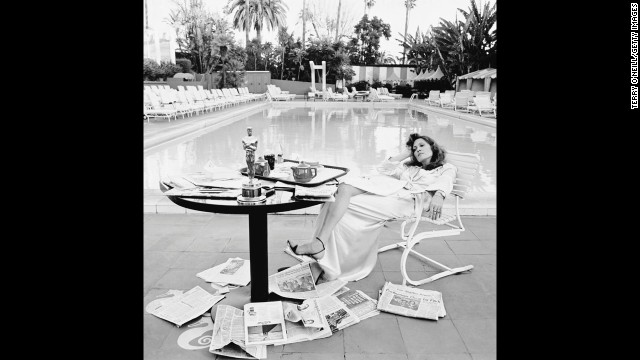 Faye Dunaway rests by the Beverly Hills Hotel swimming pool the morning after she received the best actress Oscar for "Network."
Faye Dunaway rests by the Beverly Hills Hotel swimming pool the morning after she received the best actress Oscar for "Network." 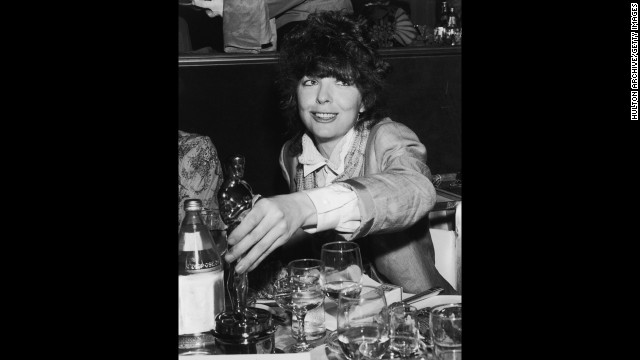 Diane Keaton places her Oscar on a restaurant table after the Academy Awards ceremony in 1978. She received the award for her role in "Annie Hall."
Diane Keaton places her Oscar on a restaurant table after the Academy Awards ceremony in 1978. She received the award for her role in "Annie Hall." 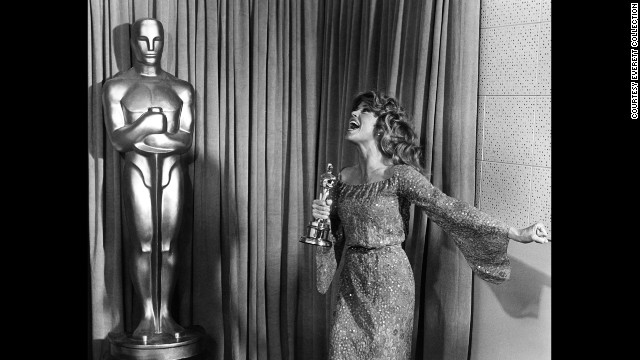 Jane Fonda is ecstatic about winning her second Academy Award, this one for "Coming Home."
Jane Fonda is ecstatic about winning her second Academy Award, this one for "Coming Home." 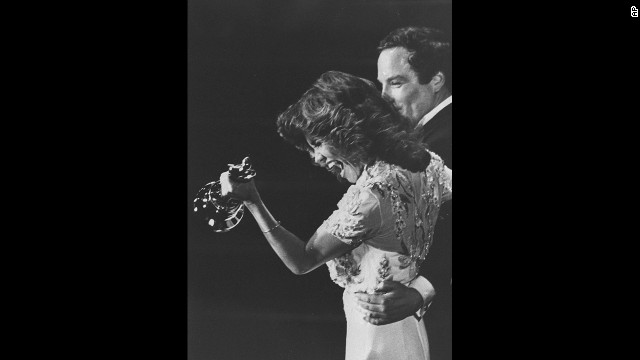 Sally Field accepts the best actress Oscar for her role in "Norma Rae."
Sally Field accepts the best actress Oscar for her role in "Norma Rae." 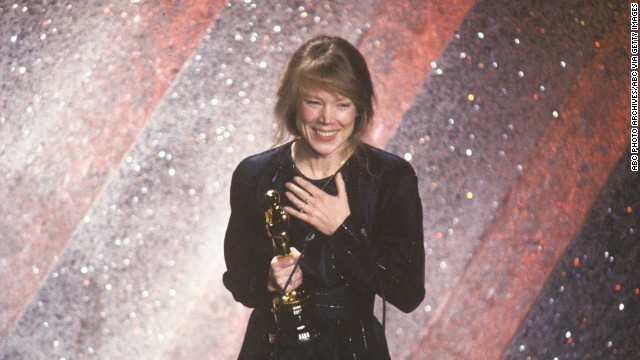 Sissy Spacek accepts the best actress Oscar for her role in the film "Coal Miner's Daughter."
Sissy Spacek accepts the best actress Oscar for her role in the film "Coal Miner's Daughter." 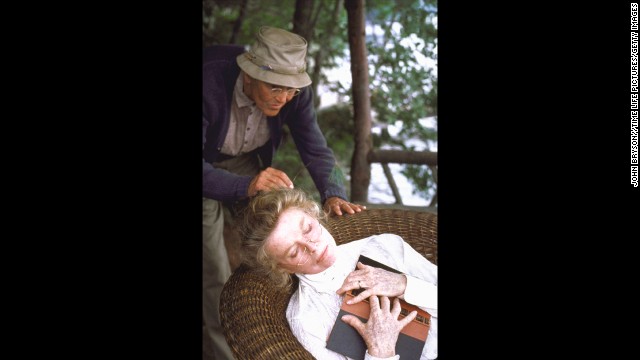 Henry Fonda and Katharine Hepburn appear in a scene from "On Golden Pond," which won Hepburn her fourth Oscar for best actress.
Henry Fonda and Katharine Hepburn appear in a scene from "On Golden Pond," which won Hepburn her fourth Oscar for best actress. 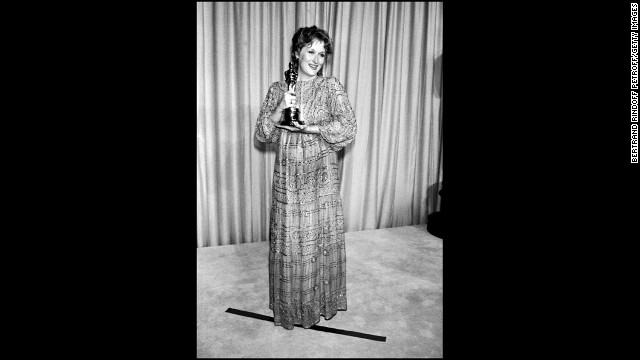 Meryl Streep holds her best actress Oscar for "Sophie's Choice."
Meryl Streep holds her best actress Oscar for "Sophie's Choice." 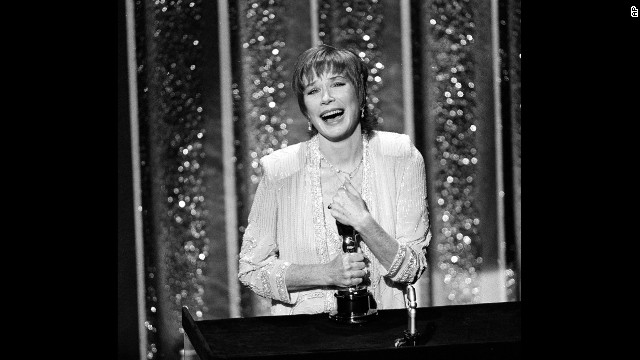 Shirley MacLaine accepts her Oscar in 1984. She won for her performance in "Terms of Endearment."
Shirley MacLaine accepts her Oscar in 1984. She won for her performance in "Terms of Endearment." 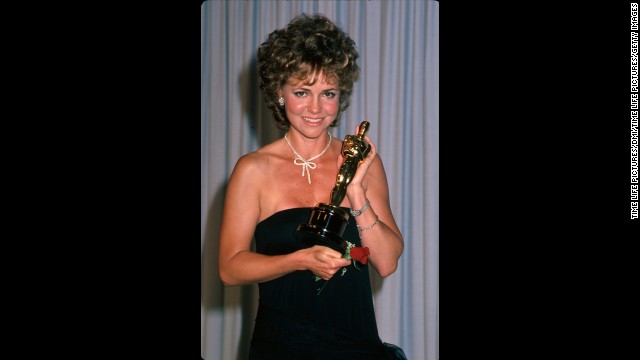 Sally Field holds the best actress Oscar in the press room at the Academy Awards. She won the award, her second, for her role in "Places in the Heart."
Sally Field holds the best actress Oscar in the press room at the Academy Awards. She won the award, her second, for her role in "Places in the Heart." 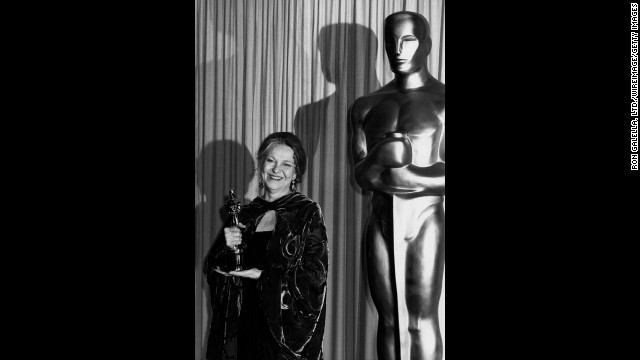 Geraldine Page wins best actress for "The Trip to Bountiful."
Geraldine Page wins best actress for "The Trip to Bountiful." 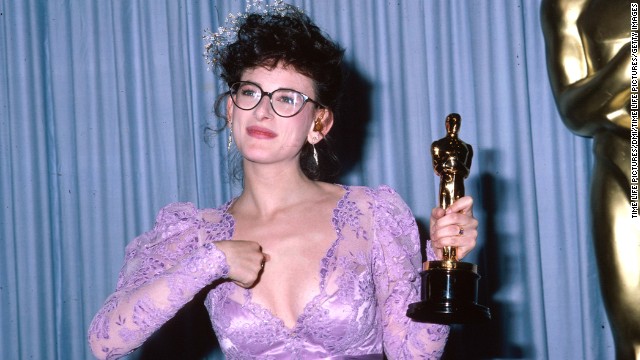 Hearing-impaired actress Marlee Matlin uses sign language while holding the Academy Award she won for "Children of a Lesser God."
Hearing-impaired actress Marlee Matlin uses sign language while holding the Academy Award she won for "Children of a Lesser God." 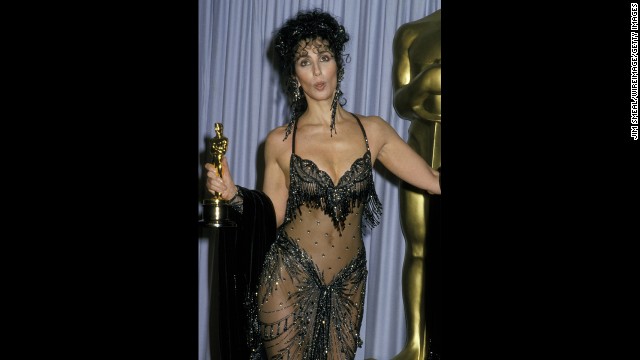 Cher wears that dress in 1988, when she won the Academy Award for "Moonstruck."
Cher wears that dress in 1988, when she won the Academy Award for "Moonstruck." 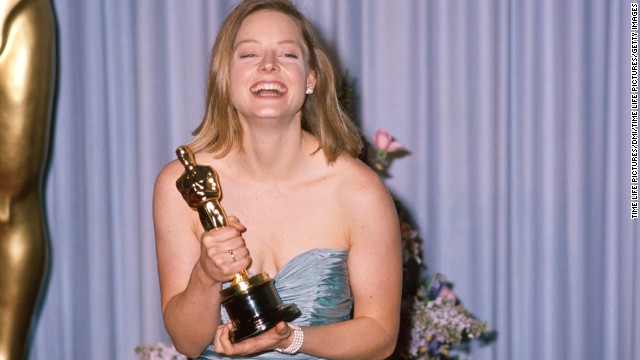 Jodie Foster holds her Oscar in the press room after winning for her role in "The Accused."
Jodie Foster holds her Oscar in the press room after winning for her role in "The Accused." 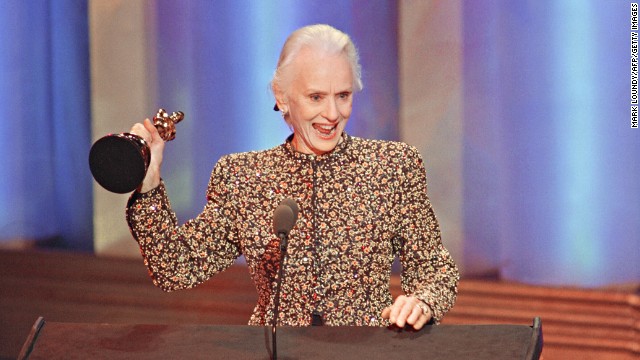 Jessica Tandy acknowledges applause after receiving the Oscar for her role in "Driving Miss Daisy."
Jessica Tandy acknowledges applause after receiving the Oscar for her role in "Driving Miss Daisy." 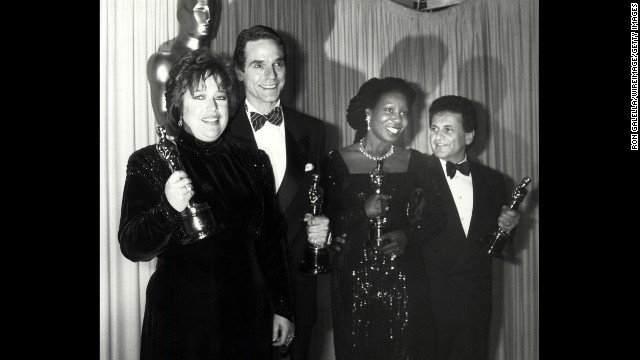 Kathy Bates, far left, clutches the best actress award for her role in "Misery." To her left are fellow Oscar winners Jeremy Irons, Whoopi Goldberg and Joe Pesci.
Kathy Bates, far left, clutches the best actress award for her role in "Misery." To her left are fellow Oscar winners Jeremy Irons, Whoopi Goldberg and Joe Pesci. 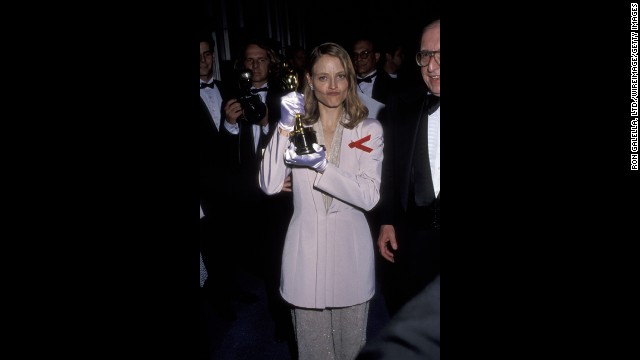 Jodie Foster holds up her second Oscar, this one for her role in "The Silence of the Lambs."
Jodie Foster holds up her second Oscar, this one for her role in "The Silence of the Lambs." 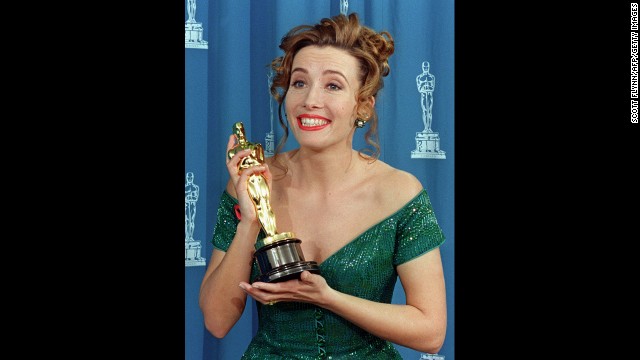 Emma Thompson poses with her Oscar after winning best actress for her role in "Howards End."
Emma Thompson poses with her Oscar after winning best actress for her role in "Howards End." 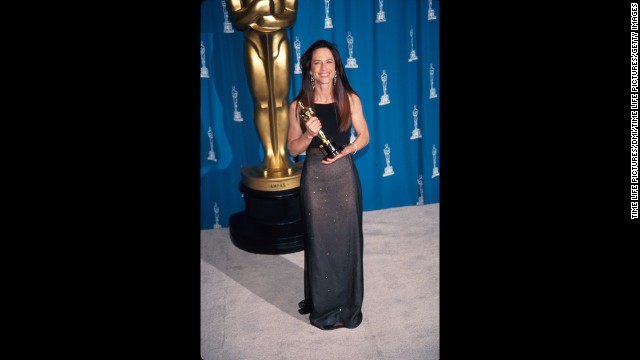 Holly Hunter poses in the press room after being awarded the best actress Oscar for her performance in "The Piano."
Holly Hunter poses in the press room after being awarded the best actress Oscar for her performance in "The Piano." 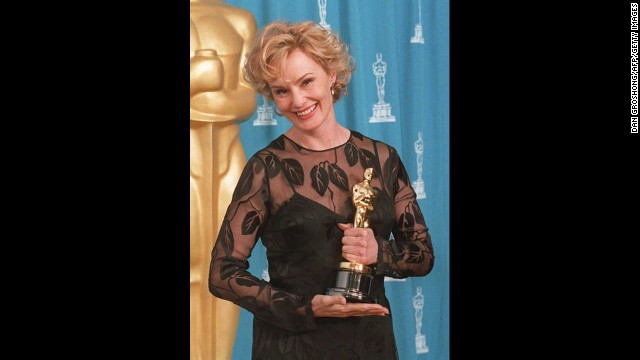 Jessica Lange holds the Oscar she won for her role in the film "Blue Sky."
Jessica Lange holds the Oscar she won for her role in the film "Blue Sky." 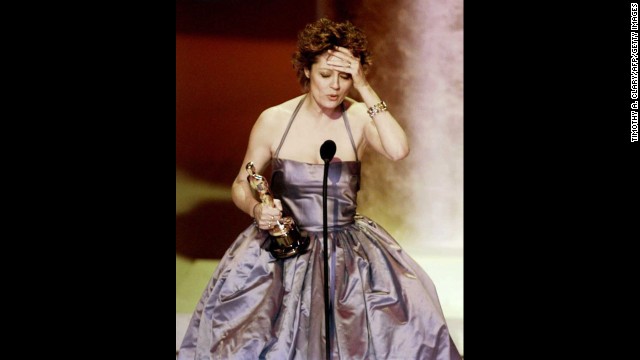 Susan Sarandon accepts the Oscar for her role in "Dead Man Walking."
Susan Sarandon accepts the Oscar for her role in "Dead Man Walking." 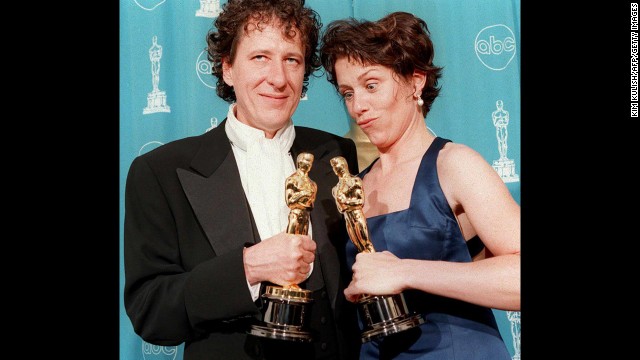 Frances McDormand, who won best actress for her role in "Fargo," poses with Geoffrey Rush, who won best actor that year.
Frances McDormand, who won best actress for her role in "Fargo," poses with Geoffrey Rush, who won best actor that year. 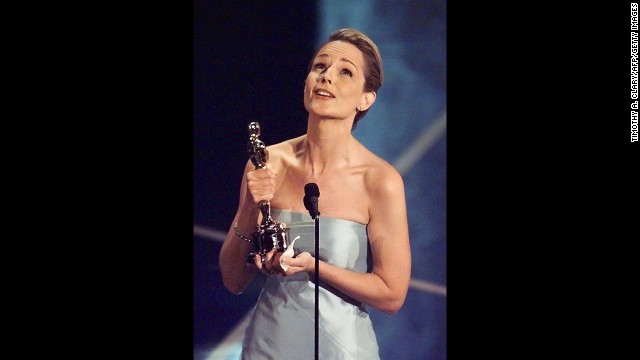 Helen Hunt holds her Oscar after winning for "As Good As It Gets."
Helen Hunt holds her Oscar after winning for "As Good As It Gets." 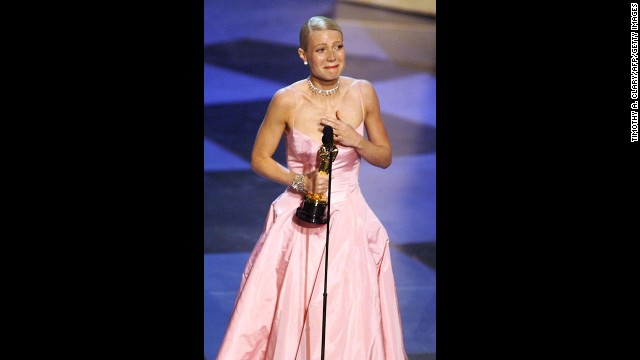 Gwyneth Paltrow cries as she receives the best actress Oscar for "Shakespeare in Love."
Gwyneth Paltrow cries as she receives the best actress Oscar for "Shakespeare in Love." 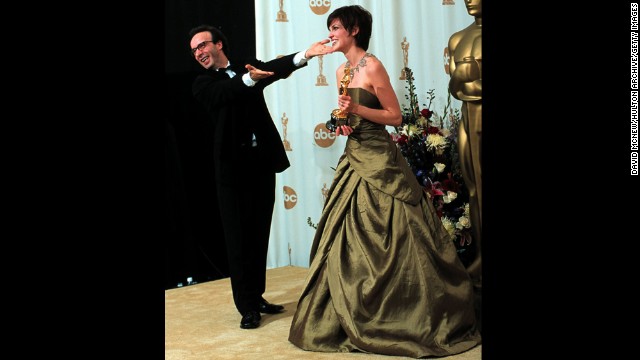 Actor Roberto Benigni presents Hilary Swank, who won the best actress Oscar for the film "Boys Don't Cry."
Actor Roberto Benigni presents Hilary Swank, who won the best actress Oscar for the film "Boys Don't Cry." 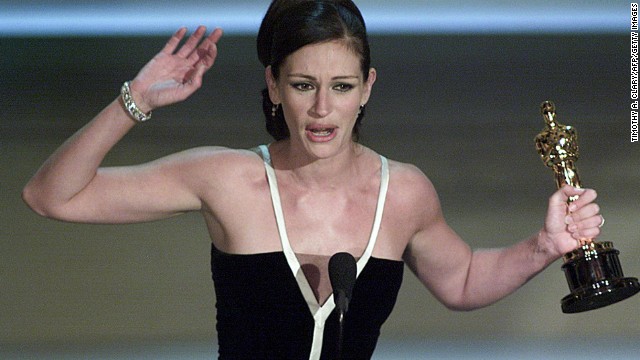 Julia Roberts holds her Oscar for her role in "Erin Brockovich."
Julia Roberts holds her Oscar for her role in "Erin Brockovich." 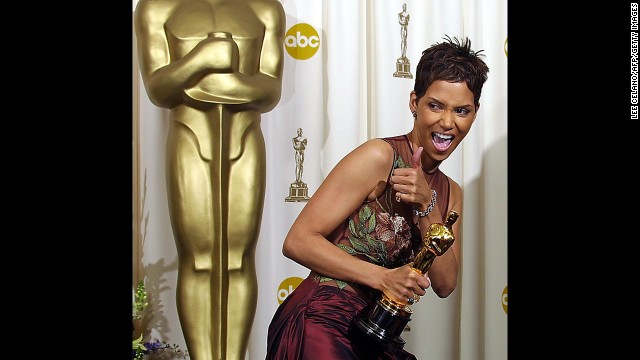 Halle Berry celebrates as she holds her Oscar for "Monster's Ball." Berry is the only African-American to win the Oscar for best actress.
Halle Berry celebrates as she holds her Oscar for "Monster's Ball." Berry is the only African-American to win the Oscar for best actress. 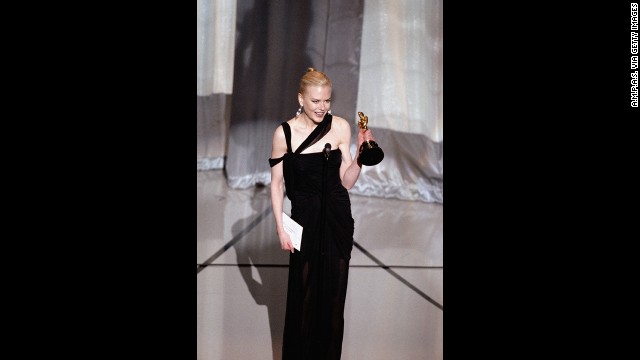 Nicole Kidman accepts her award for her role in "The Hours."
Nicole Kidman accepts her award for her role in "The Hours." 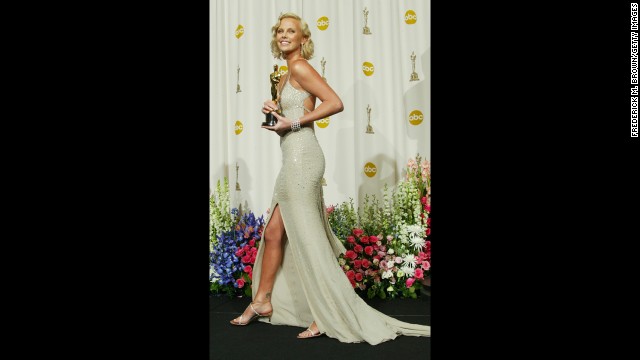 Charlize Theron poses with her Oscar after winning for the film "Monster."
Charlize Theron poses with her Oscar after winning for the film "Monster." 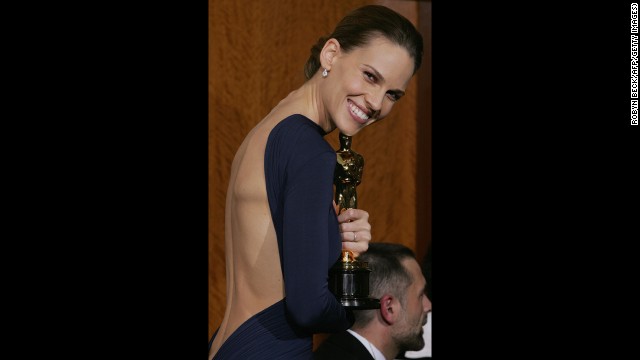 Hilary Swank grabbed her second Academy Award in 2005 for the film "Million Dollar Baby."
Hilary Swank grabbed her second Academy Award in 2005 for the film "Million Dollar Baby." 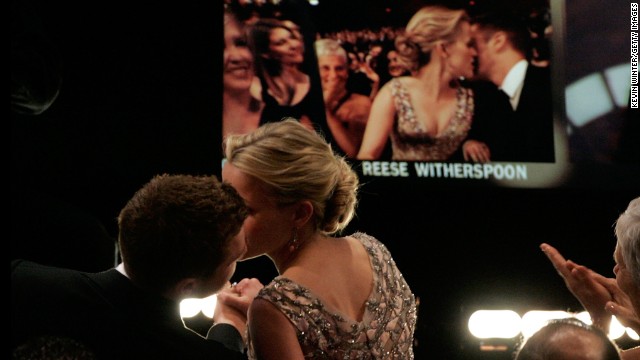 Reese Witherspoon kisses then-husband Ryan Phillippe before going on stage to accept the best actress award for "Walk the Line."
Reese Witherspoon kisses then-husband Ryan Phillippe before going on stage to accept the best actress award for "Walk the Line." 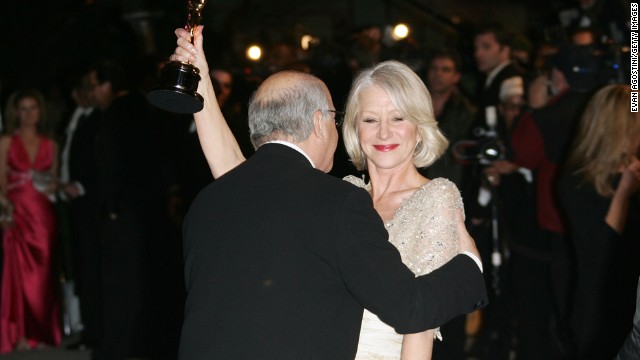 Director Taylor Hackford kisses his wife, Helen Mirren, after Mirren won the best actress Oscar for her role in "The Queen."
Director Taylor Hackford kisses his wife, Helen Mirren, after Mirren won the best actress Oscar for her role in "The Queen." 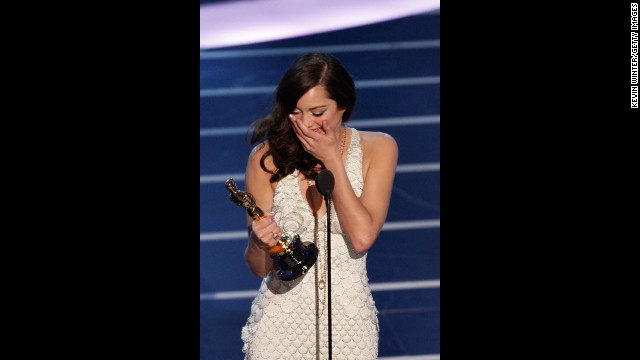 Marion Cotillard accepts the Oscar for her role in "La Vie en Rose."
Marion Cotillard accepts the Oscar for her role in "La Vie en Rose." 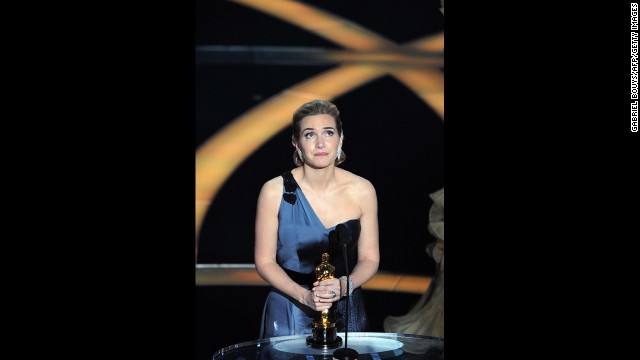 Kate Winslet reacts after winning the best actress Oscar for "The Reader."
Kate Winslet reacts after winning the best actress Oscar for "The Reader." 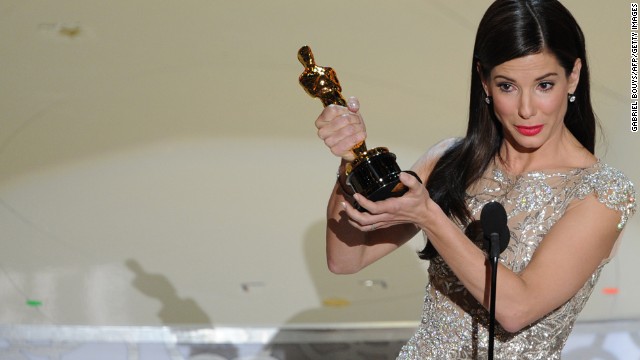 Best actress Sandra Bullock gives her acceptance speech after winning for "The Blind Side."
Best actress Sandra Bullock gives her acceptance speech after winning for "The Blind Side." 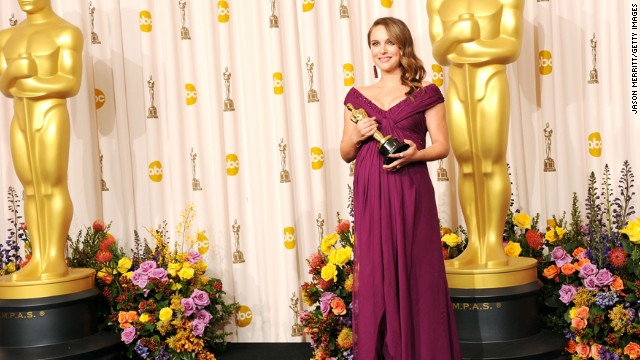 Natalie Portman poses in the press room after winning the best actress Oscar for "Black Swan."
Natalie Portman poses in the press room after winning the best actress Oscar for "Black Swan." 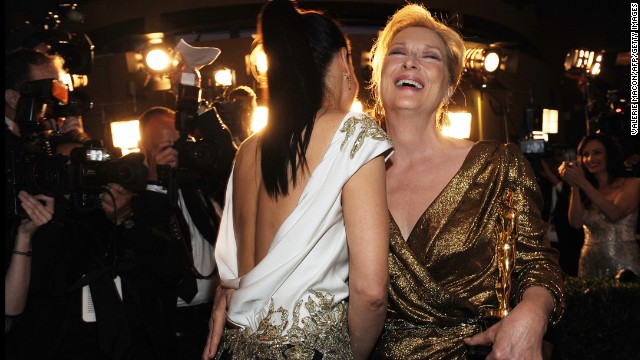 Meryl Streep, right, laughs with Sandra Bullock after Streep's win for her role in "The Iron Lady."
Meryl Streep, right, laughs with Sandra Bullock after Streep's win for her role in "The Iron Lady." 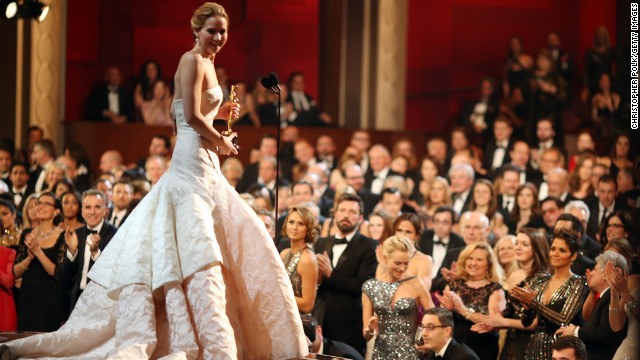 Jennifer Lawrence charms the audience in 2013 as she accepts the best actress Oscar for her performance in "Silver Linings Playbook." A history of Oscar-winning best actresses Janet Gaynor (1929) Mary Pickford (April 1930) Norma Shearer (October 1930) Marie Dressler (1931) Helen Hayes (1932) Katharine Hepburn (1934) Claudette Colbert (1935) Bette Davis (1936) Luise Rainer (1937) Luise Rainer (1938) Bette Davis (1939) Vivien Leigh (1940) Ginger Rogers (1941) Joan Fontaine (1942) Greer Garson (1943) Jennifer Jones (1944) Ingrid Bergman (1945) Joan Crawford (1946) Olivia de Havilland (1947) Loretta Young (1948) Jane Wyman (1949) Olivia de Havilland (1950) Judy Holliday (1951) Vivien Leigh (1952) Shirley Booth (1953) Audrey Hepburn (1954) Grace Kelly (1955) Anna Magnani (1956) Ingrid Bergman (1957) Joanne Woodward (1958) Susan Hayward (1959) Simone Signoret (1960) Elizabeth Taylor (1961) Sophia Loren (1962) Anne Bancroft (1963) Patricia Neal (1964) Julie Andrews (1965) Julie Christie (1966) Elizabeth Taylor (1967) Katharine Hepburn (1968) Barbra Streisand (1969) Katharine Hepburn (1969) Maggie Smith (1970) Glenda Jackson (1971) Jane Fonda (1972) Liza Minnelli (1973) Glenda Jackson (1974) Ellen Burstyn (1975) Louise Fletcher (1976) Faye Dunaway (1977) Diane Keaton (1978) Jane Fonda (1979) Sally Field (1980) Sissy Spacek (1981) Katharine Hepburn (1982) Meryl Streep (1983) Shirley MacLaine (1984) Sally Field (1985) Geraldine Page (1986) Marlee Matlin (1987) Cher (1988) Jodie Foster (1989) Jessica Tandy (1990) Kathy Bates (1991) Jodie Foster (1992) Emma Thompson (1993) Holly Hunter (1994) Jessica Lange (1995) Susan Sarandon (1996) Frances McDormand (1997) Helen Hunt (1998) Gwyneth Paltrow (1999) Hilary Swank (2000) Julia Roberts (2001) Halle Berry (2002) Nicole Kidman (2003) Charlize Theron (2004) Hilary Swank (2005) Reese Witherspoon (2006) Helen Mirren (2007) Marion Cotillard (2008) Kate Winslet (2009) Sandra Bullock (2010) Natalie Portman (2011) Meryl Streep (2012) Jennifer Lawrence (2013) HIDE CAPTION << <
Jennifer Lawrence charms the audience in 2013 as she accepts the best actress Oscar for her performance in "Silver Linings Playbook." A history of Oscar-winning best actresses Janet Gaynor (1929) Mary Pickford (April 1930) Norma Shearer (October 1930) Marie Dressler (1931) Helen Hayes (1932) Katharine Hepburn (1934) Claudette Colbert (1935) Bette Davis (1936) Luise Rainer (1937) Luise Rainer (1938) Bette Davis (1939) Vivien Leigh (1940) Ginger Rogers (1941) Joan Fontaine (1942) Greer Garson (1943) Jennifer Jones (1944) Ingrid Bergman (1945) Joan Crawford (1946) Olivia de Havilland (1947) Loretta Young (1948) Jane Wyman (1949) Olivia de Havilland (1950) Judy Holliday (1951) Vivien Leigh (1952) Shirley Booth (1953) Audrey Hepburn (1954) Grace Kelly (1955) Anna Magnani (1956) Ingrid Bergman (1957) Joanne Woodward (1958) Susan Hayward (1959) Simone Signoret (1960) Elizabeth Taylor (1961) Sophia Loren (1962) Anne Bancroft (1963) Patricia Neal (1964) Julie Andrews (1965) Julie Christie (1966) Elizabeth Taylor (1967) Katharine Hepburn (1968) Barbra Streisand (1969) Katharine Hepburn (1969) Maggie Smith (1970) Glenda Jackson (1971) Jane Fonda (1972) Liza Minnelli (1973) Glenda Jackson (1974) Ellen Burstyn (1975) Louise Fletcher (1976) Faye Dunaway (1977) Diane Keaton (1978) Jane Fonda (1979) Sally Field (1980) Sissy Spacek (1981) Katharine Hepburn (1982) Meryl Streep (1983) Shirley MacLaine (1984) Sally Field (1985) Geraldine Page (1986) Marlee Matlin (1987) Cher (1988) Jodie Foster (1989) Jessica Tandy (1990) Kathy Bates (1991) Jodie Foster (1992) Emma Thompson (1993) Holly Hunter (1994) Jessica Lange (1995) Susan Sarandon (1996) Frances McDormand (1997) Helen Hunt (1998) Gwyneth Paltrow (1999) Hilary Swank (2000) Julia Roberts (2001) Halle Berry (2002) Nicole Kidman (2003) Charlize Theron (2004) Hilary Swank (2005) Reese Witherspoon (2006) Helen Mirren (2007) Marion Cotillard (2008) Kate Winslet (2009) Sandra Bullock (2010) Natalie Portman (2011) Meryl Streep (2012) Jennifer Lawrence (2013) HIDE CAPTION << < 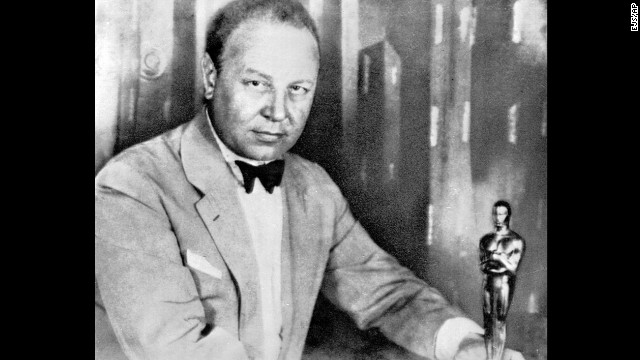 The first best actor Oscar went to Emil Jannings at the academy's inaugural ceremony held in 1929. Jannings received the honors for two films: 1927's "The Way of All Flesh" and 1928's "The Last Command."
The first best actor Oscar went to Emil Jannings at the academy's inaugural ceremony held in 1929. Jannings received the honors for two films: 1927's "The Way of All Flesh" and 1928's "The Last Command." 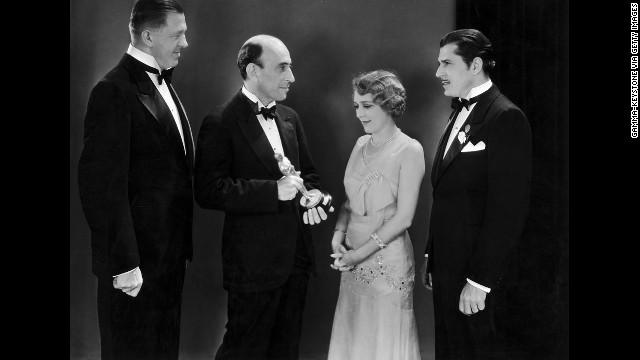 Warner Baxter, right, earned the best actor Oscar for his role as the Cisco Kid in "In Old Arizona" (1929). Baxter appears here with best actress winner Mary Pickford at the April 1930 awards ceremony, which recognized films made between August 1, 1928, and July 31, 1929. Baxter loved the role so much he reprised it twice more, in "The Cisco Kid" (1931) and again in "The Return of the Cisco Kid" (1939).
Warner Baxter, right, earned the best actor Oscar for his role as the Cisco Kid in "In Old Arizona" (1929). Baxter appears here with best actress winner Mary Pickford at the April 1930 awards ceremony, which recognized films made between August 1, 1928, and July 31, 1929. Baxter loved the role so much he reprised it twice more, in "The Cisco Kid" (1931) and again in "The Return of the Cisco Kid" (1939). 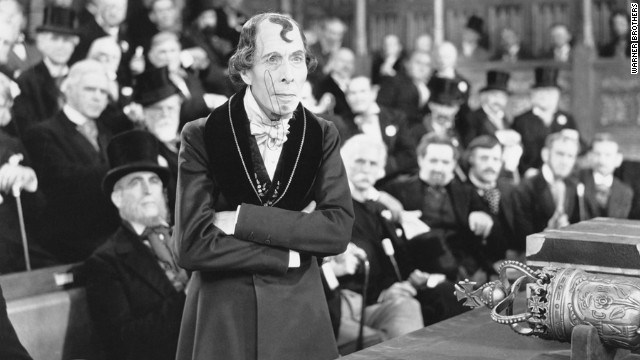 George Arliss won the best actor Oscar for "Disraeli," apparently also beating himself since he was nominated for that film and "The Green Goddess." In the early years of the Oscar, a single nomination could recognize more than one role. However, for reasons not entirely clear, the actor won solely for "Disraeli." Perhaps it was a glitch on behalf of the academy, or perhaps voters truly preferred his portrayal as the famed British prime minister. The November 1930 awards ceremony recognized work from 1929 and 1930.
George Arliss won the best actor Oscar for "Disraeli," apparently also beating himself since he was nominated for that film and "The Green Goddess." In the early years of the Oscar, a single nomination could recognize more than one role. However, for reasons not entirely clear, the actor won solely for "Disraeli." Perhaps it was a glitch on behalf of the academy, or perhaps voters truly preferred his portrayal as the famed British prime minister. The November 1930 awards ceremony recognized work from 1929 and 1930. 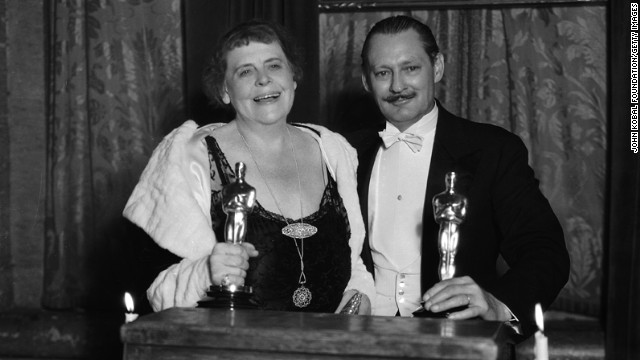 Lionel Barrymore, here with "Min and Bill" best actress winner Marie Dressler, won the best actor Oscar for his work in "A Free Soul." Barrymore played an alcoholic lawyer whose daughter gets involved with a mobster he helped go free.
Lionel Barrymore, here with "Min and Bill" best actress winner Marie Dressler, won the best actor Oscar for his work in "A Free Soul." Barrymore played an alcoholic lawyer whose daughter gets involved with a mobster he helped go free. 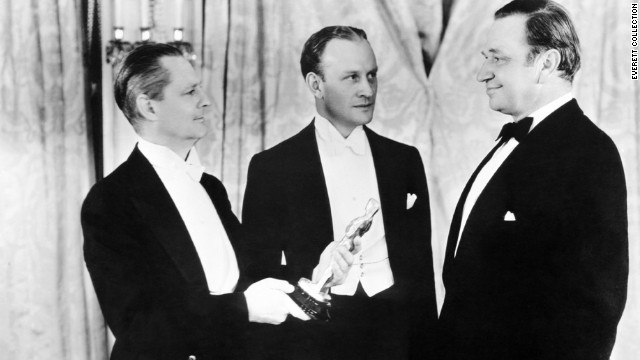 The previous year's Oscar winner Lionel Barrymore, left, presents Wallace Beery, right, with the best actor Oscar for "The Champ." Beery tied that year with Fredric March in "Dr. Jekyll and Mr. Hyde."
The previous year's Oscar winner Lionel Barrymore, left, presents Wallace Beery, right, with the best actor Oscar for "The Champ." Beery tied that year with Fredric March in "Dr. Jekyll and Mr. Hyde." 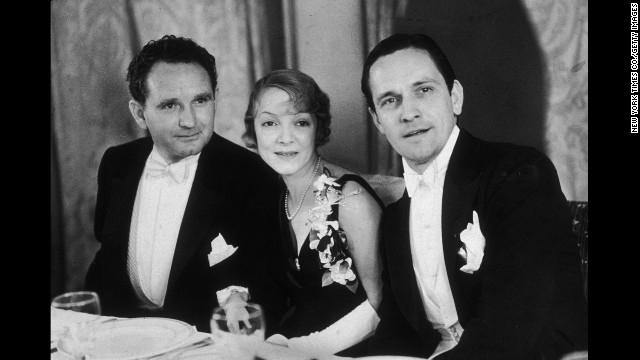 Fredric March, right, was honored the same year as Wallace Beery for "Dr. Jekyll and Mr. Hyde." Beery actually received one less vote than March, which it resulted in a tie winner according to academy rules of the day.
Fredric March, right, was honored the same year as Wallace Beery for "Dr. Jekyll and Mr. Hyde." Beery actually received one less vote than March, which it resulted in a tie winner according to academy rules of the day. 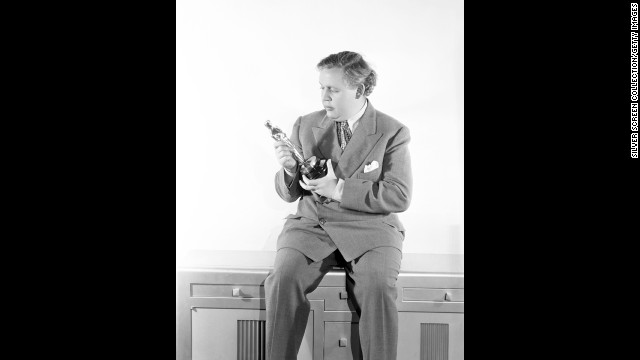 British actor Charles Laughton won the best actor Oscar for the title role "The Private Life of Henry VIII" (1933), beating out Leslie Howard in "Berkeley Square" (1933) and Paul Muni in "I Am a Fugitive From a Chain Gang" (1932). The sixth awards ceremony was held in March 1934 and recognized movies released from August 1, 1932, to December 31, 1933.
British actor Charles Laughton won the best actor Oscar for the title role "The Private Life of Henry VIII" (1933), beating out Leslie Howard in "Berkeley Square" (1933) and Paul Muni in "I Am a Fugitive From a Chain Gang" (1932). The sixth awards ceremony was held in March 1934 and recognized movies released from August 1, 1932, to December 31, 1933. 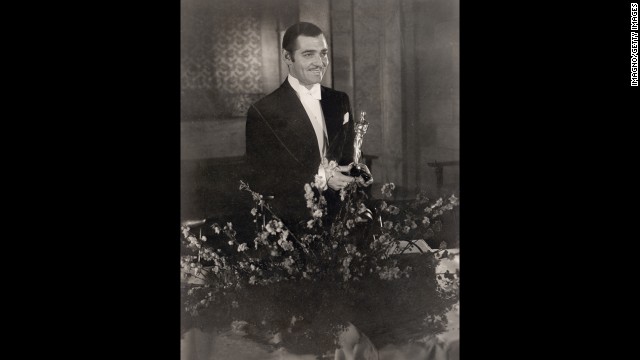 Clark Gable's status as a Hollywood icon was cemented when the box-office star won the best actor Oscar for Frank Capra's "It Happened One Night" (1934). The screwball comedy was a massive hit with academy voters at the February 1935 ceremony, sweeping the five big categories -- best picture, best director (Capra), best adapted screenplay and best actress (Claudette Colbert).
Clark Gable's status as a Hollywood icon was cemented when the box-office star won the best actor Oscar for Frank Capra's "It Happened One Night" (1934). The screwball comedy was a massive hit with academy voters at the February 1935 ceremony, sweeping the five big categories -- best picture, best director (Capra), best adapted screenplay and best actress (Claudette Colbert). 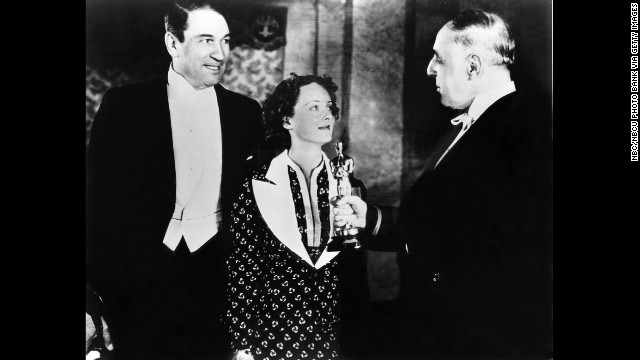 Victor McLaglen, left, beat out two earlier Oscar winners to claim the best actor prize for "The Informer." He was up against Charles Laughton and Clark Gable, both nominated for their roles in best picture winner "Mutiny on the Bounty." McLaglen appears with best actress winner Bette Davis and filmmaker D.W. Griffith of "The Birth of a Nation" fame at the March 1936 ceremony.
Victor McLaglen, left, beat out two earlier Oscar winners to claim the best actor prize for "The Informer." He was up against Charles Laughton and Clark Gable, both nominated for their roles in best picture winner "Mutiny on the Bounty." McLaglen appears with best actress winner Bette Davis and filmmaker D.W. Griffith of "The Birth of a Nation" fame at the March 1936 ceremony. 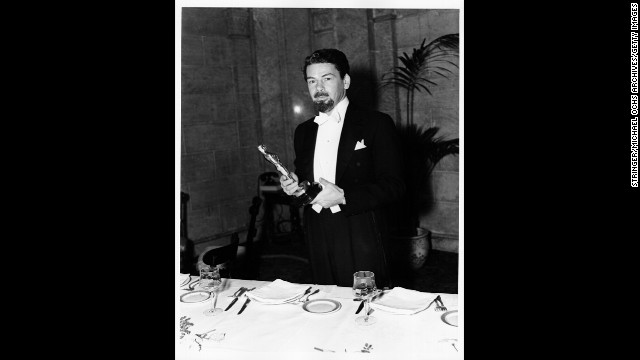 After two earlier best actor nominations, Paul Muni finally won for the title role in "The Story of Louis Pasteur," the first of several biographical films he made at Warner Bros.
After two earlier best actor nominations, Paul Muni finally won for the title role in "The Story of Louis Pasteur," the first of several biographical films he made at Warner Bros. 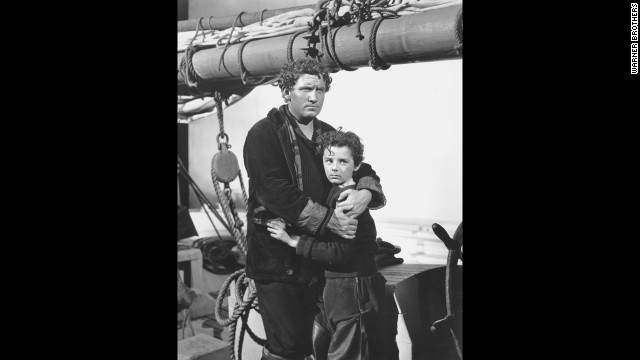 Spencer Tracy, left, with co-star Freddie Bartholomew, won his first best actor Oscar as a Portuguese fisherman in "Captains Courageous." He beat out Oscar-winning actors Fredric March in "A Star Is Born" and Paul Muni in "The Life of Emile Zola." It was Tracy's second nomination.
Spencer Tracy, left, with co-star Freddie Bartholomew, won his first best actor Oscar as a Portuguese fisherman in "Captains Courageous." He beat out Oscar-winning actors Fredric March in "A Star Is Born" and Paul Muni in "The Life of Emile Zola." It was Tracy's second nomination. 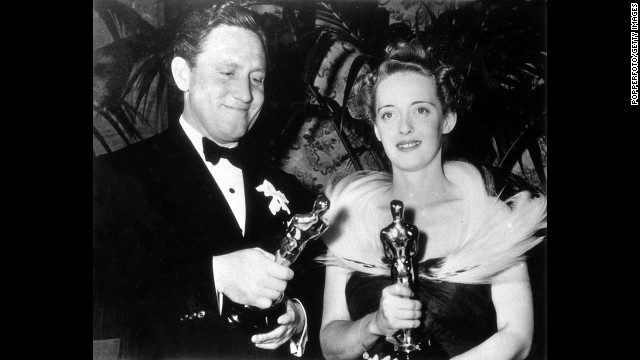 Spencer Tracy takes home his second best actor Oscar for "Boys Town." He appears here with Bette Davis, best actress for "Jezebel," at the ceremony held in 1939.
Spencer Tracy takes home his second best actor Oscar for "Boys Town." He appears here with Bette Davis, best actress for "Jezebel," at the ceremony held in 1939. 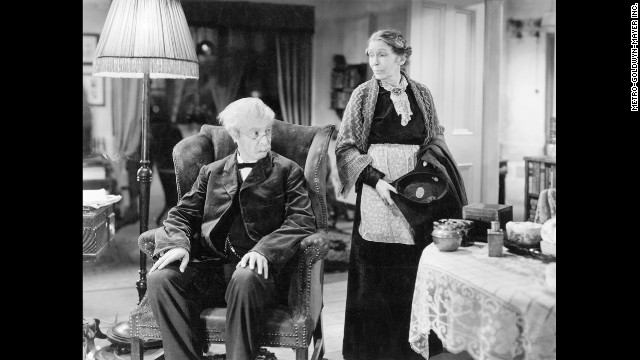 Robert Donat's Oscar win for "Goodbye, Mr. Chips" was definitely a surprise. Donat earned the honors for his title role as a schoolteacher, beating out some strong performances, including Clark Gable in "Gone With the Wind," James Stewart in "Mr. Smith Goes to Washington" and Laurence Olivier in "Wuthering Heights."
Robert Donat's Oscar win for "Goodbye, Mr. Chips" was definitely a surprise. Donat earned the honors for his title role as a schoolteacher, beating out some strong performances, including Clark Gable in "Gone With the Wind," James Stewart in "Mr. Smith Goes to Washington" and Laurence Olivier in "Wuthering Heights." 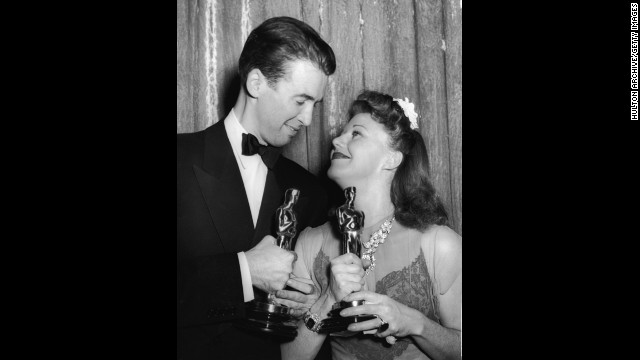 After losing the Oscar a year earlier for his iconic role in "Mr. Smith Goes to Washington," James Stewart received the award playing a reporter who falls for Katharine Hepburn in "The Philadelphia Story." Stewart and best actress winner Ginger Rogers celebrate their wins at the ceremony held in 1941.
After losing the Oscar a year earlier for his iconic role in "Mr. Smith Goes to Washington," James Stewart received the award playing a reporter who falls for Katharine Hepburn in "The Philadelphia Story." Stewart and best actress winner Ginger Rogers celebrate their wins at the ceremony held in 1941. 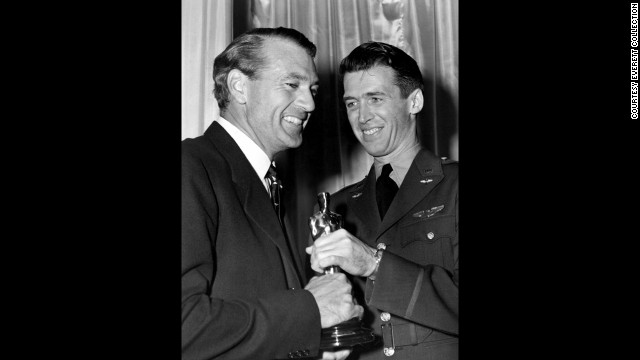 James Stewart, right, bestows pal Gary Cooper with the statuette for "Sergeant York." Cooper nabbed the win over Orson Welles, whose "Citizen Kane" also lost out on the best picture award but has become the epitome of a Hollywood classic.
James Stewart, right, bestows pal Gary Cooper with the statuette for "Sergeant York." Cooper nabbed the win over Orson Welles, whose "Citizen Kane" also lost out on the best picture award but has become the epitome of a Hollywood classic. 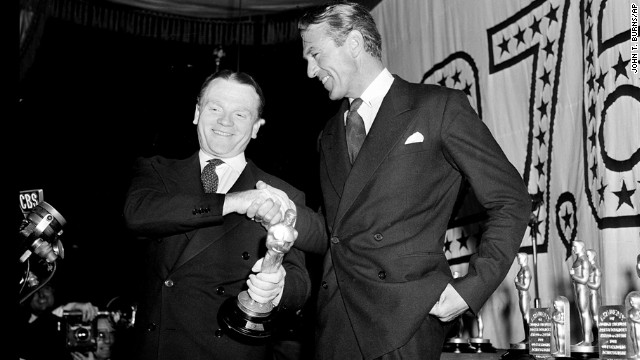 Gary Cooper, right, congratulates James Cagney for his best actor win in "Yankee Doodle Dandy" at the Oscar ceremony held in 1943. Cooper, also a nominee for "The Pride of the Yankees," didn't seem to hold a grudge against Cagney.
Gary Cooper, right, congratulates James Cagney for his best actor win in "Yankee Doodle Dandy" at the Oscar ceremony held in 1943. Cooper, also a nominee for "The Pride of the Yankees," didn't seem to hold a grudge against Cagney. 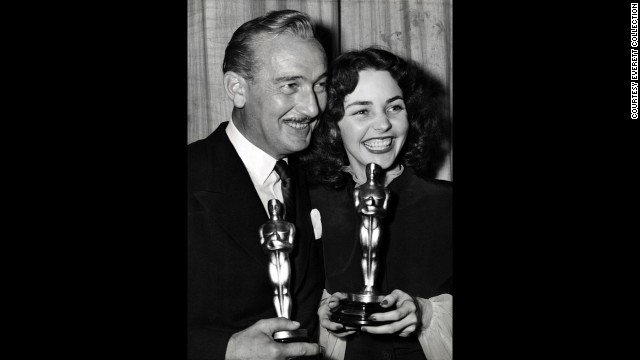 Character actor Paul Lukas faced stiff competition from stars Humphrey Bogart ("Casablanca") and Gary Cooper ("For Whom the Bell Tolls"), but he was able to take home the Oscar for "Watch on the Rhine." Lukas and best actress winner Jennifer Jones celebrate at the ceremony held in 1944.
Character actor Paul Lukas faced stiff competition from stars Humphrey Bogart ("Casablanca") and Gary Cooper ("For Whom the Bell Tolls"), but he was able to take home the Oscar for "Watch on the Rhine." Lukas and best actress winner Jennifer Jones celebrate at the ceremony held in 1944. 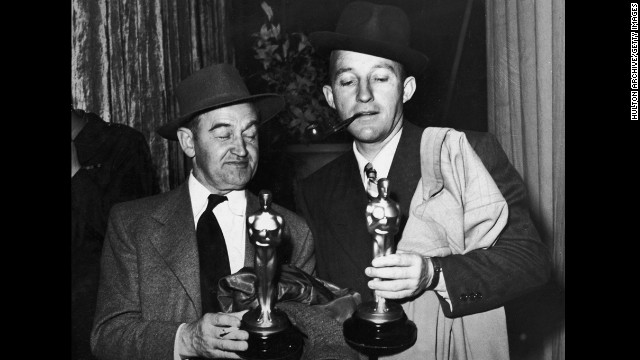 Bing Crosby, right, and co-star Barry Fitzgerald find a reason to celebrate after the 1945 awards ceremony. They won the best actor and best supporting actor awards, respectively, for "Going My Way."
Bing Crosby, right, and co-star Barry Fitzgerald find a reason to celebrate after the 1945 awards ceremony. They won the best actor and best supporting actor awards, respectively, for "Going My Way." 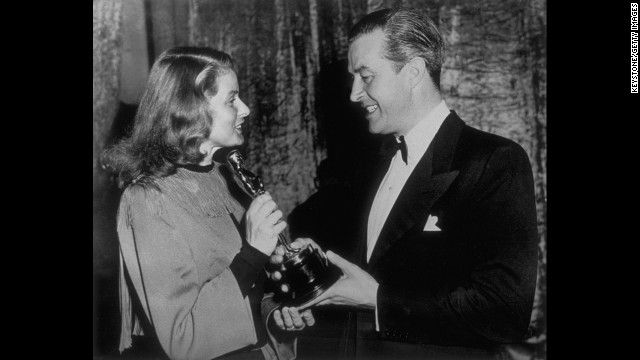 Ray Milland had a prolific career for decades -- including a standout role in Alfred Hitchcock's "Dial M for Murder" -- but he received only one Oscar nomination. Luckily, he made it count, winning the best actor prize for his role as an alcoholic writer in "The Lost Weekend." Ingrid Bergman presents Milland with the prize at the 1946 ceremony.
Ray Milland had a prolific career for decades -- including a standout role in Alfred Hitchcock's "Dial M for Murder" -- but he received only one Oscar nomination. Luckily, he made it count, winning the best actor prize for his role as an alcoholic writer in "The Lost Weekend." Ingrid Bergman presents Milland with the prize at the 1946 ceremony. 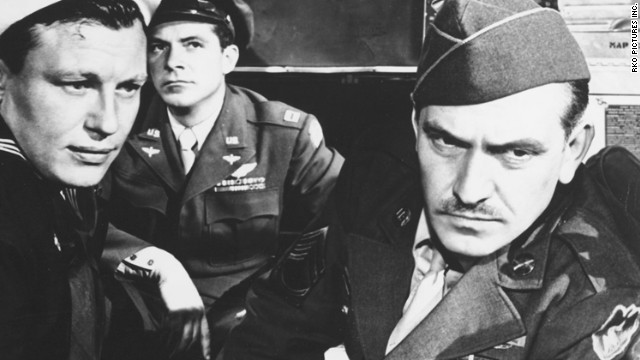 Fredric March, right, Dana Andrews, center, and Harold Russell struck a chord with postwar audiences as servicemen returning home in "The Best Years of Our Lives." March picked up his second Oscar for the role.
Fredric March, right, Dana Andrews, center, and Harold Russell struck a chord with postwar audiences as servicemen returning home in "The Best Years of Our Lives." March picked up his second Oscar for the role. 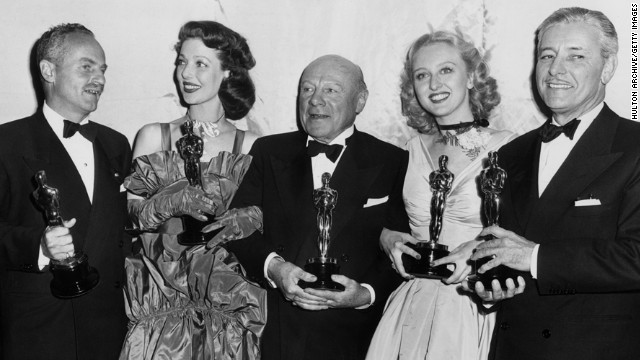 Ronald Colman, far right, a star since the silent days, picked up the best actor Oscar as a jealous actor in "A Double Life." Coleman appears with the year's other winners at the 1948 ceremony -- from left, Darryl Zanuck, producer of best picture "Gentleman's Agreement," best actress Loretta Young, best supporting actor Edmund Gwenn and best supporting actress Celeste Holm.
Ronald Colman, far right, a star since the silent days, picked up the best actor Oscar as a jealous actor in "A Double Life." Coleman appears with the year's other winners at the 1948 ceremony -- from left, Darryl Zanuck, producer of best picture "Gentleman's Agreement," best actress Loretta Young, best supporting actor Edmund Gwenn and best supporting actress Celeste Holm. 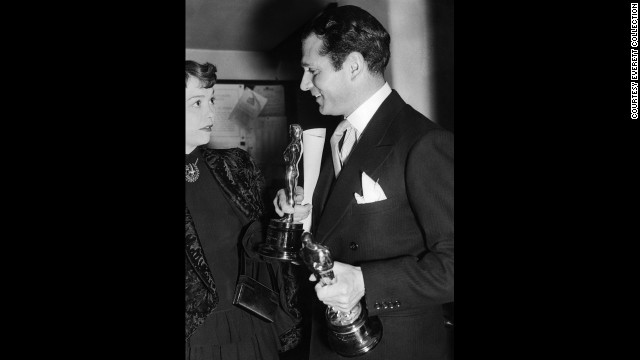 Laurence Olivier's commitment to bringing Shakespeare's "Hamlet" to the screen paid off handsomely at the Oscars. Olivier walked away with the best actor Oscar in the title role, and "Hamlet" also won for best picture. Here Olivier appears with best actress winner Jane Wyman in 1949.
Laurence Olivier's commitment to bringing Shakespeare's "Hamlet" to the screen paid off handsomely at the Oscars. Olivier walked away with the best actor Oscar in the title role, and "Hamlet" also won for best picture. Here Olivier appears with best actress winner Jane Wyman in 1949. 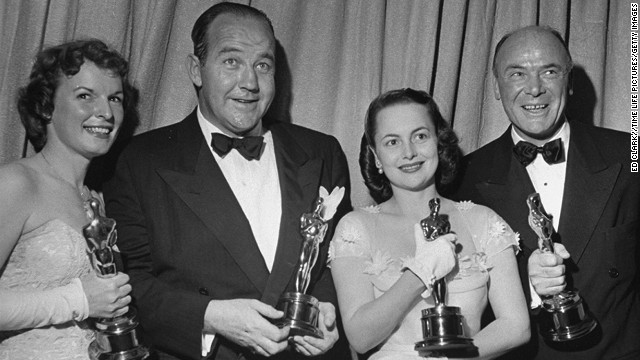 Broderick Crawford, second from left, pushed past Kirk Douglas, Gregory Peck, Richard Todd and John Wayne to win the best actor Oscar with "All the King's Men." Crawford appears with best supporting actress winner Mercedes McCambridge, far left, best actress winner Olivia de Havilland and best supporting actor winner Dean Jagger at the 1950 ceremony.
Broderick Crawford, second from left, pushed past Kirk Douglas, Gregory Peck, Richard Todd and John Wayne to win the best actor Oscar with "All the King's Men." Crawford appears with best supporting actress winner Mercedes McCambridge, far left, best actress winner Olivia de Havilland and best supporting actor winner Dean Jagger at the 1950 ceremony. 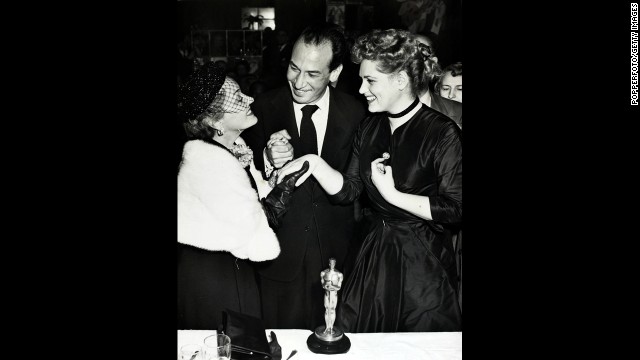 Puerto Rican-born José Ferrer became the first Hispanic to win an Oscar when he was named best actor for "Cyrano de Bergerac." Here he appears with Gloria Swanson, left, and Judy Holliday (best actress for "Born Yesterday") in 1951.
Puerto Rican-born José Ferrer became the first Hispanic to win an Oscar when he was named best actor for "Cyrano de Bergerac." Here he appears with Gloria Swanson, left, and Judy Holliday (best actress for "Born Yesterday") in 1951. 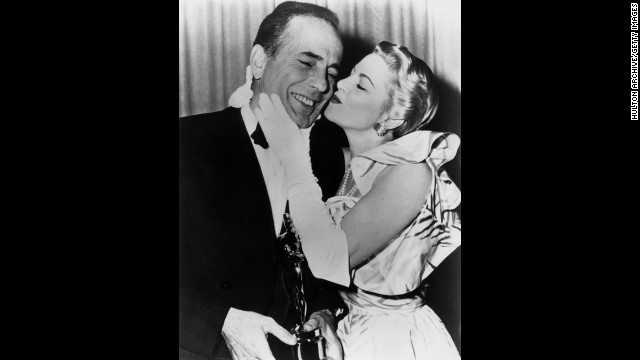 Claire Trevor can't resist giving Humphrey Bogart a kiss backstage at the 1952 Oscars ceremony after he won the best actor award for "The African Queen." Bogart beat out Marlon Brando in "A Streetcar Named Desire," Fredric March in "Death of a Salesman" and Montgomery Clift in "A Place in the Sun."
Claire Trevor can't resist giving Humphrey Bogart a kiss backstage at the 1952 Oscars ceremony after he won the best actor award for "The African Queen." Bogart beat out Marlon Brando in "A Streetcar Named Desire," Fredric March in "Death of a Salesman" and Montgomery Clift in "A Place in the Sun." 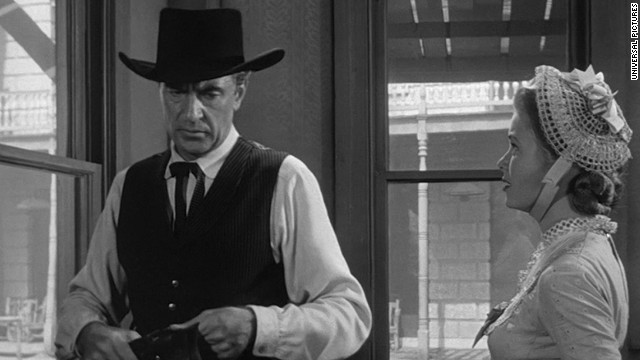 Gary Cooper won his second best actor award for the classic Western "High Noon" with Grace Kelly. Among Cooper's competitors were Kirk Douglas in "The Bad and the Beautiful," José Ferrer in "Moulin Rouge," Alec Guinness in "The Lavender Hill Mob" and Marlon Brando in "Viva Zapata!"
Gary Cooper won his second best actor award for the classic Western "High Noon" with Grace Kelly. Among Cooper's competitors were Kirk Douglas in "The Bad and the Beautiful," José Ferrer in "Moulin Rouge," Alec Guinness in "The Lavender Hill Mob" and Marlon Brando in "Viva Zapata!" 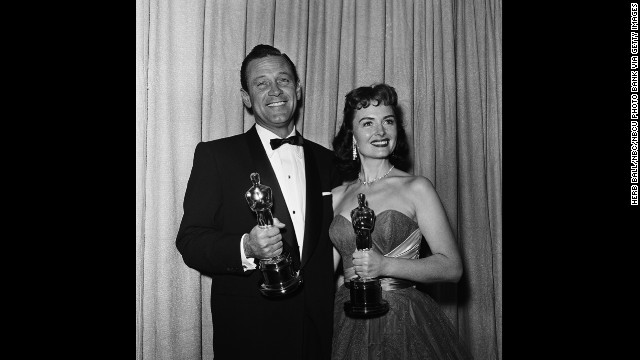 William Holden celebrates his best actor win for "Stalag 17" with best supporting actress winner Donna Reed at the Oscar ceremony in 1954. It was the actor's second nomination; his first was for Billy Wilder's 1950 classic "Sunset Boulevard."
William Holden celebrates his best actor win for "Stalag 17" with best supporting actress winner Donna Reed at the Oscar ceremony in 1954. It was the actor's second nomination; his first was for Billy Wilder's 1950 classic "Sunset Boulevard." 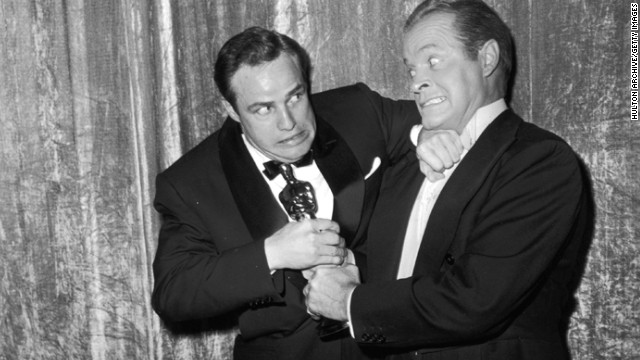 Oscars host Bob Hope, right, might have tried, but there was no way Marlon Brando was parting with his best actor award at the 1955 ceremony. Brando had lost three years in a row before then, but the actor's luck finally changed with "On the Waterfront."
Oscars host Bob Hope, right, might have tried, but there was no way Marlon Brando was parting with his best actor award at the 1955 ceremony. Brando had lost three years in a row before then, but the actor's luck finally changed with "On the Waterfront." 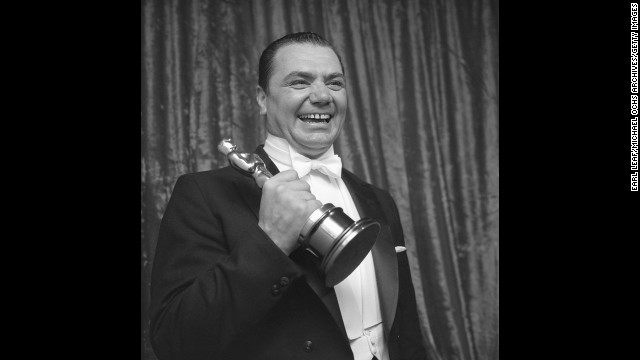 Ernest Borgnine faced heavy competition for best actor, beating out James Dean ("East of Eden"), Frank Sinatra ("The Man With the Golden Arm"), James Cagney ("Love Me or Leave Me") and Spencer Tracy ("Bad Day at Black Rock"). Backstage at the 1956 ceremony, Borgnine holds the Oscar for his portrayal of a lonely butcher in "Marty."
Ernest Borgnine faced heavy competition for best actor, beating out James Dean ("East of Eden"), Frank Sinatra ("The Man With the Golden Arm"), James Cagney ("Love Me or Leave Me") and Spencer Tracy ("Bad Day at Black Rock"). Backstage at the 1956 ceremony, Borgnine holds the Oscar for his portrayal of a lonely butcher in "Marty." 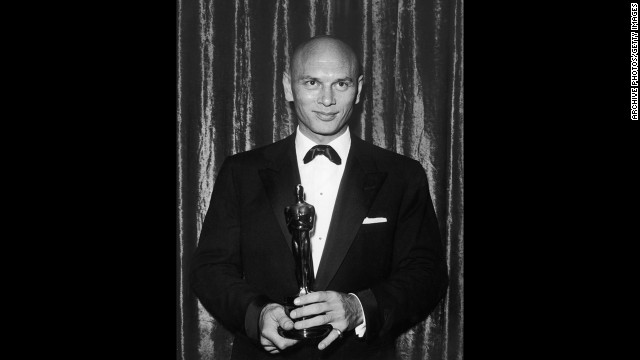 Yul Brynner repeated his stage success as the King of Siam, winning the best actor Oscar for "The King and I." He's pictured at the 1957 ceremony.
Yul Brynner repeated his stage success as the King of Siam, winning the best actor Oscar for "The King and I." He's pictured at the 1957 ceremony. 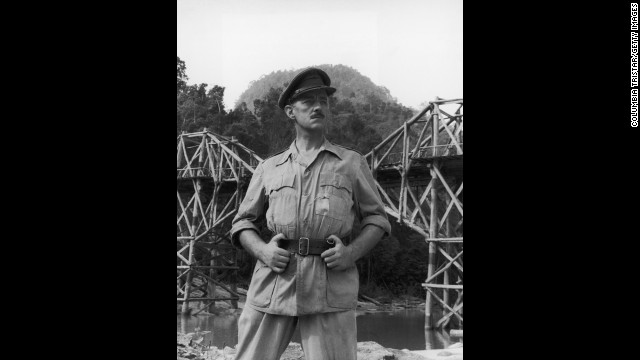 British actor Alec Guinness will always be known to "Star Wars" fans as Obi-Wan Kenobi, but he had an illustrious career on stage and screen long before the George Lucas blockbuster. After losing an earlier Oscar nomination, he finally won the best actor award as a World War II British officer in "The Bridge on the River Kwai."
British actor Alec Guinness will always be known to "Star Wars" fans as Obi-Wan Kenobi, but he had an illustrious career on stage and screen long before the George Lucas blockbuster. After losing an earlier Oscar nomination, he finally won the best actor award as a World War II British officer in "The Bridge on the River Kwai." 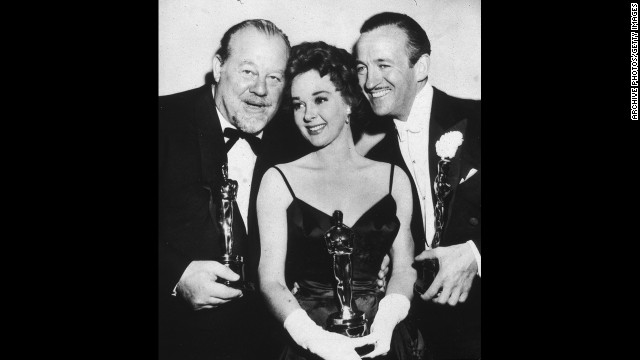 David Niven, right, joins fellow Oscar winners Burl Ives and Susan Hayward at the 1959 ceremony after winning the best actor award for "Separate Tables." The actor fought off competition from Tony Curtis and Sidney Poitier, both up for "The Defiant Ones"; Paul Newman in "Cat on a Hot Tin Roof"; and Spencer Tracy in "The Old Man and the Sea."
David Niven, right, joins fellow Oscar winners Burl Ives and Susan Hayward at the 1959 ceremony after winning the best actor award for "Separate Tables." The actor fought off competition from Tony Curtis and Sidney Poitier, both up for "The Defiant Ones"; Paul Newman in "Cat on a Hot Tin Roof"; and Spencer Tracy in "The Old Man and the Sea." 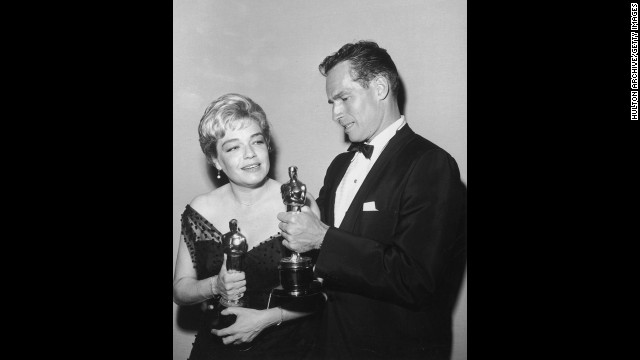 Charlton Heston helped "Ben-Hur" to win a record 11 Academy Awards, shutting out Jack Lemmon, James Stewart, Paul Muni and Laurence Harvey as best actor. Heston appears with French actress Simone Signoret (best actress for "Room at the Top") at the 1960 ceremony.
Charlton Heston helped "Ben-Hur" to win a record 11 Academy Awards, shutting out Jack Lemmon, James Stewart, Paul Muni and Laurence Harvey as best actor. Heston appears with French actress Simone Signoret (best actress for "Room at the Top") at the 1960 ceremony. 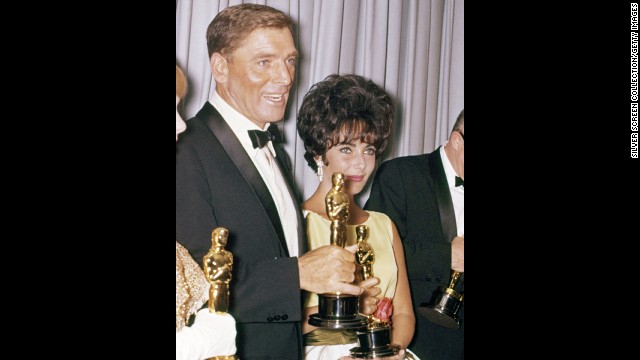 Burt Lancaster was a winner two times over at the 1961 Oscar ceremony. He won the best actor prize for the title role in "Elmer Gantry," and he had glamorous Elizabeth Taylor, best actress winner for "Butterfield 8," by his side backstage.
Burt Lancaster was a winner two times over at the 1961 Oscar ceremony. He won the best actor prize for the title role in "Elmer Gantry," and he had glamorous Elizabeth Taylor, best actress winner for "Butterfield 8," by his side backstage. 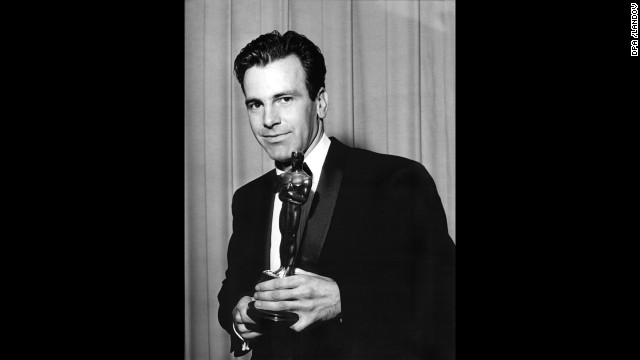 Maximilian Schell won the best actor Oscar over his "Judgment at Nuremberg" co-star Spencer Tracy. Schell had previously portrayed the character of German lawyer Hans Rolfe in a television version of "Judgment."
Maximilian Schell won the best actor Oscar over his "Judgment at Nuremberg" co-star Spencer Tracy. Schell had previously portrayed the character of German lawyer Hans Rolfe in a television version of "Judgment." 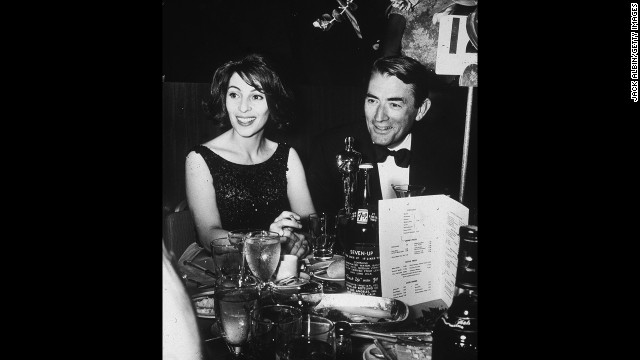 Gregory Peck's performance as lawyer Atticus Finch in the film of Harper Lee's novel, "To Kill a Mockingbird," was a standout to academy voters. He beat out some stiff competition for best actor: Peter O'Toole for "Lawrence of Arabia" and Burt Lancaster for "Birdman of Alcatraz." Here Peck and his wife, Veronique, attend an Oscar after-party in 1963.
Gregory Peck's performance as lawyer Atticus Finch in the film of Harper Lee's novel, "To Kill a Mockingbird," was a standout to academy voters. He beat out some stiff competition for best actor: Peter O'Toole for "Lawrence of Arabia" and Burt Lancaster for "Birdman of Alcatraz." Here Peck and his wife, Veronique, attend an Oscar after-party in 1963. 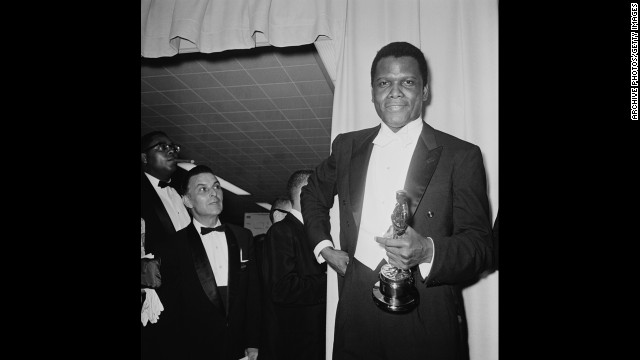 Sidney Poitier became the first African-American to win the best actor Oscar -- for his work in "Lilies of the Field." Poitier had been nominated once before for "The Defiant Ones." Interestingly, Poitier was the only one of the four acting category winners present at the 1964 ceremony.
Sidney Poitier became the first African-American to win the best actor Oscar -- for his work in "Lilies of the Field." Poitier had been nominated once before for "The Defiant Ones." Interestingly, Poitier was the only one of the four acting category winners present at the 1964 ceremony. 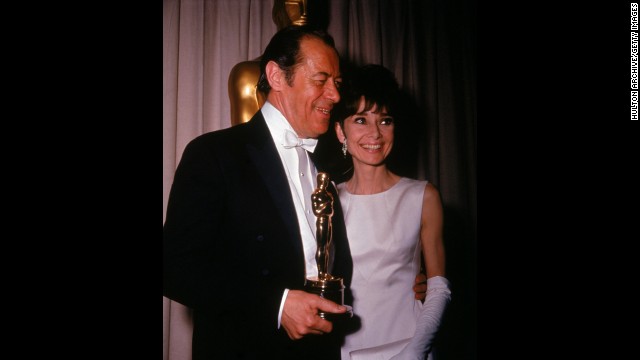 Who didn't fall in love with "My Fair Lady"? The academy sure did. Rex Harrison took the best actor prize for his role as Henry Higgins at the 1965 ceremony, and the musical won best picture honors, among others. But Audrey Hepburn's performance has Eliza Doolittle wasn't even nominated -- the Oscar went to Julie Andrews for "Mary Poppins."
Who didn't fall in love with "My Fair Lady"? The academy sure did. Rex Harrison took the best actor prize for his role as Henry Higgins at the 1965 ceremony, and the musical won best picture honors, among others. But Audrey Hepburn's performance has Eliza Doolittle wasn't even nominated -- the Oscar went to Julie Andrews for "Mary Poppins." 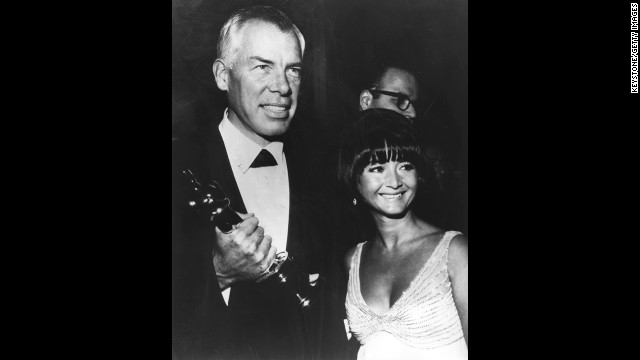 Lee Marvin won the Oscar for his comic role in "Cat Ballou" over dramatic heavyweights such as Laurence Olivier in "Othello," Richard Burton in "The Spy Who Came in From the Cold," Rod Steiger in "The Pawnbroker" and Oskar Werner in "Ship of Fools." Here, Marvin appears with then-girlfriend Michelle Triola in 1966.
Lee Marvin won the Oscar for his comic role in "Cat Ballou" over dramatic heavyweights such as Laurence Olivier in "Othello," Richard Burton in "The Spy Who Came in From the Cold," Rod Steiger in "The Pawnbroker" and Oskar Werner in "Ship of Fools." Here, Marvin appears with then-girlfriend Michelle Triola in 1966. 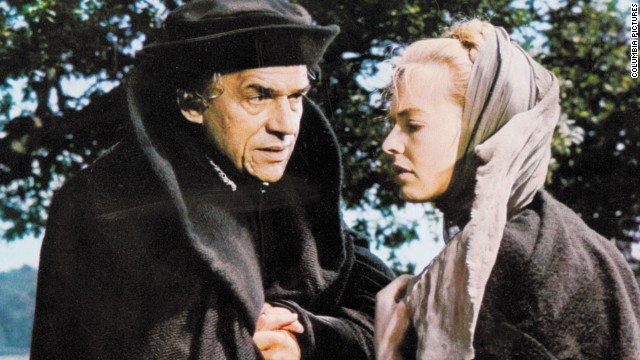 Paul Scofield also was up against some heavyweight actors, particularly Richard Burton in "Who's Afraid of Virginia Woolf?" But Scofield, here with Susannah York, won for his work as Thomas More in the period drama "A Man for All Seasons."
Paul Scofield also was up against some heavyweight actors, particularly Richard Burton in "Who's Afraid of Virginia Woolf?" But Scofield, here with Susannah York, won for his work as Thomas More in the period drama "A Man for All Seasons." 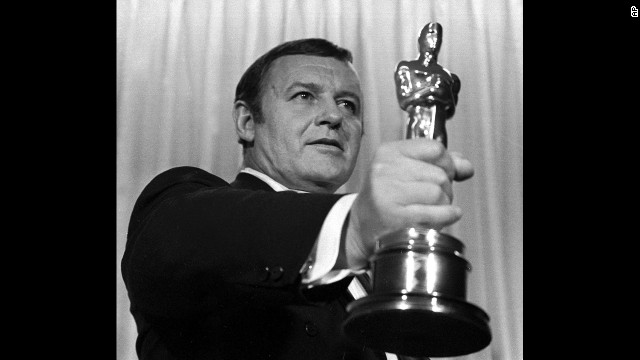 Sidney Poitier may have been the star of the detective drama "In the Heat of the Night," but he was snubbed in the Oscars race. It wasn't that academy voters didn't love the movie though: "In the Heat of the Night" won best picture as well as best actor for Poitier's co-star, Rod Steiger, here holding his Oscar at the 1968 ceremony.
Sidney Poitier may have been the star of the detective drama "In the Heat of the Night," but he was snubbed in the Oscars race. It wasn't that academy voters didn't love the movie though: "In the Heat of the Night" won best picture as well as best actor for Poitier's co-star, Rod Steiger, here holding his Oscar at the 1968 ceremony. 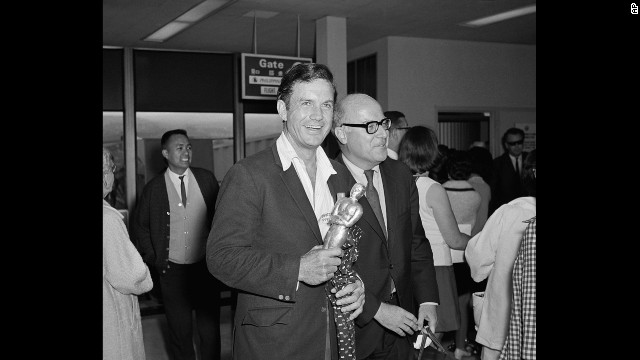 Cliff Robertson's portrayal of a mentally challenged man in the drama "Charly" was enough to bowl over competition such as Peter O'Toole and Alan Arkin.
Cliff Robertson's portrayal of a mentally challenged man in the drama "Charly" was enough to bowl over competition such as Peter O'Toole and Alan Arkin. 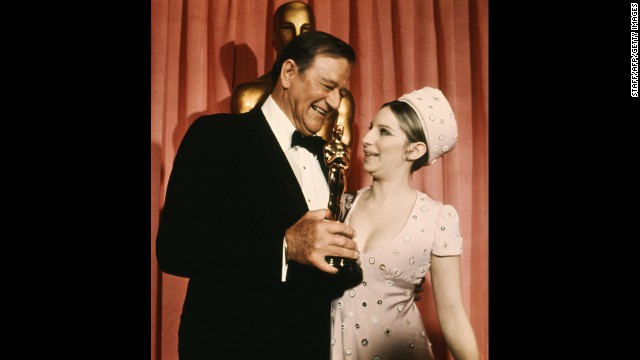 The best actor category was fierce the year John Wayne won the gold for "True Grit." In only his second nomination, the Hollywood legend beat out newcomers Dustin Hoffman and Jon Voight in "Midnight Cowboy" as well as Richard Burton in "Anne of the Thousand Days" and Peter O'Toole in "Goodbye, Mr. Chips." Barbra Streisand congratulates Wayne at the 1970 ceremony.
The best actor category was fierce the year John Wayne won the gold for "True Grit." In only his second nomination, the Hollywood legend beat out newcomers Dustin Hoffman and Jon Voight in "Midnight Cowboy" as well as Richard Burton in "Anne of the Thousand Days" and Peter O'Toole in "Goodbye, Mr. Chips." Barbra Streisand congratulates Wayne at the 1970 ceremony. 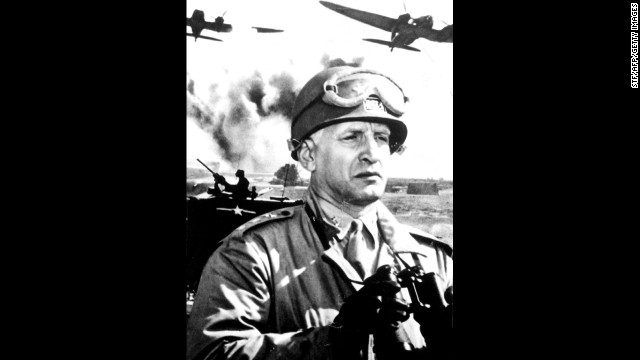 "Patton" features one of the most readily recognizable images in films -- that of George C. Scott's general standing in front of the American flag -- and it was as critically acclaimed as it was popular. But while "Patton" nabbed the best picture title and a best actor Oscar for Scott, the actor was having none of it. He refused to accept the prize, calling the politics surrounding the ceremony "demeaning" and likening the Oscars to a "two-hour meat parade."
"Patton" features one of the most readily recognizable images in films -- that of George C. Scott's general standing in front of the American flag -- and it was as critically acclaimed as it was popular. But while "Patton" nabbed the best picture title and a best actor Oscar for Scott, the actor was having none of it. He refused to accept the prize, calling the politics surrounding the ceremony "demeaning" and likening the Oscars to a "two-hour meat parade." 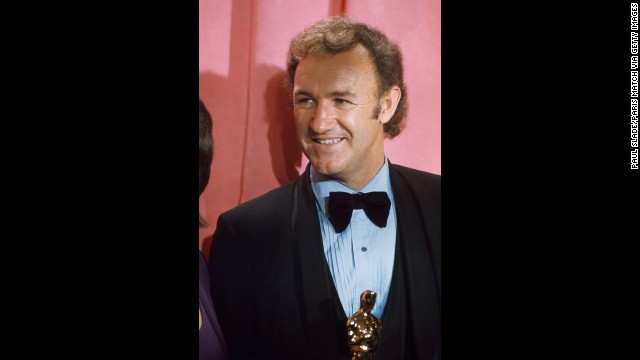 Everyone wanted in on "The French Connection," and star Gene Hackman was rewarded handsomely with the best actor award at the 1972 ceremony.
Everyone wanted in on "The French Connection," and star Gene Hackman was rewarded handsomely with the best actor award at the 1972 ceremony. 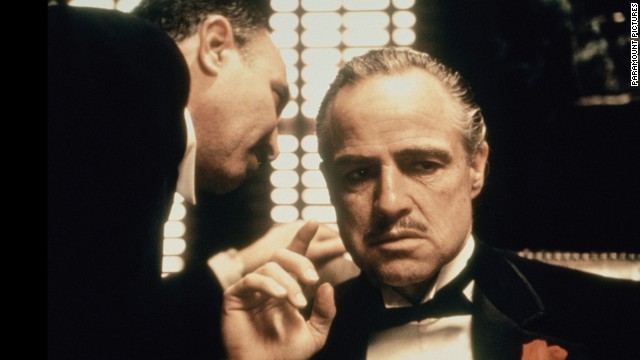 An Oscar is an honor most stars would never refuse, but Marlon Brando did when the academy bestowed him with the best actor prize for "The Godfather" at the 1973 ceremony. Brando, who had won the award once before, said he was protesting the portrayal of Native Americans on TV and in film.
An Oscar is an honor most stars would never refuse, but Marlon Brando did when the academy bestowed him with the best actor prize for "The Godfather" at the 1973 ceremony. Brando, who had won the award once before, said he was protesting the portrayal of Native Americans on TV and in film. 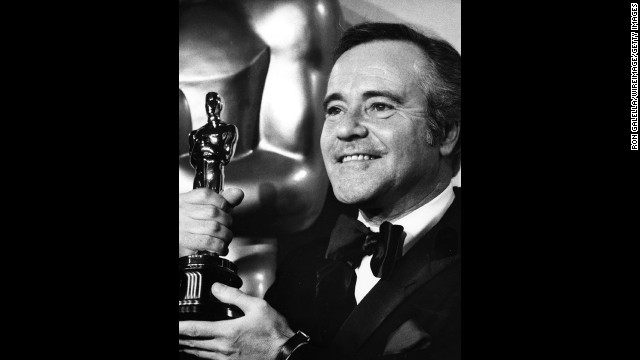 The academy loved to nominate Jack Lemmon, but it wasn't always so quick to give him the prize. The star's luck changed when "Save the Tiger" earned him a best actor Oscar.
The academy loved to nominate Jack Lemmon, but it wasn't always so quick to give him the prize. The star's luck changed when "Save the Tiger" earned him a best actor Oscar. 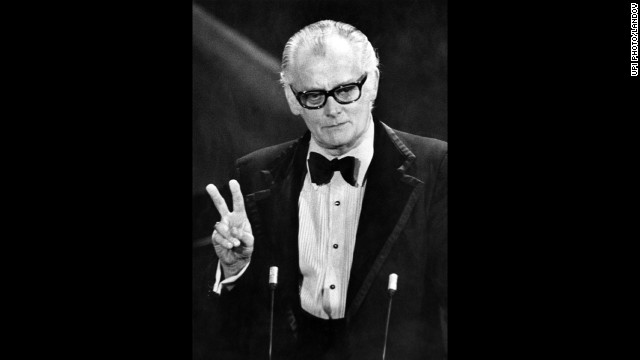 For Art Carney, there were two phrases that helped him secure the best actor Oscar for "Harry and Tonto." "Do it! You are old," words of wisdom that came from his agent.
For Art Carney, there were two phrases that helped him secure the best actor Oscar for "Harry and Tonto." "Do it! You are old," words of wisdom that came from his agent. 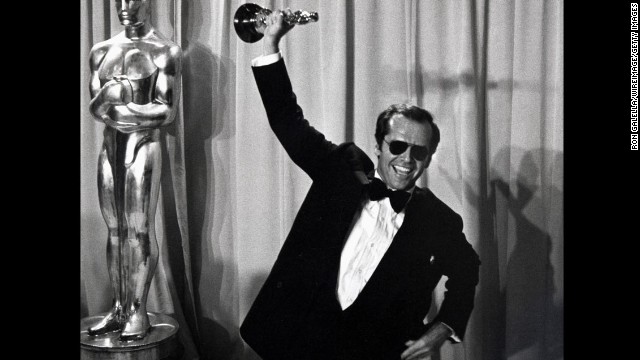 After losing out four times as an Oscar nominee, Jack Nicholson triumphantly claimed his prize for "One Flew Over the Cuckoo's Nest."
After losing out four times as an Oscar nominee, Jack Nicholson triumphantly claimed his prize for "One Flew Over the Cuckoo's Nest." 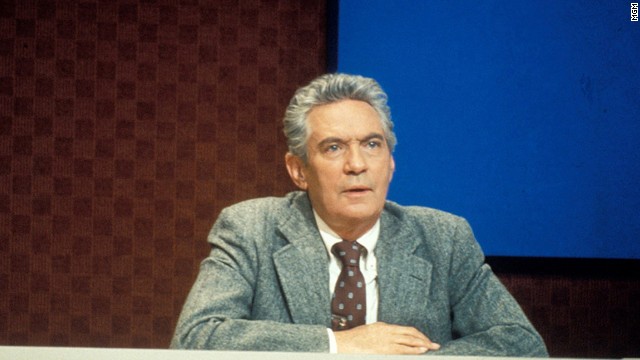 "Network's" Peter Finch faced some tough competition for the best actor award. He was up against Robert De Niro in "Taxi Driver" and Sylvester Stallone in best picture winner "Rocky" as well as his "Network" co-star, William Holden. Finch died two months before the March 1977 ceremony and became the first actor to win an Oscar posthumously.
"Network's" Peter Finch faced some tough competition for the best actor award. He was up against Robert De Niro in "Taxi Driver" and Sylvester Stallone in best picture winner "Rocky" as well as his "Network" co-star, William Holden. Finch died two months before the March 1977 ceremony and became the first actor to win an Oscar posthumously. 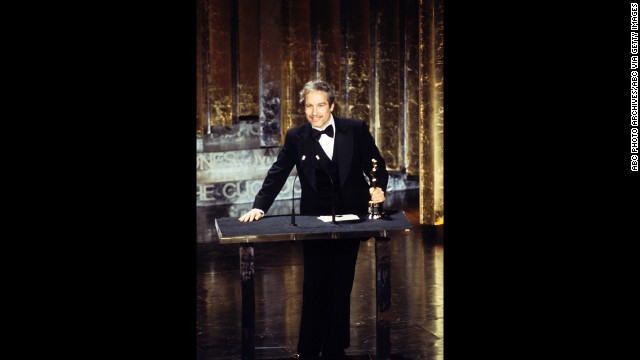 John Travolta in "Saturday Night Fever" and Woody Allen in "Annie Hall" have become prime examples of characters in '70s films, but Richard Dreyfuss' performance as a struggling actor in "The Goodbye Girl" stood out the most to academy voters at the time. Here the actor accepts his prize at the 1978 ceremony.
John Travolta in "Saturday Night Fever" and Woody Allen in "Annie Hall" have become prime examples of characters in '70s films, but Richard Dreyfuss' performance as a struggling actor in "The Goodbye Girl" stood out the most to academy voters at the time. Here the actor accepts his prize at the 1978 ceremony. 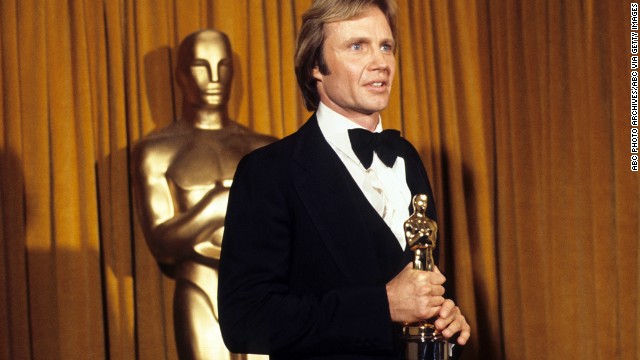 Jon Voight had been nominated for a best actor Oscar once before for 1969's "Midnight Cowboy," but it was the Vietnam War drama "Coming Home" that finally earned him the honors.
Jon Voight had been nominated for a best actor Oscar once before for 1969's "Midnight Cowboy," but it was the Vietnam War drama "Coming Home" that finally earned him the honors. 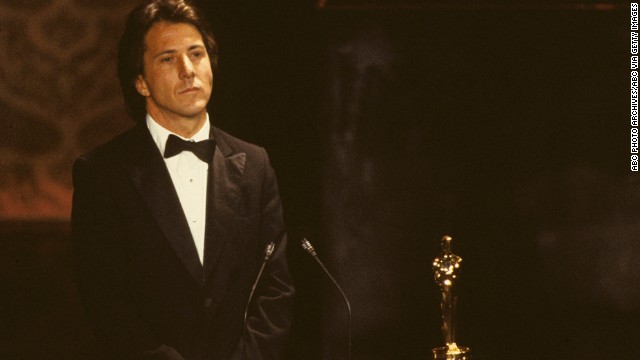 Like Jack Nicholson before him, Dustin Hoffman was forever the bridesmaid and never the bride. But after losing for "Midnight Cowboy," "The Graduate" and "Lenny," Hoffman got to accept the award at the 1980 ceremony, thanks to his work in best picture winner "Kramer vs. Kramer."
Like Jack Nicholson before him, Dustin Hoffman was forever the bridesmaid and never the bride. But after losing for "Midnight Cowboy," "The Graduate" and "Lenny," Hoffman got to accept the award at the 1980 ceremony, thanks to his work in best picture winner "Kramer vs. Kramer." 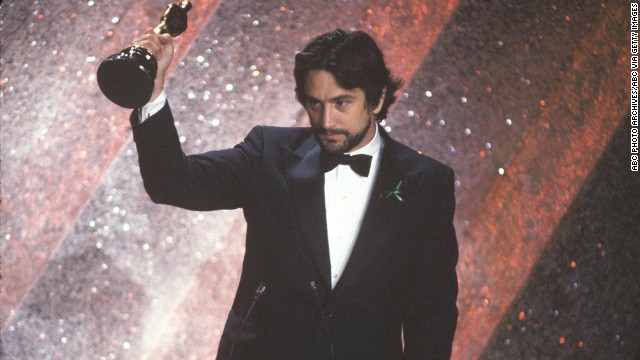 Robert De Niro faced movie greats such as Peter O'Toole and Jack Lemmon in the best actor category. De Niro had already won the best supporting actor Oscar for "The Godfather: Part II," and academy voters couldn't help but hand him the best actor prize for "Raging Bull" -- especially since he gained nearly 60 pounds to play Jake LaMotta as an aging boxer.
Robert De Niro faced movie greats such as Peter O'Toole and Jack Lemmon in the best actor category. De Niro had already won the best supporting actor Oscar for "The Godfather: Part II," and academy voters couldn't help but hand him the best actor prize for "Raging Bull" -- especially since he gained nearly 60 pounds to play Jake LaMotta as an aging boxer. 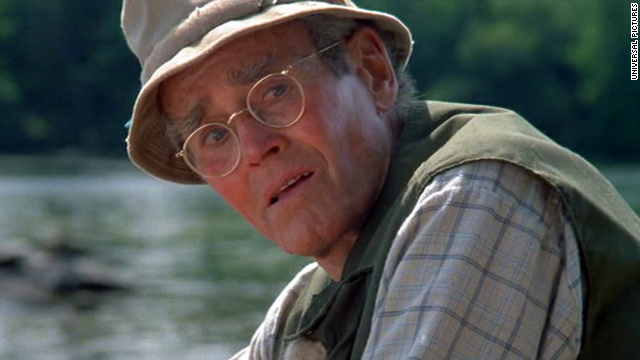 After being a movie legend for more than 40 years, Henry Fonda won his first competitive Oscar for "On Golden Pond." His co-star, Katharine Hepburn, also shined in the movie as his wife, picking up her fourth best actress prize.
After being a movie legend for more than 40 years, Henry Fonda won his first competitive Oscar for "On Golden Pond." His co-star, Katharine Hepburn, also shined in the movie as his wife, picking up her fourth best actress prize. 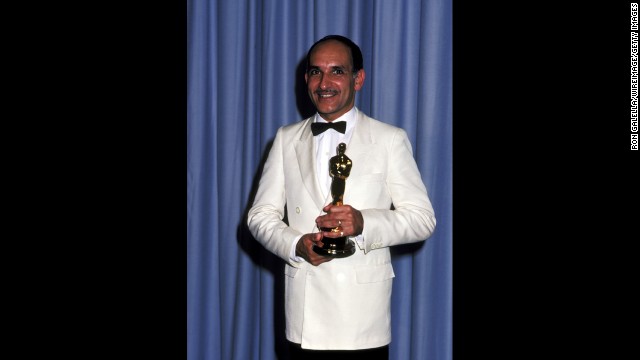 Ben Kingsley's portrayal in "Gandhi" was the performance to beat in that year's best actor Oscar race, and neither Dustin Hoffman in "Tootsie" nor Paul Newman in "The Verdict" could compete.
Ben Kingsley's portrayal in "Gandhi" was the performance to beat in that year's best actor Oscar race, and neither Dustin Hoffman in "Tootsie" nor Paul Newman in "The Verdict" could compete. 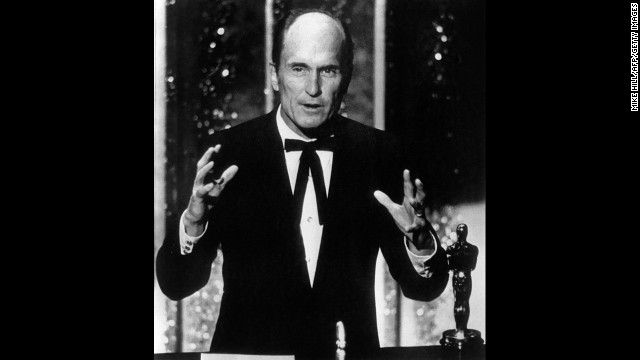 Robert Duvall won the best actor prize for his performance as a country singer in "Tender Mercies."
Robert Duvall won the best actor prize for his performance as a country singer in "Tender Mercies." 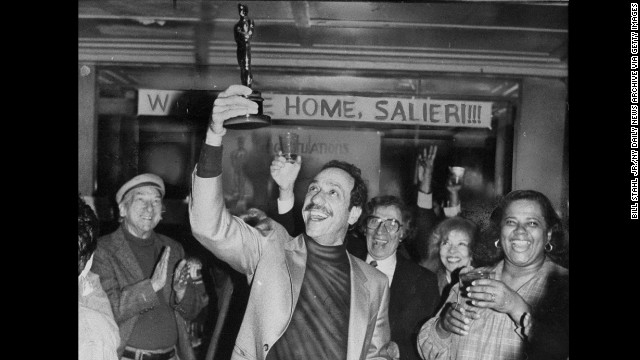 F. Murray Abraham's performance as Salieri in "Amadeus" rocked academy voters, who named him best actor.
F. Murray Abraham's performance as Salieri in "Amadeus" rocked academy voters, who named him best actor. 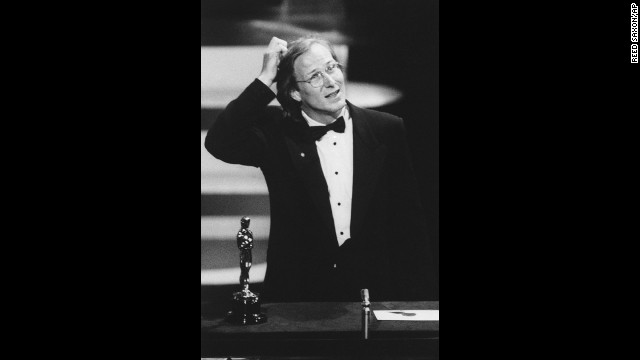 "Out of Africa" dominated the Oscars at the 1986 ceremony, but William Hurt picked up the best actor award for his portrayal of a gay imprisoned man in "Kiss of the Spider Woman."
"Out of Africa" dominated the Oscars at the 1986 ceremony, but William Hurt picked up the best actor award for his portrayal of a gay imprisoned man in "Kiss of the Spider Woman." 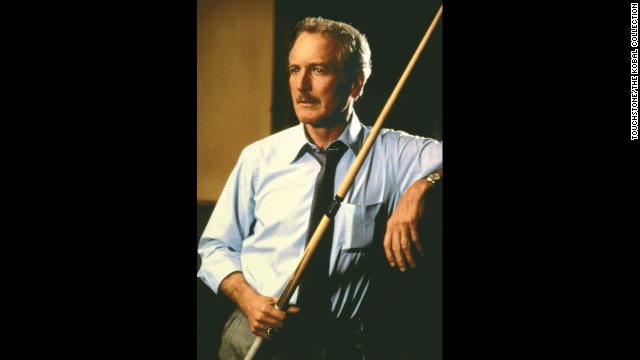 Paul Newman's performance in "The Color of Money" struck Oscar gold. It was the actor's first competitive Oscar win, but he wasn't there to accept it -- he'd joked that, after showing up and losing six other times, he might finally nab the prize if he stayed away.
Paul Newman's performance in "The Color of Money" struck Oscar gold. It was the actor's first competitive Oscar win, but he wasn't there to accept it -- he'd joked that, after showing up and losing six other times, he might finally nab the prize if he stayed away. 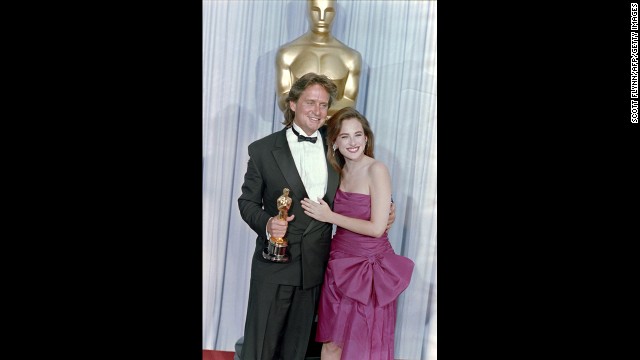 Gordon Gekko's creed of greed was very, very good to Michael Douglas. The star -- and son of another frequent Oscar nominee, Kirk Douglas -- earned his first Oscar nomination and first win for best actor for his role as the ruthless corporate raider in "Wall Street." Here Douglas appears with Marlee Matlin at the 1988 ceremony.
Gordon Gekko's creed of greed was very, very good to Michael Douglas. The star -- and son of another frequent Oscar nominee, Kirk Douglas -- earned his first Oscar nomination and first win for best actor for his role as the ruthless corporate raider in "Wall Street." Here Douglas appears with Marlee Matlin at the 1988 ceremony. 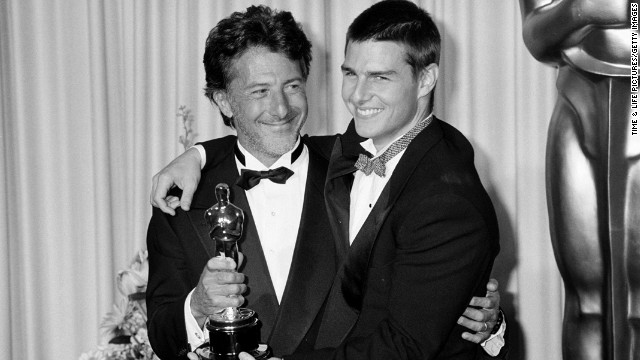 Awards came pouring in for "Rain Man" with Dustin Hoffman, left, as an autistic savant and Tom Cruise as his younger brother. Hoffman picked up his second best actor Oscar and received congratulations from Cruise at the 1989 ceremony. Cruise wasn't even nominated, but he was probably just fine with starring in the best picture winner.
Awards came pouring in for "Rain Man" with Dustin Hoffman, left, as an autistic savant and Tom Cruise as his younger brother. Hoffman picked up his second best actor Oscar and received congratulations from Cruise at the 1989 ceremony. Cruise wasn't even nominated, but he was probably just fine with starring in the best picture winner. 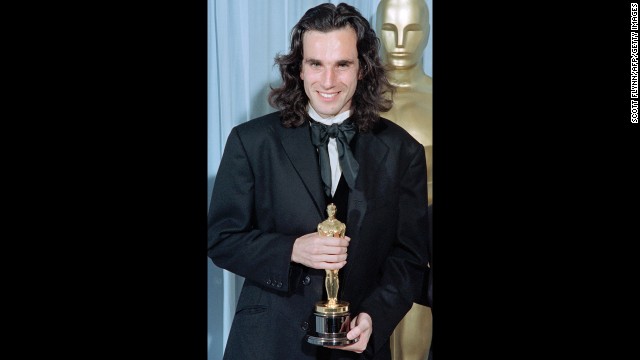 Before Daniel Day-Lewis became so revered he could strike fear in the hearts of Oscar competitors, the British performer proved his mettle with the biopic "My Left Foot," earning his first best actor Oscar. It was no easy task: Day-Lewis was up against Morgan Freeman in "Driving Miss Daisy," Kenneth Branagh in "Henry V," Tom Cruise in "Born on the Fourth of July" and Robin Williams in "Dead Poets Society."
Before Daniel Day-Lewis became so revered he could strike fear in the hearts of Oscar competitors, the British performer proved his mettle with the biopic "My Left Foot," earning his first best actor Oscar. It was no easy task: Day-Lewis was up against Morgan Freeman in "Driving Miss Daisy," Kenneth Branagh in "Henry V," Tom Cruise in "Born on the Fourth of July" and Robin Williams in "Dead Poets Society." 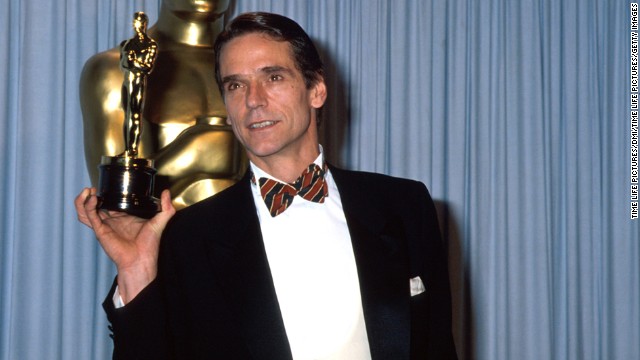 We suppose the academy couldn't justify giving Kevin Costner the best director, best picture and the best actor prize for "Dances With Wolves," so Jeremy Irons took home the statuette for best actor for his role as Claus von Bülow in "Reversal of Fortune."
We suppose the academy couldn't justify giving Kevin Costner the best director, best picture and the best actor prize for "Dances With Wolves," so Jeremy Irons took home the statuette for best actor for his role as Claus von Bülow in "Reversal of Fortune." 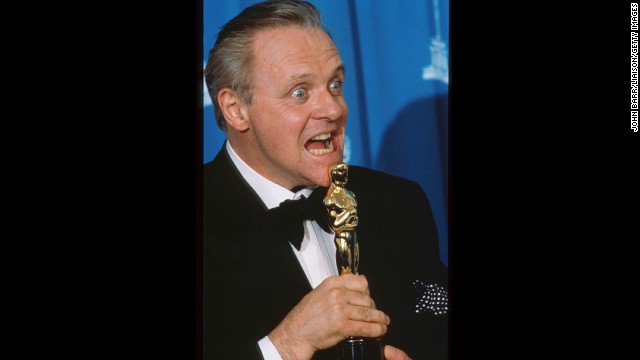 Anthony Hopkins absolutely killed as Hannibal Lecter in "The Silence of the Lambs," so it wasn't surprising that he secured the best actor Oscar for the role.
Anthony Hopkins absolutely killed as Hannibal Lecter in "The Silence of the Lambs," so it wasn't surprising that he secured the best actor Oscar for the role. 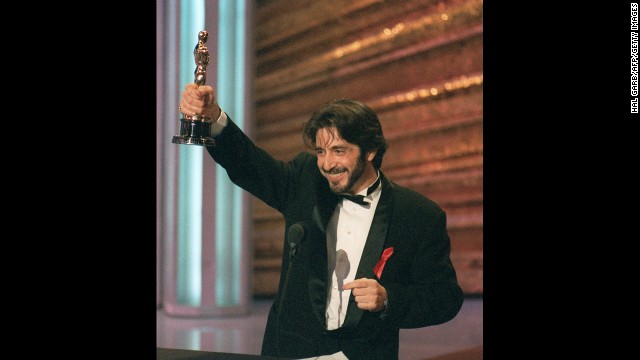 Before "Scent of a Woman," Al Pacino had been nominated for best actor four times and best supporting actor twice without winning. But the star's moment to accept the best actor Oscar finally came at the 1993 ceremony. Pacino may have won for "Scent of a Woman," but he also lost that year in the best supporting actor category for "Glengarry Glen Ross."
Before "Scent of a Woman," Al Pacino had been nominated for best actor four times and best supporting actor twice without winning. But the star's moment to accept the best actor Oscar finally came at the 1993 ceremony. Pacino may have won for "Scent of a Woman," but he also lost that year in the best supporting actor category for "Glengarry Glen Ross." 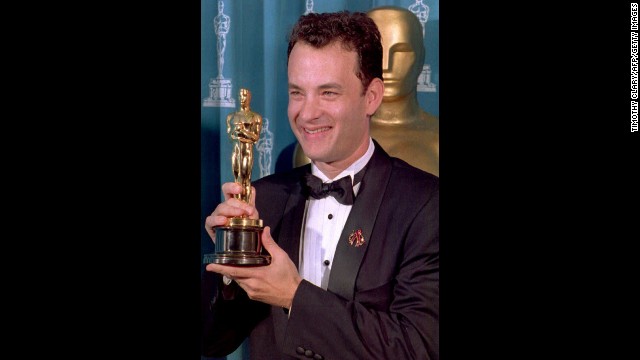 Little did anyone know that when Tom Hanks won the best actor Oscar for the legal drama "Philadelphia" he'd be back at the Oscars very soon, and in a very different role.
Little did anyone know that when Tom Hanks won the best actor Oscar for the legal drama "Philadelphia" he'd be back at the Oscars very soon, and in a very different role. 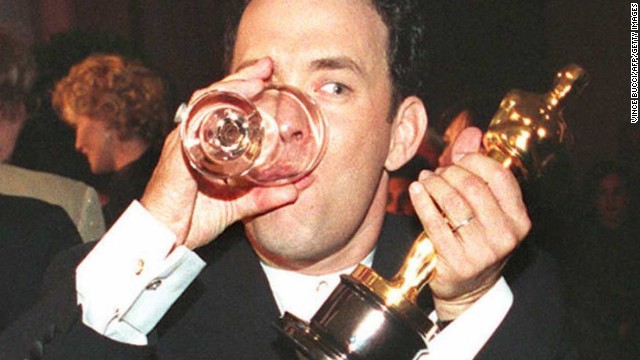 Tom Hanks proved his versatility when he won the best actor Oscar for the second year in a row. His prize this time was for his performance as the mentally challenged but indefatigable "Forrest Gump."
Tom Hanks proved his versatility when he won the best actor Oscar for the second year in a row. His prize this time was for his performance as the mentally challenged but indefatigable "Forrest Gump." 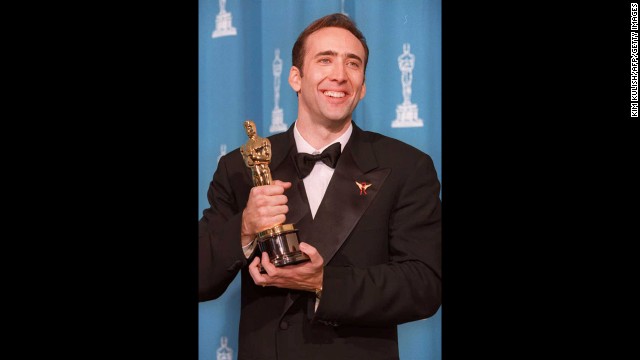 Nicolas Cage may now be the butt of Internet jokes -- surely you've seen him swing from a "Wrecking Ball"? -- but he was the man to beat at the 1996 Oscar ceremony. Cage won the best actor prize for "Leaving Las Vegas," his first nomination and first win.
Nicolas Cage may now be the butt of Internet jokes -- surely you've seen him swing from a "Wrecking Ball"? -- but he was the man to beat at the 1996 Oscar ceremony. Cage won the best actor prize for "Leaving Las Vegas," his first nomination and first win. 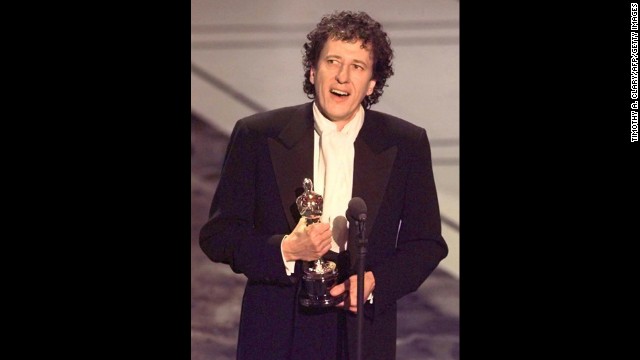 Some actors languish as nominees for years before winning an Oscar, but Geoffrey Rush won the best actor prize on his first try with "Shine."
Some actors languish as nominees for years before winning an Oscar, but Geoffrey Rush won the best actor prize on his first try with "Shine." 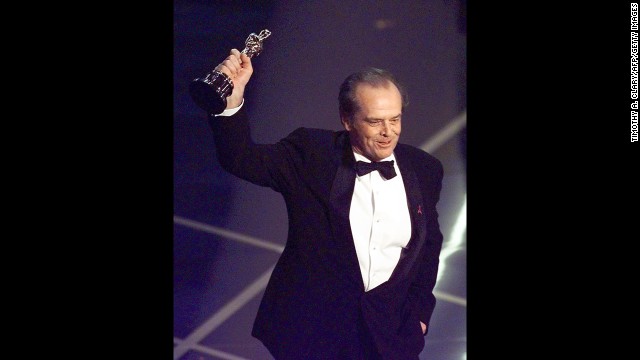 By now, everyone knew what a powerhouse Jack Nicholson was, but he reminded moviegoers again with "As Good as It Gets," picking up yet another best actor Oscar.
By now, everyone knew what a powerhouse Jack Nicholson was, but he reminded moviegoers again with "As Good as It Gets," picking up yet another best actor Oscar. 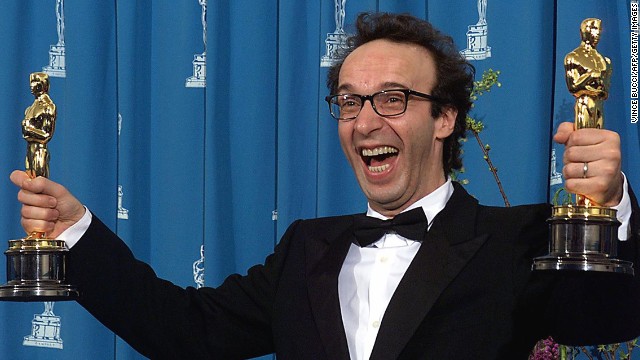 Italian actor Roberto Benigni was unknown to American audiences before "Life Is Beautiful," but he stole the show at the 1999 Oscars ceremony. The academy gave him the best actor Oscar for "Life Is Beautiful," which also won the prize for best foreign-language film.
Italian actor Roberto Benigni was unknown to American audiences before "Life Is Beautiful," but he stole the show at the 1999 Oscars ceremony. The academy gave him the best actor Oscar for "Life Is Beautiful," which also won the prize for best foreign-language film. 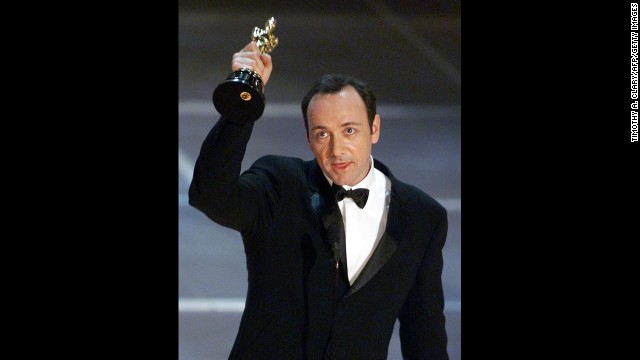 "American Beauty" was a cynical look at American middle class life with a new century arriving. Star Kevin Spacey received the best actor award for his portrayal of a middle-aged man who lusts after his teenage daughter's friend. The film also won best picture, director (Sam Mendes) and original screenplay (Alan Ball).
"American Beauty" was a cynical look at American middle class life with a new century arriving. Star Kevin Spacey received the best actor award for his portrayal of a middle-aged man who lusts after his teenage daughter's friend. The film also won best picture, director (Sam Mendes) and original screenplay (Alan Ball). 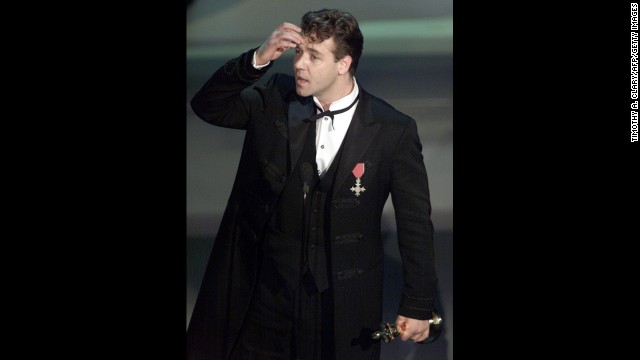 The academy fawned over Russell Crowe's "Gladiator," a sword and sandals epic that picked up honors for best picture, best costume design, best sound, best visual effects and best actor -- the first win for the Australian Crowe.
The academy fawned over Russell Crowe's "Gladiator," a sword and sandals epic that picked up honors for best picture, best costume design, best sound, best visual effects and best actor -- the first win for the Australian Crowe. 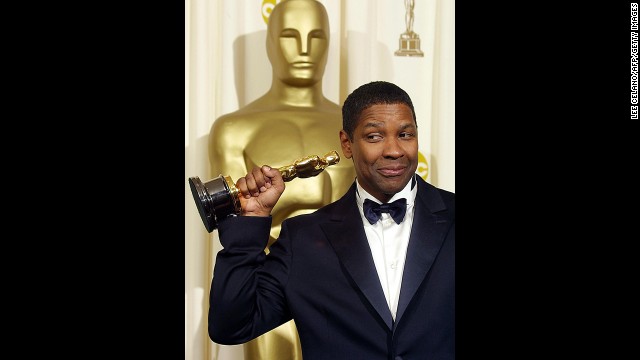 Denzel Washington has a reputation as a nice guy in Hollywood, so his transformation into the monstrous detective Alonzo in "Training Day" was incredible to watch. After already winning a best supporting actor statuette for "Glory," Washington took home the best actor award for "Training Day," making him the first African-American to win both.
Denzel Washington has a reputation as a nice guy in Hollywood, so his transformation into the monstrous detective Alonzo in "Training Day" was incredible to watch. After already winning a best supporting actor statuette for "Glory," Washington took home the best actor award for "Training Day," making him the first African-American to win both. 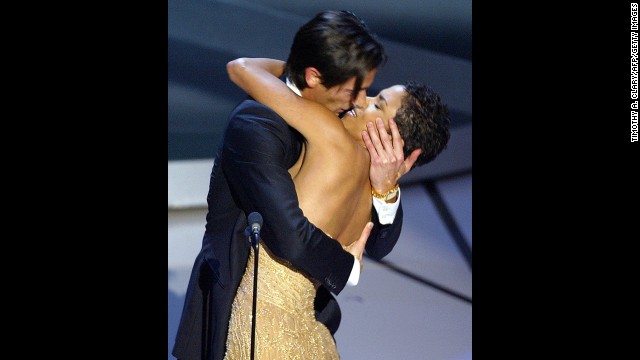 Adrien Brody appeared so thrilled when he won best actor award for "The Pianist" he even got Oscar presenter Halle Berry caught up in the moment with a passionate kiss at the 2003 ceremony. "I bet they didn't tell you that was in the gift bag," he joked when he finished. It was his first nomination and win.
Adrien Brody appeared so thrilled when he won best actor award for "The Pianist" he even got Oscar presenter Halle Berry caught up in the moment with a passionate kiss at the 2003 ceremony. "I bet they didn't tell you that was in the gift bag," he joked when he finished. It was his first nomination and win. 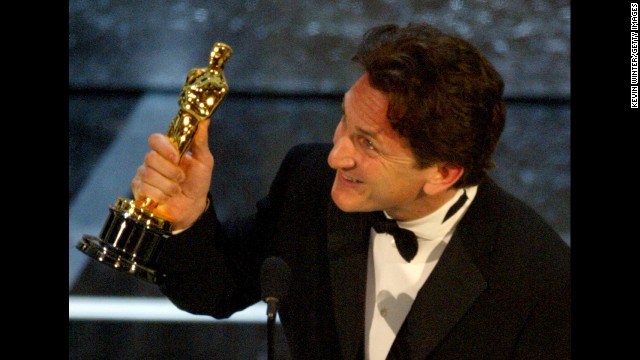 The Oscar race for best actor was a tough one when Sean Penn faced off with Jude Law for "Cold Mountain" and Bill Murray for "Lost in Translation," among others. In the end, it was Penn's work in "Mystic River" that earned him his first Academy Award.
The Oscar race for best actor was a tough one when Sean Penn faced off with Jude Law for "Cold Mountain" and Bill Murray for "Lost in Translation," among others. In the end, it was Penn's work in "Mystic River" that earned him his first Academy Award. 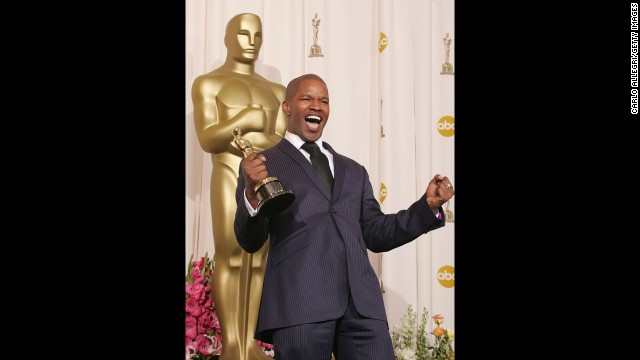 Before "Ray," Jamie Foxx was known primarily as a comedian -- the kind who would star in a popcorn flick like "Booty Call." But after his portrayal of singer Ray Charles in a musical biography, people realized he had been underestimated as an actor. The academy started paying attention, too, and gave Foxx two nominations for the 2005 ceremony: one for best actor for "Ray" and another for best supporting actor for "Collateral." He didn't win in the best supporting category, but we bet he's been able to live with that loss.
Before "Ray," Jamie Foxx was known primarily as a comedian -- the kind who would star in a popcorn flick like "Booty Call." But after his portrayal of singer Ray Charles in a musical biography, people realized he had been underestimated as an actor. The academy started paying attention, too, and gave Foxx two nominations for the 2005 ceremony: one for best actor for "Ray" and another for best supporting actor for "Collateral." He didn't win in the best supporting category, but we bet he's been able to live with that loss. 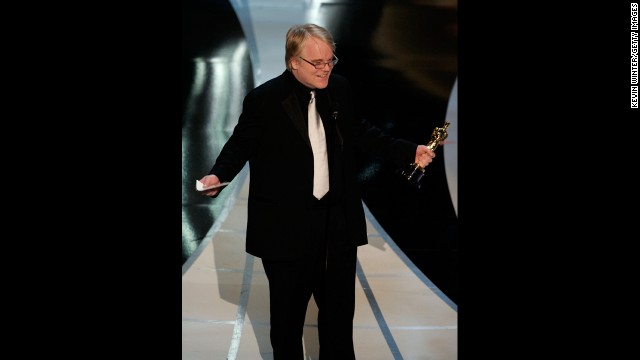 Philip Seymour Hoffman's portrayal of writer Truman Capote in "Capote" was the kind of rock-solid immersion audiences had come to expect from the actor. He got his due with the best actor award -- his only Oscar.
Philip Seymour Hoffman's portrayal of writer Truman Capote in "Capote" was the kind of rock-solid immersion audiences had come to expect from the actor. He got his due with the best actor award -- his only Oscar. 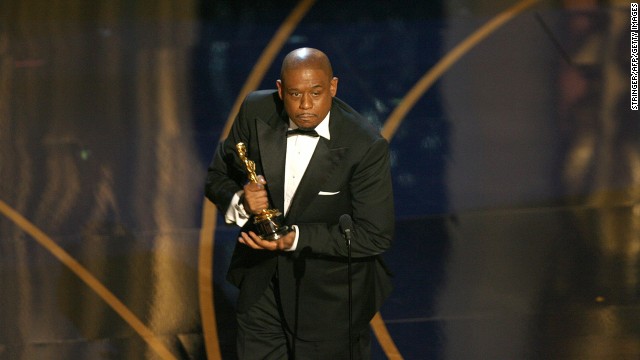 Until "The Last King of Scotland," Forest Whitaker had been completely overlooked by the academy. But after he turned in a masterful portrayal of Ugandan dictator Idi Amin, academy voters handed him the Oscar.
Until "The Last King of Scotland," Forest Whitaker had been completely overlooked by the academy. But after he turned in a masterful portrayal of Ugandan dictator Idi Amin, academy voters handed him the Oscar. 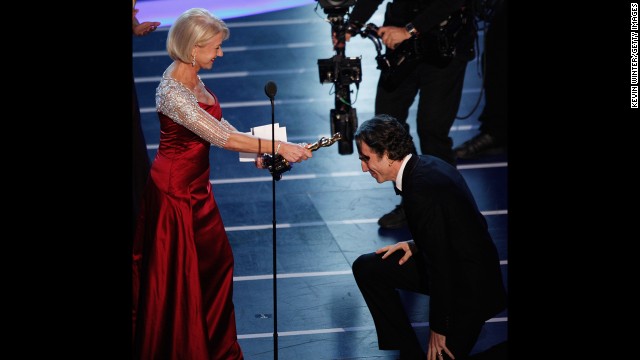 If Daniel Day-Lewis is in the running, chances are there will be an award for him. The actor won his second best actor Oscar for "There Will Be Blood." He receives the award from Helen Mirren at the 2008 ceremony.
If Daniel Day-Lewis is in the running, chances are there will be an award for him. The actor won his second best actor Oscar for "There Will Be Blood." He receives the award from Helen Mirren at the 2008 ceremony. 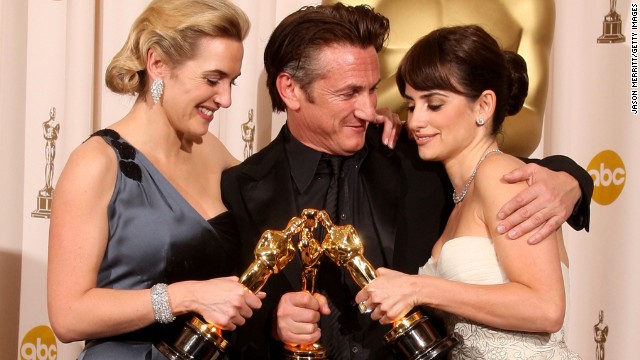 Sean Penn, here with best actress Kate Winslet, left, and best supporting actress Penelope Cruz, gave the performance of a lifetime as openly gay politician and activist Harvey Milk in "Milk." The academy rewarded Penn with his second best actor Oscar at the 2009 ceremony.
Sean Penn, here with best actress Kate Winslet, left, and best supporting actress Penelope Cruz, gave the performance of a lifetime as openly gay politician and activist Harvey Milk in "Milk." The academy rewarded Penn with his second best actor Oscar at the 2009 ceremony. 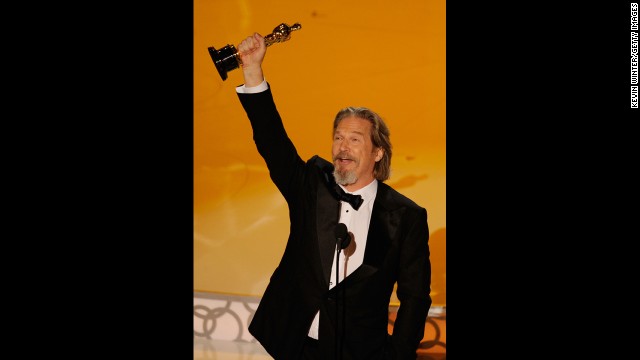 Jeff Bridges was understandably ecstatic when he won the best actor Oscar for "Crazy Heart." Bridges had been nominated four times before, and, with competition from George Clooney in "Up in the Air" and Jeremy Renner in "The Hurt Locker," his wasn't an obvious win. So when his name was called at the 2010 ceremony, Bridges relished the moment in his acceptance speech: "Thank you, mom and dad, for turning me on to such a groovy profession," he said.
Jeff Bridges was understandably ecstatic when he won the best actor Oscar for "Crazy Heart." Bridges had been nominated four times before, and, with competition from George Clooney in "Up in the Air" and Jeremy Renner in "The Hurt Locker," his wasn't an obvious win. So when his name was called at the 2010 ceremony, Bridges relished the moment in his acceptance speech: "Thank you, mom and dad, for turning me on to such a groovy profession," he said. 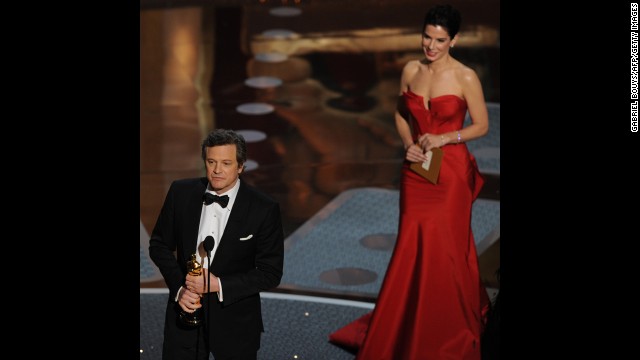 Colin Firth's portrayal of King George VI's fight to overcome a speech impediment beat out Jesse Eisenberg ("The Social Network") and James Franco ("127 Hours"), among others, to win the best actor Oscar.
Colin Firth's portrayal of King George VI's fight to overcome a speech impediment beat out Jesse Eisenberg ("The Social Network") and James Franco ("127 Hours"), among others, to win the best actor Oscar. 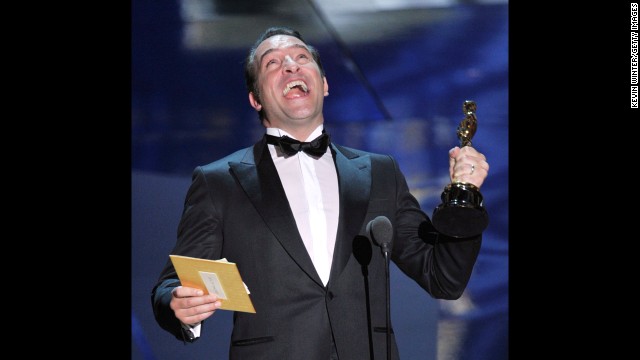 "The Artist," a silent, black-and-white movie, was a celebration of old-school film. Its star, French actor Jean Dujardin, seemed to have a virtual lock on the best actor Oscar, even though he was competing against the likes of George Clooney and Brad Pitt. When awards night arrived in 2012, Dujardin walked away with the prize.
"The Artist," a silent, black-and-white movie, was a celebration of old-school film. Its star, French actor Jean Dujardin, seemed to have a virtual lock on the best actor Oscar, even though he was competing against the likes of George Clooney and Brad Pitt. When awards night arrived in 2012, Dujardin walked away with the prize. 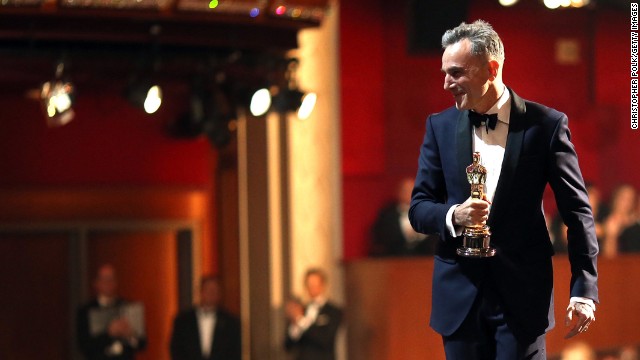 Once again, the Oscar race for best actor was jam-packed with amazing performances, from Bradley Cooper in "Silver Linings Playbook" to Denzel Washington in "Flight." But Daniel Day-Lewis completely transformed himself into the 16th U.S. president for Steven Spielberg's "Lincoln," and he walked away with the honors at the 2013 ceremony, becoming the first three-time best actor winner. A history of Oscar-winning best actors Emil Jannings (1929) Warner Baxter (1930) George Arliss (1930) Lionel Barrymore (1931) Wallace Beery (1932) Fredric March (1932) Charles Laughton (1934) Clark Gable (1935) Victor McLaglen (1936) Paul Muni (1937) Spencer Tracy (1938) Spencer Tracy (1939) Robert Donat (1940) James Stewart (1941) Gary Cooper (1942) James Cagney (1943) Paul Lukas (1944) Bing Crosby (1945) Ray Milland (1946) Fredric March (1947) Ronald Colman (1948) Laurence Olivier (1949) Broderick Crawford (1950) José Ferrer (1951) Humphrey Bogart (1952) Gary Cooper (1953) William Holden (1954) Marlon Brando (1955) Ernest Borgnine (1956) Yul Brynner (1957) Alec Guinness (1958) David Niven (1959) Charlton Heston (1960) Burt Lancaster (1961) Maximilian Schell (1962) Gregory Peck (1963) Sidney Poitier (1964) Rex Harrison (1965) Lee Marvin (1966) Paul Scofield (1967) Rod Steiger (1968) Cliff Robertson (1969) John Wayne (1970) George C. Scott (1971) Gene Hackman (1972) Marlon Brando (1973) Jack Lemmon (1974) Art Carney (1975) Jack Nicholson (1976) Peter Finch (1977) Richard Dreyfuss (1978) Jon Voight (1979) Dustin Hoffman (1980) Robert De Niro (1981) Henry Fonda (1982) Ben Kingsley (1983) Robert Duvall (1984) F. Murray Abraham (1985) William Hurt (1986) Paul Newman (1987) Michael Douglas (1988) Dustin Hoffman (1989) Daniel Day-Lewis (1990) Jeremy Irons (1991) Anthony Hopkins (1992) Al Pacino (1993) Tom Hanks (1994) Tom Hanks (1995) Nicolas Cage (1996) Geoffrey Rush (1997) Jack Nicholson (1998) Roberto Benigni (1999) Kevin Spacey (2000) Russell Crowe (2001) Denzel Washington (2002) Adrien Brody (2003) Sean Penn (2004) Jamie Foxx (2005) Philip Seymour Hoffman (2006) Forest Whitaker (2007) Daniel Day-Lewis (2008) Sean Penn (2009) Jeff Bridges (2010) Colin Firth (2011) Jean Dujardin (2012) Daniel Day-Lewis (2013) HIDE CAPTION << <
Once again, the Oscar race for best actor was jam-packed with amazing performances, from Bradley Cooper in "Silver Linings Playbook" to Denzel Washington in "Flight." But Daniel Day-Lewis completely transformed himself into the 16th U.S. president for Steven Spielberg's "Lincoln," and he walked away with the honors at the 2013 ceremony, becoming the first three-time best actor winner. A history of Oscar-winning best actors Emil Jannings (1929) Warner Baxter (1930) George Arliss (1930) Lionel Barrymore (1931) Wallace Beery (1932) Fredric March (1932) Charles Laughton (1934) Clark Gable (1935) Victor McLaglen (1936) Paul Muni (1937) Spencer Tracy (1938) Spencer Tracy (1939) Robert Donat (1940) James Stewart (1941) Gary Cooper (1942) James Cagney (1943) Paul Lukas (1944) Bing Crosby (1945) Ray Milland (1946) Fredric March (1947) Ronald Colman (1948) Laurence Olivier (1949) Broderick Crawford (1950) José Ferrer (1951) Humphrey Bogart (1952) Gary Cooper (1953) William Holden (1954) Marlon Brando (1955) Ernest Borgnine (1956) Yul Brynner (1957) Alec Guinness (1958) David Niven (1959) Charlton Heston (1960) Burt Lancaster (1961) Maximilian Schell (1962) Gregory Peck (1963) Sidney Poitier (1964) Rex Harrison (1965) Lee Marvin (1966) Paul Scofield (1967) Rod Steiger (1968) Cliff Robertson (1969) John Wayne (1970) George C. Scott (1971) Gene Hackman (1972) Marlon Brando (1973) Jack Lemmon (1974) Art Carney (1975) Jack Nicholson (1976) Peter Finch (1977) Richard Dreyfuss (1978) Jon Voight (1979) Dustin Hoffman (1980) Robert De Niro (1981) Henry Fonda (1982) Ben Kingsley (1983) Robert Duvall (1984) F. Murray Abraham (1985) William Hurt (1986) Paul Newman (1987) Michael Douglas (1988) Dustin Hoffman (1989) Daniel Day-Lewis (1990) Jeremy Irons (1991) Anthony Hopkins (1992) Al Pacino (1993) Tom Hanks (1994) Tom Hanks (1995) Nicolas Cage (1996) Geoffrey Rush (1997) Jack Nicholson (1998) Roberto Benigni (1999) Kevin Spacey (2000) Russell Crowe (2001) Denzel Washington (2002) Adrien Brody (2003) Sean Penn (2004) Jamie Foxx (2005) Philip Seymour Hoffman (2006) Forest Whitaker (2007) Daniel Day-Lewis (2008) Sean Penn (2009) Jeff Bridges (2010) Colin Firth (2011) Jean Dujardin (2012) Daniel Day-Lewis (2013) HIDE CAPTION << < 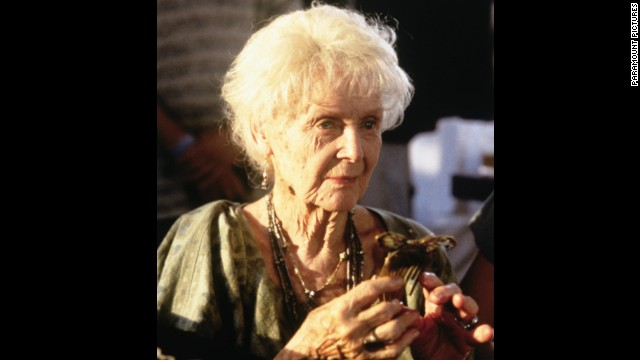 At 87, Gloria Stuart was nominated for best supporting actress for her performance in 1997's "Titanic" -- 65 years after she made her first movie. She remains the oldest person ever nominated for a competitive Oscar.
At 87, Gloria Stuart was nominated for best supporting actress for her performance in 1997's "Titanic" -- 65 years after she made her first movie. She remains the oldest person ever nominated for a competitive Oscar. 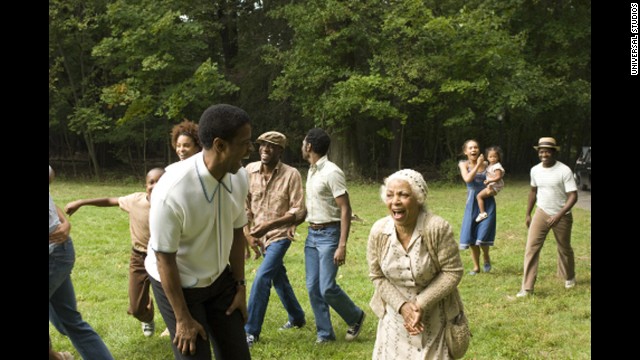 Ruby Dee, who earned a supporting actress nomination for 2007's "American Gangster," was 85 at the time of her nomination. She's still going strong at 91.
Ruby Dee, who earned a supporting actress nomination for 2007's "American Gangster," was 85 at the time of her nomination. She's still going strong at 91. 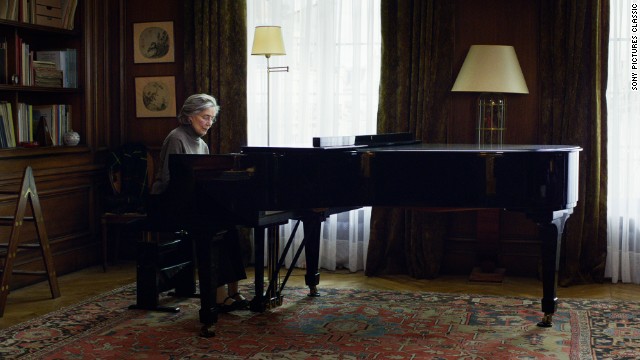 Emmanuelle Riva received a best actress nomination for 2012's "Amour" at 85. Riva's long career in the movies includes "Hiroshima Mon Amour" (1959) and "Blue" (1993)
Emmanuelle Riva received a best actress nomination for 2012's "Amour" at 85. Riva's long career in the movies includes "Hiroshima Mon Amour" (1959) and "Blue" (1993)  Despite a long career in film -- including the key role as Deep Throat in 1976's "All the President's Men" -- Hal Holbrook didn't get an Oscar nomination until he was 82. He was nominated for best supporting actor for 2007's "Into the Wild."
Despite a long career in film -- including the key role as Deep Throat in 1976's "All the President's Men" -- Hal Holbrook didn't get an Oscar nomination until he was 82. He was nominated for best supporting actor for 2007's "Into the Wild." 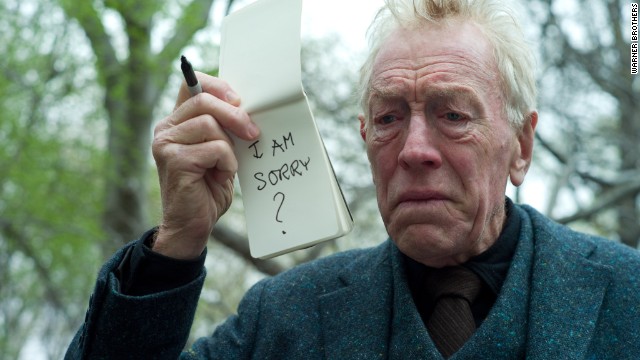 The great Swedish actor Max von Sydow has been nominated for two Oscars. His first nomination came in 1989 for "Pelle the Conquerer," and the second came when he was 82, for 2011's "Extremely Loud & Incredibly Close."
The great Swedish actor Max von Sydow has been nominated for two Oscars. His first nomination came in 1989 for "Pelle the Conquerer," and the second came when he was 82, for 2011's "Extremely Loud & Incredibly Close." 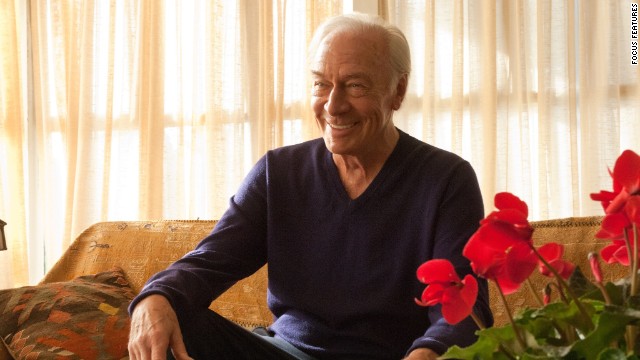 At age 82, Christopher Plummer received his second Oscar nomination -- and first Oscar win. He earned a best supporting actor award for "Beginners" in 2011. His other nomination came for 2009's "The Last Station." Plummer is the oldest person to win an acting Oscar.
At age 82, Christopher Plummer received his second Oscar nomination -- and first Oscar win. He earned a best supporting actor award for "Beginners" in 2011. His other nomination came for 2009's "The Last Station." Plummer is the oldest person to win an acting Oscar. 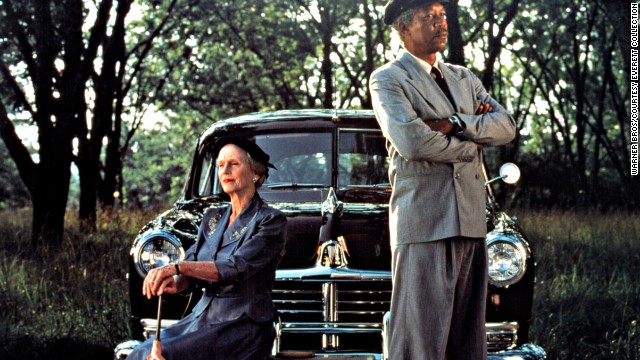 The great Jessica Tandy received her first Oscar nomination, a best actress nod for 1989's "Driving Miss Daisy," when she was 80. She won for that film, and followed up with a nomination for "Fried Green Tomatoes" two years later.
The great Jessica Tandy received her first Oscar nomination, a best actress nod for 1989's "Driving Miss Daisy," when she was 80. She won for that film, and followed up with a nomination for "Fried Green Tomatoes" two years later. 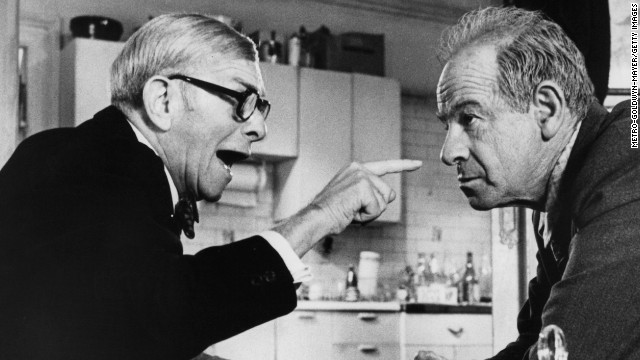 George Burns, left, had been in show business for decades, but hadn't appeared in movies for more than 30 years when he took the role opposite Walter Matthau in 1975's "The Sunshine Boys" because his friend, Jack Benny, had died. After winning a supporting actor Oscar at 80, he appeared in several more films, including "Oh, God!" (1977) and "Going in Style" (1979).
George Burns, left, had been in show business for decades, but hadn't appeared in movies for more than 30 years when he took the role opposite Walter Matthau in 1975's "The Sunshine Boys" because his friend, Jack Benny, had died. After winning a supporting actor Oscar at 80, he appeared in several more films, including "Oh, God!" (1977) and "Going in Style" (1979). 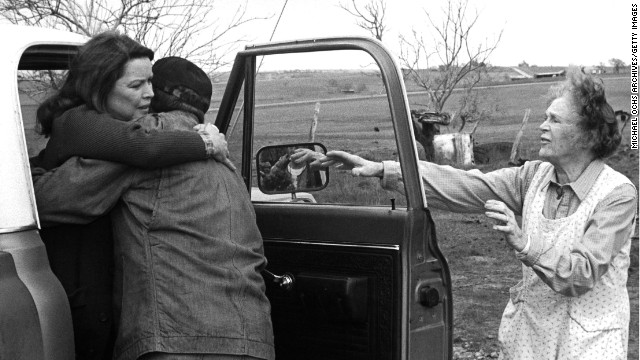 Eva Le Gallienne, right, was 80 when nominated for best supporting actress for 1980's "Resurrection." The film co-stars Ellen Burstyn, left, and Roberts Blossom.
Eva Le Gallienne, right, was 80 when nominated for best supporting actress for 1980's "Resurrection." The film co-stars Ellen Burstyn, left, and Roberts Blossom. 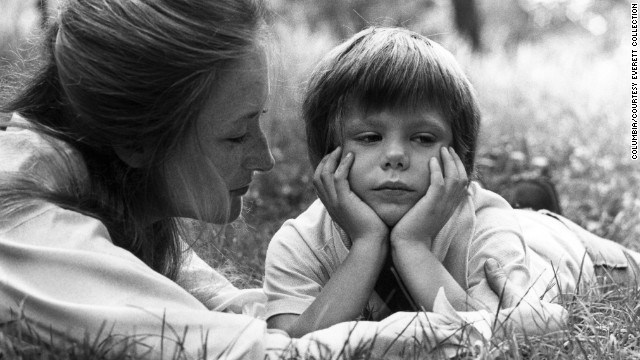 But you don't need to be an adult to be nominated for an Oscar. Several nominees weren't even old enough to drink when they were picked. The youngest nominee of all time is Justin Henry from 1979's "Kramer vs. Kramer" (right, with Meryl Streep). He was 8 when he was nominated for best supporting actor.
But you don't need to be an adult to be nominated for an Oscar. Several nominees weren't even old enough to drink when they were picked. The youngest nominee of all time is Justin Henry from 1979's "Kramer vs. Kramer" (right, with Meryl Streep). He was 8 when he was nominated for best supporting actor. 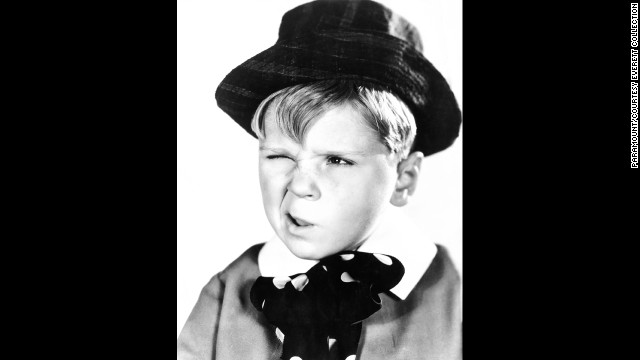 Jackie Cooper, who grew up to have a long acting and directing career, was 9 when he was nominated for best actor for 1931's "Skippy."
Jackie Cooper, who grew up to have a long acting and directing career, was 9 when he was nominated for best actor for 1931's "Skippy." 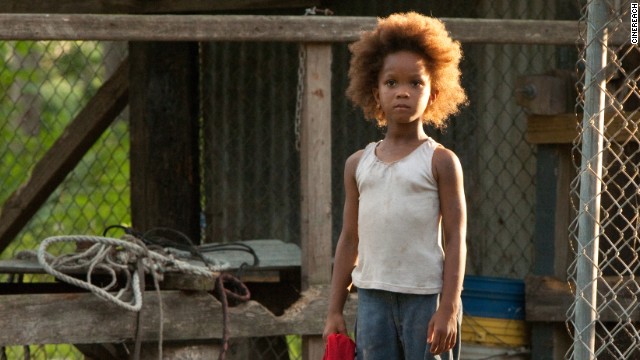 Just last year, Quvenzhane Wallis was nominated for best actress for "Beasts of the Southern Wild." She was 9 at the time. She had a small role in one of this year's Oscar front-runners, "12 Years a Slave."
Just last year, Quvenzhane Wallis was nominated for best actress for "Beasts of the Southern Wild." She was 9 at the time. She had a small role in one of this year's Oscar front-runners, "12 Years a Slave." 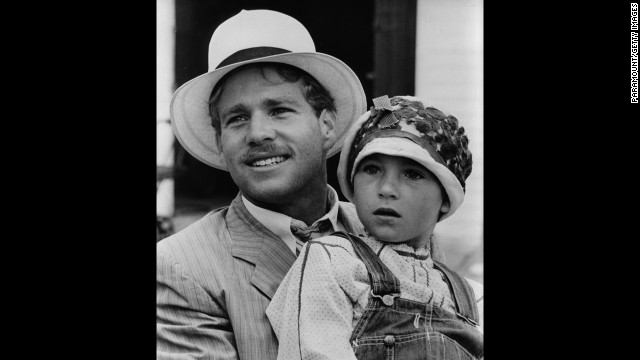 Tatum O'Neal, being held by father Ryan, is the youngest winner of an acting category. She was 10 when she won best supporting actress for "Paper Moon" (1973).
Tatum O'Neal, being held by father Ryan, is the youngest winner of an acting category. She was 10 when she won best supporting actress for "Paper Moon" (1973). 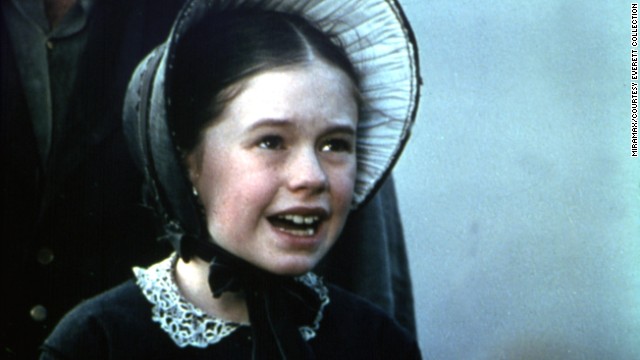 Today, Anna Paquin is one of the stars of the HBO series "True Blood." Two decades ago, she won best supporting actress for her performance in "The Piano" (1993). She was 11 at the time.
Today, Anna Paquin is one of the stars of the HBO series "True Blood." Two decades ago, she won best supporting actress for her performance in "The Piano" (1993). She was 11 at the time. 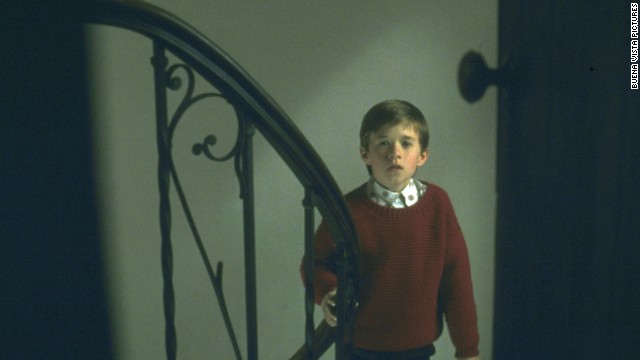 Haley Joel Osment was 11 when he was nominated for best supporting actor. He earned the nod for his performance as a child who sees dead people in 1999's "The Sixth Sense."
Haley Joel Osment was 11 when he was nominated for best supporting actor. He earned the nod for his performance as a child who sees dead people in 1999's "The Sixth Sense." 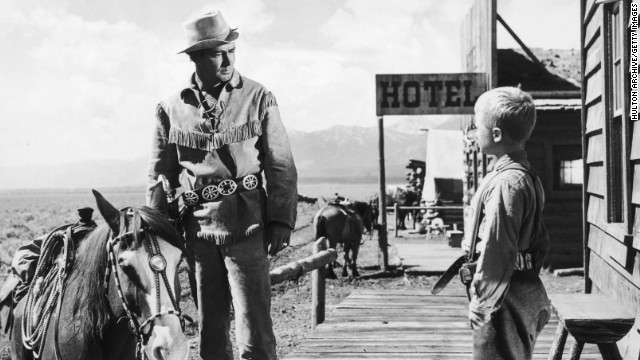 Brandon De Wilde, here with Alan Ladd, got one of the best lines in film history: "Shane, come back!" At 11, he earned a best supporting actor nomination for his performance in "Shane" (1953).
Brandon De Wilde, here with Alan Ladd, got one of the best lines in film history: "Shane, come back!" At 11, he earned a best supporting actor nomination for his performance in "Shane" (1953). 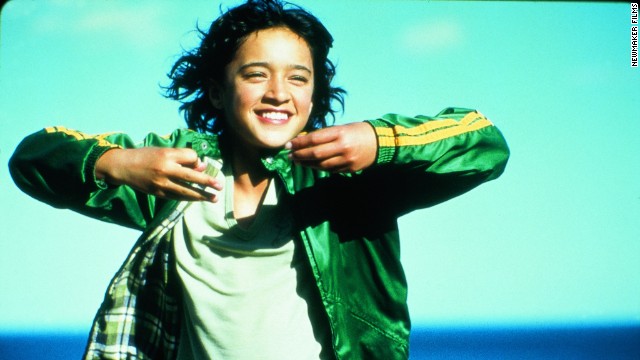 New Zealander Keisha Castle-Hughes, then 13, earned a best actress nomination for her performance in 2003's "Whale Rider." She later appeared in "Star Wars Episode III: Revenge of the Sith."
New Zealander Keisha Castle-Hughes, then 13, earned a best actress nomination for her performance in 2003's "Whale Rider." She later appeared in "Star Wars Episode III: Revenge of the Sith." 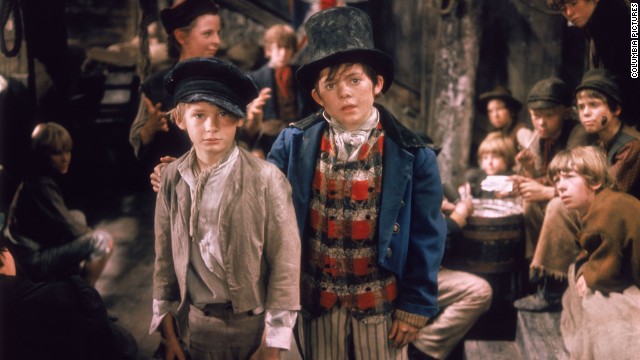 Jack Wild, right (with Mark Lester), played the Artful Dodger in the 1968 best picture winner, "Oliver!" He was 16 when he earned a best supporting actor nomination.
Jack Wild, right (with Mark Lester), played the Artful Dodger in the 1968 best picture winner, "Oliver!" He was 16 when he earned a best supporting actor nomination. 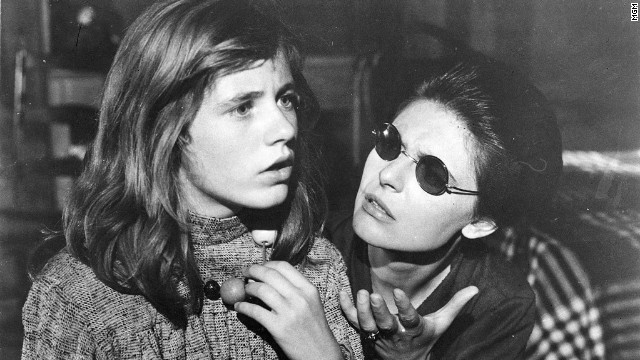 Patty Duke, whose career has stretched over more than five decades, was 16 when she won best supporting actress for her performance as Helen Keller in "The Miracle Worker" (1962). Anne Bancroft, right, won best actress for her portrayal of Annie Sullivan. Oscar nominees over 80 -- and under 18 Oscar nominees over 80 -- and under 18 Oscar nominees over 80 -- and under 18 Oscar nominees over 80 -- and under 18 Oscar nominees over 80 -- and under 18 Oscar nominees over 80 -- and under 18 Oscar nominees over 80 -- and under 18 Oscar nominees over 80 -- and under 18 Oscar nominees over 80 -- and under 18 Oscar nominees over 80 -- and under 18 Oscar nominees over 80 -- and under 18 Oscar nominees over 80 -- and under 18 Oscar nominees over 80 -- and under 18 Oscar nominees over 80 -- and under 18 Oscar nominees over 80 -- and under 18 Oscar nominees over 80 -- and under 18 Oscar nominees over 80 -- and under 18 Oscar nominees over 80 -- and under 18 Oscar nominees over 80 -- and under 18 Oscar nominees over 80 -- and under 18 HIDE CAPTION << <
Patty Duke, whose career has stretched over more than five decades, was 16 when she won best supporting actress for her performance as Helen Keller in "The Miracle Worker" (1962). Anne Bancroft, right, won best actress for her portrayal of Annie Sullivan. Oscar nominees over 80 -- and under 18 Oscar nominees over 80 -- and under 18 Oscar nominees over 80 -- and under 18 Oscar nominees over 80 -- and under 18 Oscar nominees over 80 -- and under 18 Oscar nominees over 80 -- and under 18 Oscar nominees over 80 -- and under 18 Oscar nominees over 80 -- and under 18 Oscar nominees over 80 -- and under 18 Oscar nominees over 80 -- and under 18 Oscar nominees over 80 -- and under 18 Oscar nominees over 80 -- and under 18 Oscar nominees over 80 -- and under 18 Oscar nominees over 80 -- and under 18 Oscar nominees over 80 -- and under 18 Oscar nominees over 80 -- and under 18 Oscar nominees over 80 -- and under 18 Oscar nominees over 80 -- and under 18 Oscar nominees over 80 -- and under 18 Oscar nominees over 80 -- and under 18 HIDE CAPTION << < 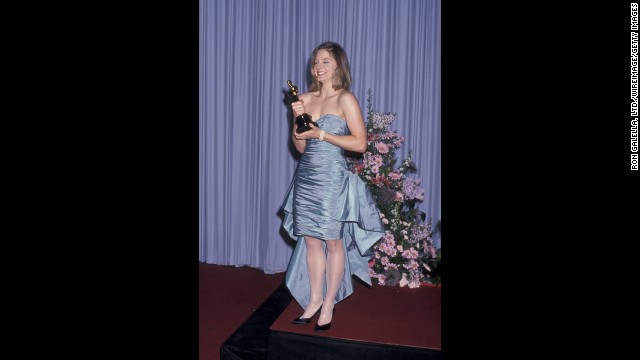 We'll cut 1988 Jodie Foster some slack because she did win a best actress Oscar that year for "The Accused." Instead, we'll blame this sky-blue mullet of a prom dress on it being the '80s -- and on the person who told her it was a good idea to shop off the rack.
We'll cut 1988 Jodie Foster some slack because she did win a best actress Oscar that year for "The Accused." Instead, we'll blame this sky-blue mullet of a prom dress on it being the '80s -- and on the person who told her it was a good idea to shop off the rack. 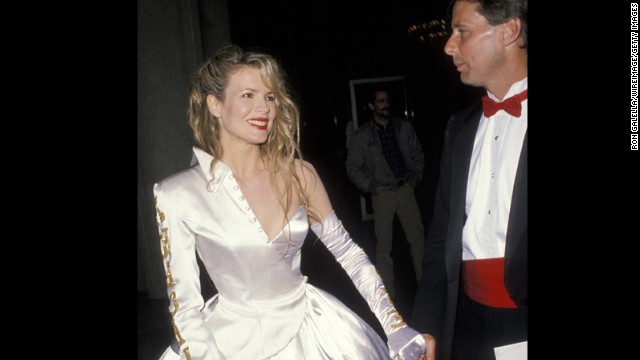 Kim Basinger in "Nine ½ Weeks"? Sign us up. Kim Basinger, fashion designer? Not the best idea. You see what happened when she tried that in 1990.
Kim Basinger in "Nine ½ Weeks"? Sign us up. Kim Basinger, fashion designer? Not the best idea. You see what happened when she tried that in 1990. 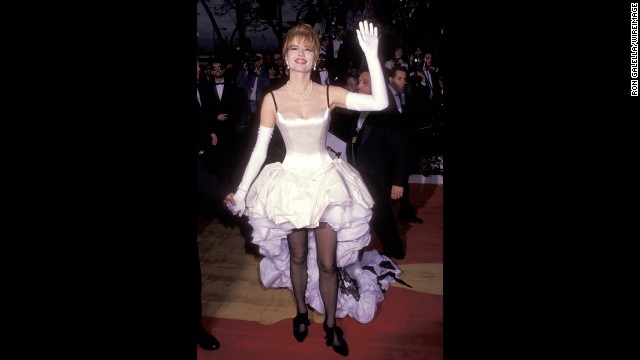 When we saw Geena Davis arrive at the Oscars in 1992 -- she was nominated for "Thelma & Louise" at the time -- we were left with several questions. Where did she leave the front of her dress? Why was there a black-bow motif on her shoes and on the train? Would this unraveling ruffle of confusion have been any better if she just didn't wear the black tights?
When we saw Geena Davis arrive at the Oscars in 1992 -- she was nominated for "Thelma & Louise" at the time -- we were left with several questions. Where did she leave the front of her dress? Why was there a black-bow motif on her shoes and on the train? Would this unraveling ruffle of confusion have been any better if she just didn't wear the black tights? 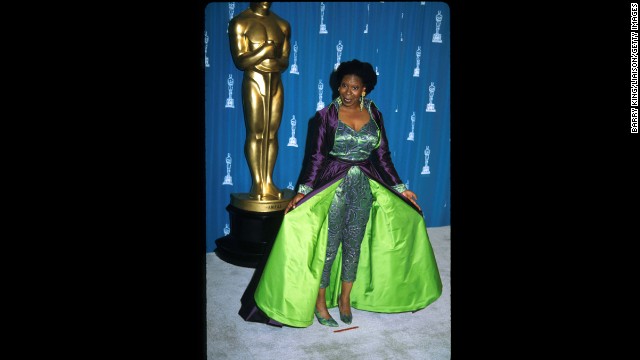 Sometimes we think Whoopi Goldberg intentionally trolls fashion lovers with her red-carpet outfits. In 1993, the Oscar winner -- she'd previously picked up the best supporting actress award for "Ghost" in 1991 -- arrived in a get-up that appeared to take Demi Moore's 1989 look and kick it up a notch with full-length pants, a full skirt and as much neon as possible.
Sometimes we think Whoopi Goldberg intentionally trolls fashion lovers with her red-carpet outfits. In 1993, the Oscar winner -- she'd previously picked up the best supporting actress award for "Ghost" in 1991 -- arrived in a get-up that appeared to take Demi Moore's 1989 look and kick it up a notch with full-length pants, a full skirt and as much neon as possible. 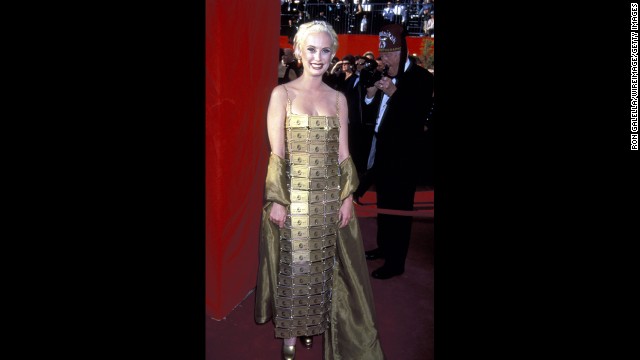 On one hand, Lizzy Gardiner's dress of American Express Gold Cards is certainly ... inspired. The costume designer crafted her own gown in 1995, when she won the best costume design Oscar for "Priscilla, Queen of the Desert." But c'mon, Lizzy -- if you could afford that gold wrap, you could afford enough fabric for an actual dress.
On one hand, Lizzy Gardiner's dress of American Express Gold Cards is certainly ... inspired. The costume designer crafted her own gown in 1995, when she won the best costume design Oscar for "Priscilla, Queen of the Desert." But c'mon, Lizzy -- if you could afford that gold wrap, you could afford enough fabric for an actual dress. 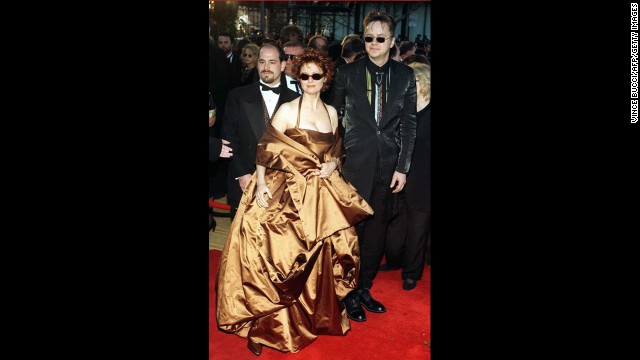 As though satin formalwear isn't already difficult enough to pull off, Susan Sarandon went and had her Dolce & Gabbana dress made in an awkward copper shade to match her hair in 1996. Not that our opinion matters for much: Sarandon won the best actress Oscar that year for "Dead Man Walking," and the dress was donated to the Metropolitan Museum of Art's Costume Institute.
As though satin formalwear isn't already difficult enough to pull off, Susan Sarandon went and had her Dolce & Gabbana dress made in an awkward copper shade to match her hair in 1996. Not that our opinion matters for much: Sarandon won the best actress Oscar that year for "Dead Man Walking," and the dress was donated to the Metropolitan Museum of Art's Costume Institute. 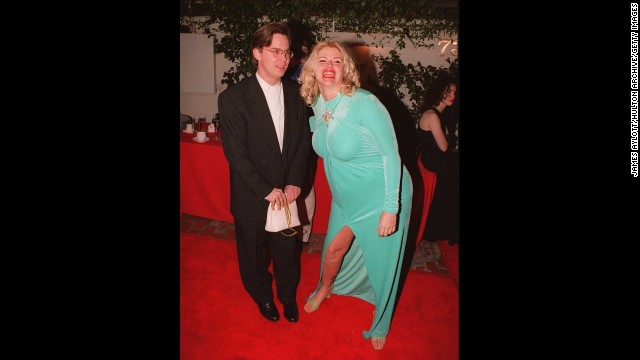 Some fabrics just aren't Oscar-friendly, and velvet is one of them, as Anna Nicole Smith learned after she arrived in this aquamarine number in 1996.
Some fabrics just aren't Oscar-friendly, and velvet is one of them, as Anna Nicole Smith learned after she arrived in this aquamarine number in 1996. 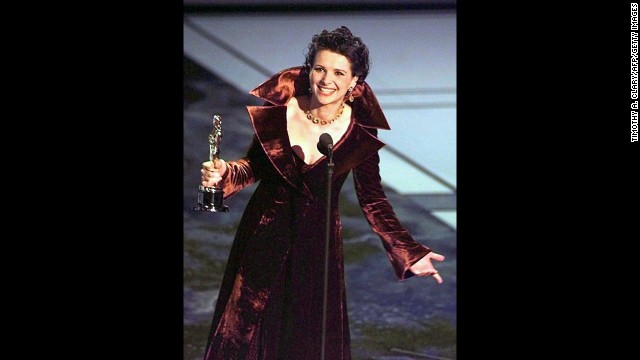 We're positive The Count from "Sesame Street" saw Oscar winner Juliette Binoche at the 1997 awards, did a double-take, and then immediately called Us Weekly for a "who wore it best?" comparison.
We're positive The Count from "Sesame Street" saw Oscar winner Juliette Binoche at the 1997 awards, did a double-take, and then immediately called Us Weekly for a "who wore it best?" comparison. 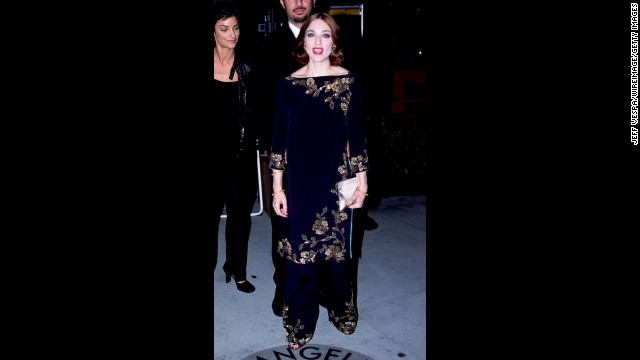 Madonna changes styles -- and accents -- so regularly that it feels like we're being introduced to a new person each time. In 1999, it was Zen Madonna who showed up to a Vanity Fair Oscars party.
Madonna changes styles -- and accents -- so regularly that it feels like we're being introduced to a new person each time. In 1999, it was Zen Madonna who showed up to a Vanity Fair Oscars party. 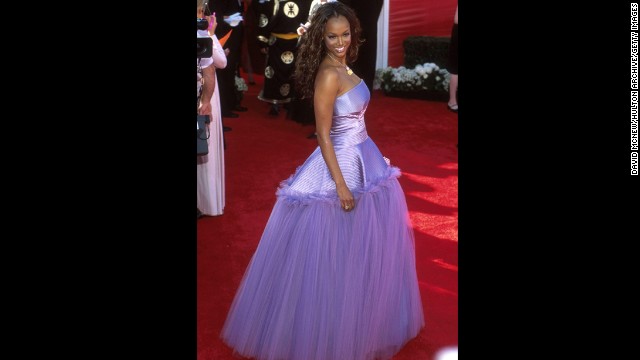 We've waited years to find out which prom-bound teen Tyra Banks stole this frock from before going to the 2000 Academy Awards.
We've waited years to find out which prom-bound teen Tyra Banks stole this frock from before going to the 2000 Academy Awards. 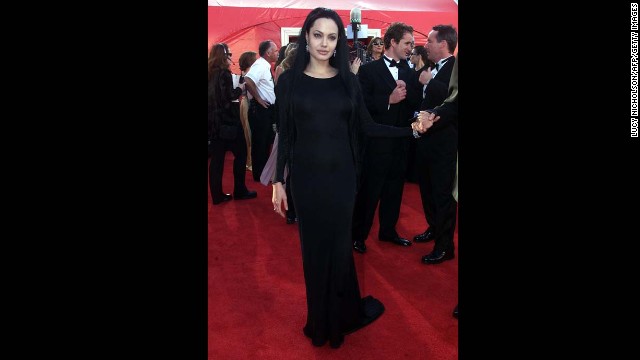 We get it: Angelina Jolie has a personal style. It often involves a lot of black -- and sometimes clingy -- fabrics. But even Morticia Addams would dress it up a bit when going to the Oscars. Especially if she was going to walk away with the best supporting actress award, as Jolie did in 2000.
We get it: Angelina Jolie has a personal style. It often involves a lot of black -- and sometimes clingy -- fabrics. But even Morticia Addams would dress it up a bit when going to the Oscars. Especially if she was going to walk away with the best supporting actress award, as Jolie did in 2000. 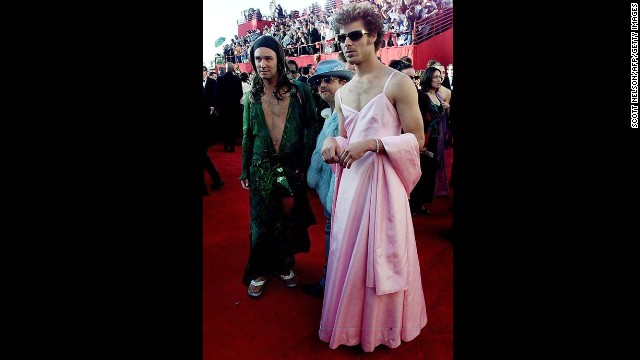 To begin with, we're not fans of knockoffs, so that was strike one against "South Park" creators Trey Parker, left, and Matt Stone, who went to the 2000 Oscars dressed as Jennifer Lopez and Gwyneth Paltrow. And strike two is that we actually liked Paltrow's bubble-gum-pink princess dress from the 1999 Oscars -- even if her own mother hated it.
To begin with, we're not fans of knockoffs, so that was strike one against "South Park" creators Trey Parker, left, and Matt Stone, who went to the 2000 Oscars dressed as Jennifer Lopez and Gwyneth Paltrow. And strike two is that we actually liked Paltrow's bubble-gum-pink princess dress from the 1999 Oscars -- even if her own mother hated it. 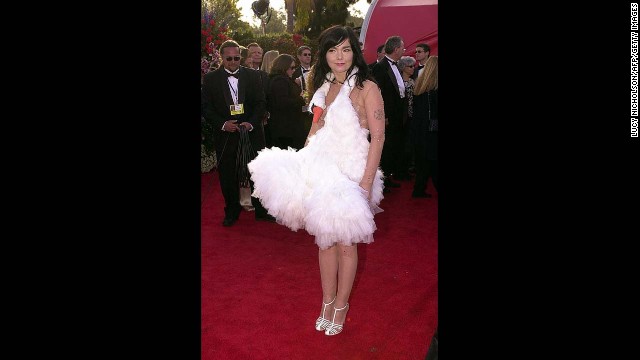 Thanks to this now-iconic swan dress she wore to the 2001 Oscars, Bjork will never get off the worst-dressed list. But is that really a bad thing? Several of you probably have no idea who won what at that year's ceremony, but you do know that there was a lady on the red carpet wearing a bird. In the industry, we call that a publicity win.
Thanks to this now-iconic swan dress she wore to the 2001 Oscars, Bjork will never get off the worst-dressed list. But is that really a bad thing? Several of you probably have no idea who won what at that year's ceremony, but you do know that there was a lady on the red carpet wearing a bird. In the industry, we call that a publicity win. 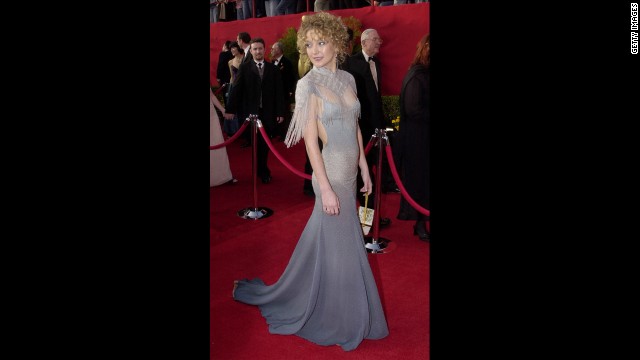 Kate Hudson's 2001 Oscars dress was so bad, it still haunted her a decade later. "It was my first and only nomination," Hudson told Vogue UK in 2011. "I was 21 years old, and to have Stella McCartney dressing me, well, I felt like the hippest, coolest girl in the world." Hudson woke up the next day, turned on the TV and learned she "was on every worst-dressed list possible. So I called Stella and we just laughed ... and she said to me, 'Look babe, it was the hair wasn't it?' "
Kate Hudson's 2001 Oscars dress was so bad, it still haunted her a decade later. "It was my first and only nomination," Hudson told Vogue UK in 2011. "I was 21 years old, and to have Stella McCartney dressing me, well, I felt like the hippest, coolest girl in the world." Hudson woke up the next day, turned on the TV and learned she "was on every worst-dressed list possible. So I called Stella and we just laughed ... and she said to me, 'Look babe, it was the hair wasn't it?' " 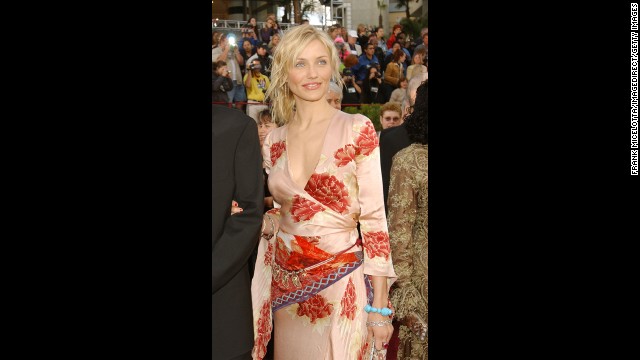 At the time, Cameron Diaz's Asian-inspired floral gown may have seemed unique and progressively on-trend. And perhaps it would have been, had she worn it anywhere other than the Oscars in 2002.
At the time, Cameron Diaz's Asian-inspired floral gown may have seemed unique and progressively on-trend. And perhaps it would have been, had she worn it anywhere other than the Oscars in 2002. 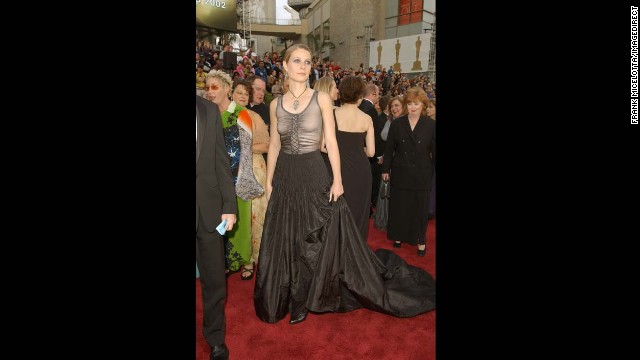 Whenever we stumble across this photo of a frumpy, braless Gwyneth Paltrow at the 2002 Oscars, we want to pat her arm and tell her: "It gets better. You find Goop."
Whenever we stumble across this photo of a frumpy, braless Gwyneth Paltrow at the 2002 Oscars, we want to pat her arm and tell her: "It gets better. You find Goop." 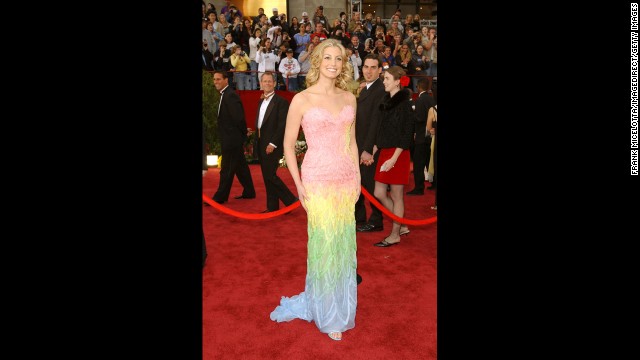 We've looked at Faith Hill in this multicolored frock multiple times, and the urge for a bowl of rainbow sherbet never goes away.
We've looked at Faith Hill in this multicolored frock multiple times, and the urge for a bowl of rainbow sherbet never goes away. 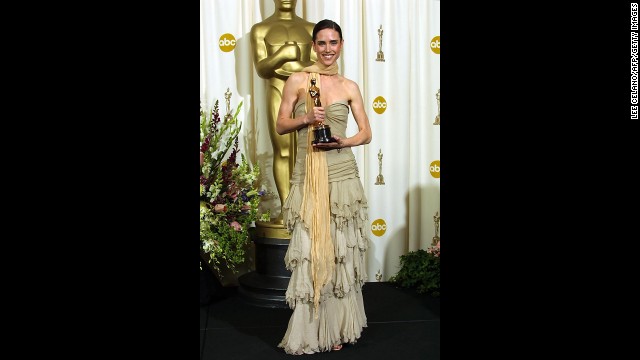 Jennifer Connelly, who won the 2002 Oscar for best supporting actress, arrived at the ceremony that year fully prepared in case the theater was chilly. That turned out to be a very, very bad idea.
Jennifer Connelly, who won the 2002 Oscar for best supporting actress, arrived at the ceremony that year fully prepared in case the theater was chilly. That turned out to be a very, very bad idea. 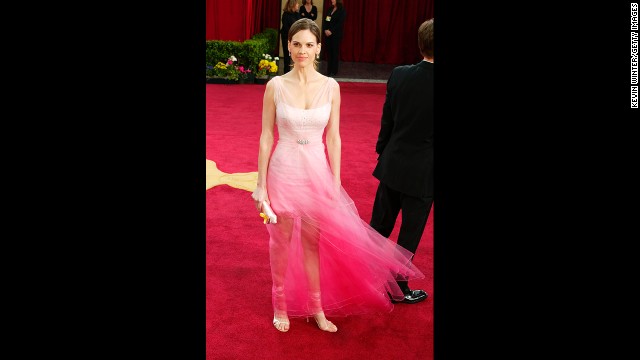 Before Hilary Swank set a new standard for Oscar dresses in 2005, she wore this gauzy pink gown to the 2003 awards. We can see its appeal -- it's breezy! it's bright! -- but it left many critics turned off.
Before Hilary Swank set a new standard for Oscar dresses in 2005, she wore this gauzy pink gown to the 2003 awards. We can see its appeal -- it's breezy! it's bright! -- but it left many critics turned off. 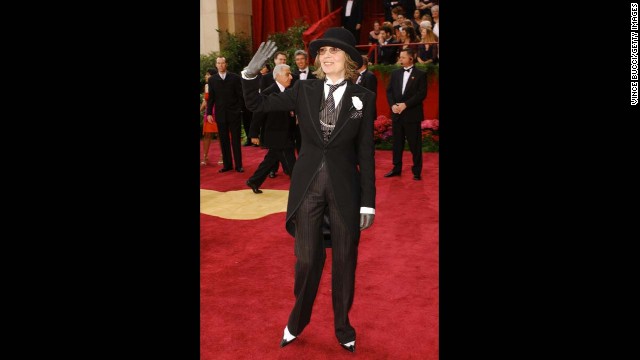 Diane Keaton clearly wanted to channel "Annie Hall" for the 2004 Oscars, but she went too far back in time. Instead of a '70s, feminine menswear vibe, she looked like a Charlie Chaplin impersonator.
Diane Keaton clearly wanted to channel "Annie Hall" for the 2004 Oscars, but she went too far back in time. Instead of a '70s, feminine menswear vibe, she looked like a Charlie Chaplin impersonator. 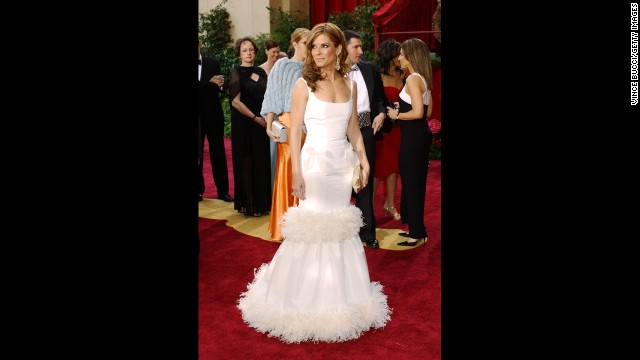 We love Sandra Bullock to bits, but we don't love all the extraneous parts on her 2004 Oscars dress. Did it really need to be tiered and feathered and have bows?
We love Sandra Bullock to bits, but we don't love all the extraneous parts on her 2004 Oscars dress. Did it really need to be tiered and feathered and have bows? 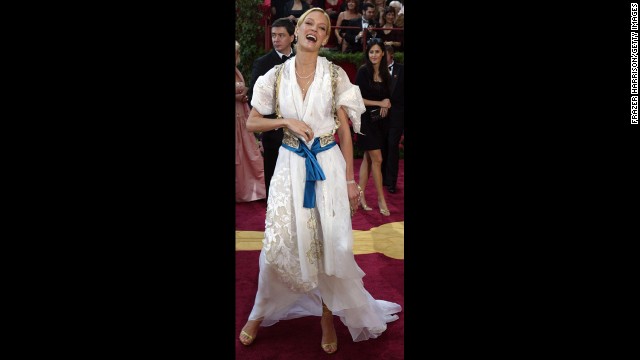 When Uma Thurman attended the Oscars in 2004, she was smack in the middle of promoting Quentin Tarantino's "Kill Bill Vol. 2." Critics probably would've gone easier on her had she worn her character's famous yellow bodysuit instead of this "Heidi"-esque costume of a dress.
When Uma Thurman attended the Oscars in 2004, she was smack in the middle of promoting Quentin Tarantino's "Kill Bill Vol. 2." Critics probably would've gone easier on her had she worn her character's famous yellow bodysuit instead of this "Heidi"-esque costume of a dress. 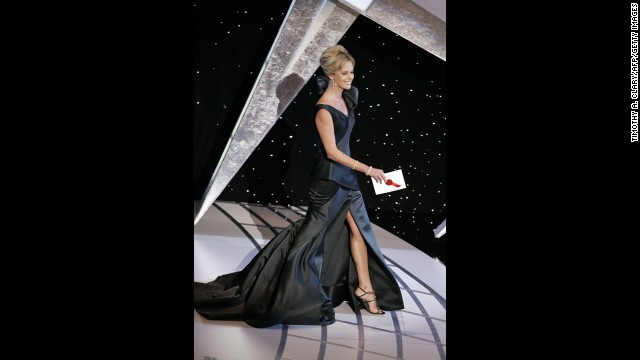 We're pretty sure Charlize Theron attended the 2006 Oscars, but it was hard to tell thanks to this forest-green gown nearly swallowing her whole.
We're pretty sure Charlize Theron attended the 2006 Oscars, but it was hard to tell thanks to this forest-green gown nearly swallowing her whole. 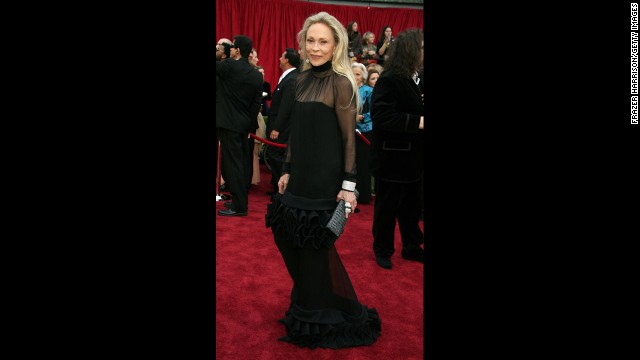 Faye Dunaway's 2007 Oscars dress was so out there -- crazy tailoring, oddly placed ruffles reminiscent of a clown's collar -- that we're going to applaud her for even having the guts to wear it.
Faye Dunaway's 2007 Oscars dress was so out there -- crazy tailoring, oddly placed ruffles reminiscent of a clown's collar -- that we're going to applaud her for even having the guts to wear it. 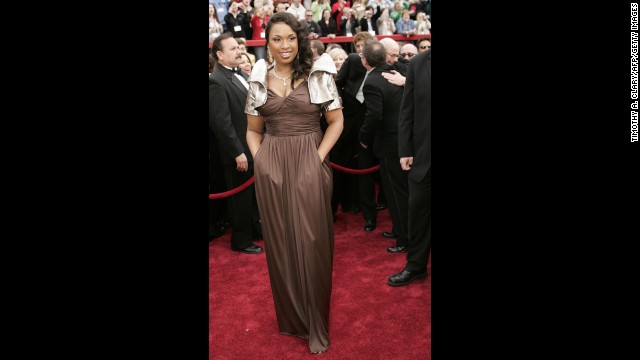 Jennifer Hudson's 2007 Oscars outfit is one that you simply love -- or love to hate. The "Dreamgirls" actress picked up the Oscar for best supporting actress that year, but some people couldn't see past the metallic, structured bolero jacket she wore on the red carpet.
Jennifer Hudson's 2007 Oscars outfit is one that you simply love -- or love to hate. The "Dreamgirls" actress picked up the Oscar for best supporting actress that year, but some people couldn't see past the metallic, structured bolero jacket she wore on the red carpet. 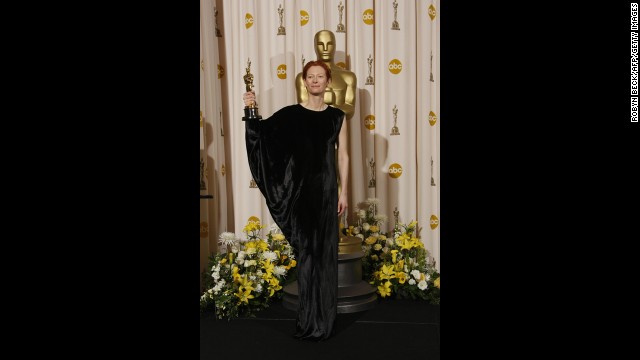 Tilda Swinton has a notably unique sense of style, and we're used to not always fully understanding some of her sartorial choices. But, you know, it's Tilda Swinton, so you go with it. And yet we're not sure even she could explain her 2008 Oscars dress.
Tilda Swinton has a notably unique sense of style, and we're used to not always fully understanding some of her sartorial choices. But, you know, it's Tilda Swinton, so you go with it. And yet we're not sure even she could explain her 2008 Oscars dress. 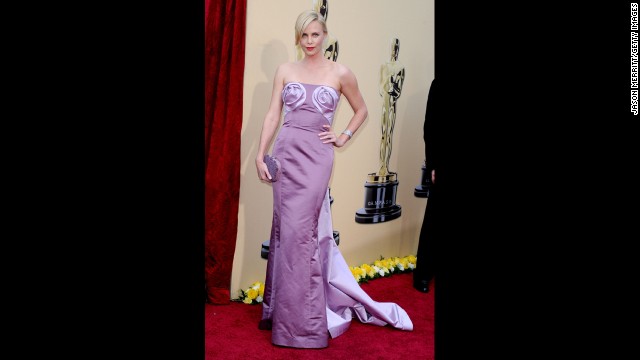 In 2010, Charlize Theron's daring sense of fashion struck again when she thought having rosettes placed directly over her breasts would be a good idea.
In 2010, Charlize Theron's daring sense of fashion struck again when she thought having rosettes placed directly over her breasts would be a good idea. 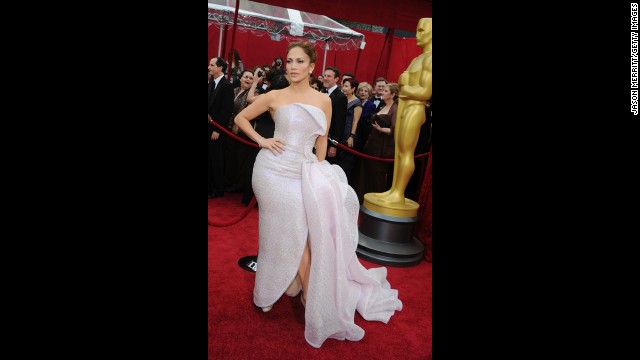 Do you think Jennifer Lopez noticed that there was an unnecessary monster ruffle attacking her otherwise acceptable dress at the 2010 Oscars? Or was she just choosing to ignore it?
Do you think Jennifer Lopez noticed that there was an unnecessary monster ruffle attacking her otherwise acceptable dress at the 2010 Oscars? Or was she just choosing to ignore it? 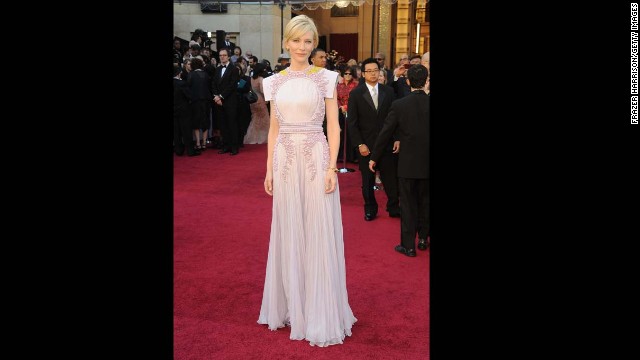 The pleated skirt of Cate Blanchett's pale purple 2011 Oscars dress was beautifully delicate, but we hated the bodice. Something about the beading of the gown's top half reminded of us of the kind of outbreak you'd see in a sci-fi movie, and it still makes our skin crawl.
The pleated skirt of Cate Blanchett's pale purple 2011 Oscars dress was beautifully delicate, but we hated the bodice. Something about the beading of the gown's top half reminded of us of the kind of outbreak you'd see in a sci-fi movie, and it still makes our skin crawl. 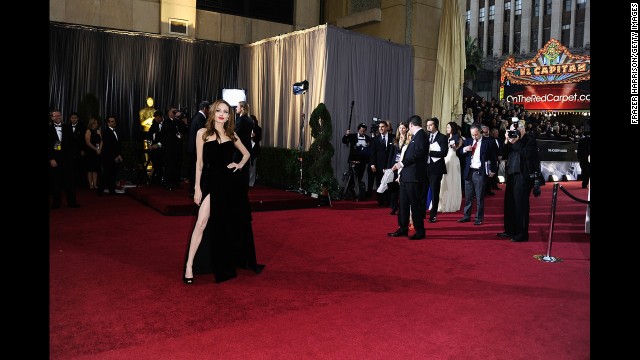 Angelina Jolie's right leg at the 2012 Oscars: Never. Forget.
Angelina Jolie's right leg at the 2012 Oscars: Never. Forget. 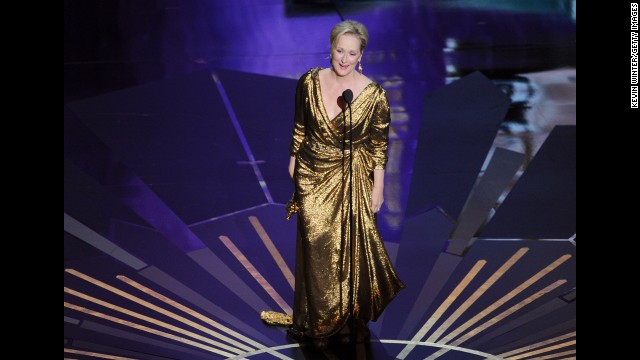 Meryl Streep's awesomeness can't be tarnished by one bad dress, but the gold wrap she wore to the 2012 Oscars -- you remember, the one that looked strangely like spray-painted aluminum foil -- tried mightily to sully the Oscar winner's rep.
Meryl Streep's awesomeness can't be tarnished by one bad dress, but the gold wrap she wore to the 2012 Oscars -- you remember, the one that looked strangely like spray-painted aluminum foil -- tried mightily to sully the Oscar winner's rep. 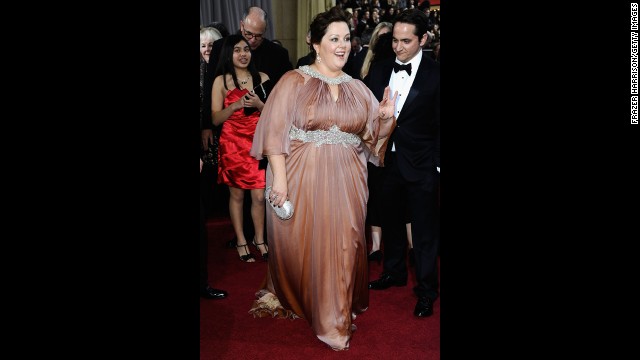 We love Melissa McCarthy so much that we've pre-emptively pledged to see each and every one of her movies, including the poorly reviewed ones. That is why it pained us to see her wear this awkward dress to the 2012 Oscars.
We love Melissa McCarthy so much that we've pre-emptively pledged to see each and every one of her movies, including the poorly reviewed ones. That is why it pained us to see her wear this awkward dress to the 2012 Oscars. 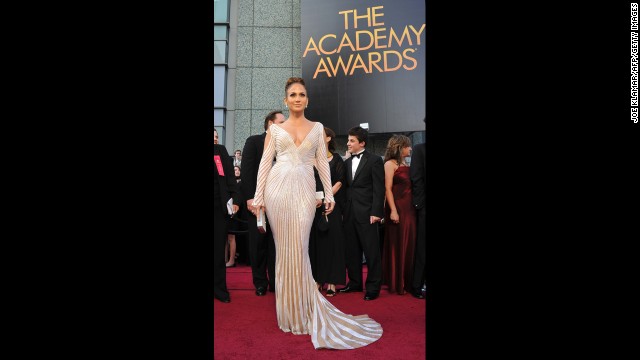 We didn't mind Jennifer Lopez's sleek, form-fitting gown at the 2012 Oscars all that much ... until we realized that it was cut so low it was a wardrobe malfunction waiting to happen.
We didn't mind Jennifer Lopez's sleek, form-fitting gown at the 2012 Oscars all that much ... until we realized that it was cut so low it was a wardrobe malfunction waiting to happen. 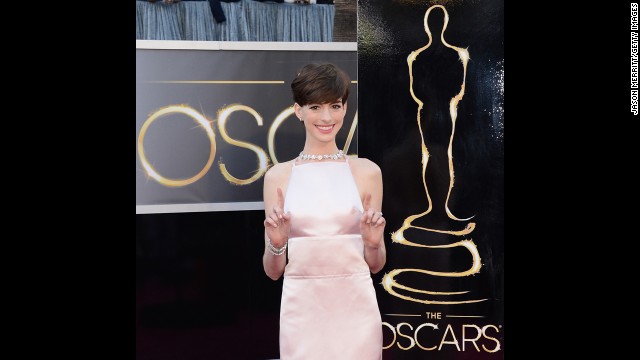 Anne Hathaway was obviously going for elegance at the 2013 Oscars, but due to some unfortunate tailoring -- or the weather, we're still not entirely sure -- she spent the evening looking like she needed a pair of pasties. Oscars: Best of the worst dresses Oscars: Best of the worst dresses Oscars: Best of the worst dresses Oscars: Best of the worst dresses Oscars: Best of the worst dresses Oscars: Best of the worst dresses Oscars: Best of the worst dresses Oscars: Best of the worst dresses Oscars: Best of the worst dresses Oscars: Best of the worst dresses Oscars: Best of the worst dresses Oscars: The worst dresses ever Oscars: The worst dresses ever Oscars: The worst dresses ever Oscars: Best of the worst dresses Oscars: Best of the worst dresses Oscars: The worst dresses ever Oscars: Best of the worst dresses Oscars: Best of the worst dresses Oscars: Best of the worst dresses Oscars: The worst dresses ever Oscars: Best of the worst dresses Oscars: Best of the worst dresses Oscars: Best of the worst dresses Oscars: Best of the worst dresses Oscars: Best of the worst dresses Oscars: Best of the worst dresses Oscars: Best of the worst dresses Oscars: Best of the worst dresses Oscars: The worst dresses ever Oscars: Best of the worst dresses Oscars: Best of the worst dresses Oscars: Best of the worst dresses Oscars: Best of the worst dresses Oscars: Best of the worst dresses HIDE CAPTION << <
Anne Hathaway was obviously going for elegance at the 2013 Oscars, but due to some unfortunate tailoring -- or the weather, we're still not entirely sure -- she spent the evening looking like she needed a pair of pasties. Oscars: Best of the worst dresses Oscars: Best of the worst dresses Oscars: Best of the worst dresses Oscars: Best of the worst dresses Oscars: Best of the worst dresses Oscars: Best of the worst dresses Oscars: Best of the worst dresses Oscars: Best of the worst dresses Oscars: Best of the worst dresses Oscars: Best of the worst dresses Oscars: Best of the worst dresses Oscars: The worst dresses ever Oscars: The worst dresses ever Oscars: The worst dresses ever Oscars: Best of the worst dresses Oscars: Best of the worst dresses Oscars: The worst dresses ever Oscars: Best of the worst dresses Oscars: Best of the worst dresses Oscars: Best of the worst dresses Oscars: The worst dresses ever Oscars: Best of the worst dresses Oscars: Best of the worst dresses Oscars: Best of the worst dresses Oscars: Best of the worst dresses Oscars: Best of the worst dresses Oscars: Best of the worst dresses Oscars: Best of the worst dresses Oscars: Best of the worst dresses Oscars: The worst dresses ever Oscars: Best of the worst dresses Oscars: Best of the worst dresses Oscars: Best of the worst dresses Oscars: Best of the worst dresses Oscars: Best of the worst dresses HIDE CAPTION << <
{ 0 comments... read them below or add one }
Post a Comment